Why Teachers Should Not Give Homework: A Closer Look

- Post author By admin
- March 25, 2024
Homework. The word itself might bring a shiver down the spine of many students, but it’s time we took a closer look at whether it’s really serving its purpose. In this blog, we’ll explore why teachers should not give homework and delve into its potential impacts on students and families.
Table of Contents

Why is homework not effective?
Homework’s effectiveness is a subject of ongoing debate among educators and researchers. Several reasons contribute to the perception that homework may not always be effective:
Lack of Individualization
Homework assignments often fail to account for students’ diverse learning styles, interests, and abilities. What works for one student may not work for another, leading to limited effectiveness in promoting understanding and retention of material.
Limited Feedback
Homework typically lacks immediate feedback, which is crucial for students to identify and correct misconceptions. Without timely guidance, students may reinforce incorrect understanding or miss opportunities for deeper learning.
Inequity in Access
Not all students have equal access to resources needed to complete homework assignments, such as textbooks, technology, or a quiet study space. This can exacerbate existing inequalities in educational outcomes.
Time Constraints
Students have various responsibilities outside of school, including extracurricular activities, family obligations, and part-time jobs. Excessive homework can encroach upon students’ time for rest, relaxation, and other important activities, leading to stress and burnout.
Rote Learning vs. Understanding
Homework assignments sometimes prioritize rote memorization over genuine understanding. This can lead to surface-level learning rather than fostering critical thinking, problem-solving, and creativity.
Diminished Intrinsic Motivation
Homework can sometimes become a chore rather than a meaningful learning experience. When assignments feel tedious or irrelevant, students may lose intrinsic motivation for learning, leading to disengagement and decreased academic performance.
Quality vs. Quantity
The effectiveness of homework depends on the quality of assignments rather than the quantity. Meaningful, purposeful tasks that reinforce classroom learning and encourage independent inquiry are more likely to yield positive outcomes than busywork or repetitive exercises.
Overall, while homework can have benefits when designed and implemented thoughtfully, its effectiveness hinges on various factors, including alignment with learning goals, consideration of students’ needs and circumstances, and opportunities for meaningful feedback and reflection.
Why Teachers Should Not Give Homework
Teachers should reconsider giving homework for several compelling reasons:
- Mental Health Impact: Homework can contribute to stress, anxiety, and even depression in students. Excessive workload and pressure to complete assignments within tight deadlines can take a toll on students’ mental well-being.
- Family Time: Homework often cuts into valuable family time, reducing opportunities for bonding, relaxation, and pursuing extracurricular activities. This can strain parent-child relationships and disrupt the balance between academic and personal life.
- Inequities in Access: Not all students have equal access to resources needed to complete homework, such as textbooks, technology, or a quiet study space. Assignments that require internet access or specialized materials can exacerbate inequalities among students.
- Limited Learning Efficacy: Research suggests that the correlation between homework and academic achievement is not always strong. Homework may promote rote memorization rather than deep understanding and critical thinking skills. In some cases, it may even hinder learning by overwhelming students or reinforcing misconceptions.
- Loss of Creativity and Play: Homework can encroach upon time that could be spent engaging in creative pursuits, hobbies, or unstructured play. These activities are essential for fostering imagination, problem-solving skills, and emotional well-being.
- Strain on Teachers: Designing, assigning, and grading homework can be time-consuming for teachers, diverting attention from other instructional activities and professional responsibilities. It can also lead to burnout and dissatisfaction among educators.
Alternative Activities That Teachers Can Assign To Students
Teachers have a plethora of alternative activities they can assign to students that promote learning, engagement, and creativity. Here are some examples:
- Independent Reading: Encourage students to select books of their choice and spend time reading for pleasure. This promotes literacy skills, expands vocabulary, and fosters a love of reading.
- Journaling: Assign reflective journal entries where students can write about their thoughts, experiences, or reactions to prompts related to the curriculum or personal interests. Journaling enhances writing skills, critical thinking, and self-awareness.
- Research Projects: Task students with researching a topic of interest or relevance to the curriculum and presenting their findings in a written report, multimedia presentation, or oral presentation. This encourages independent inquiry, information literacy, and communication skills.
- Creative Writing: Prompt students to write stories, poems, or scripts that allow them to express their imagination and creativity. Creative writing assignments develop storytelling abilities, language proficiency, and originality.
- Virtual Field Trips: Provide students with opportunities to explore museums, historical sites, or natural wonders through virtual tours or online resources. Virtual field trips offer immersive learning experiences and expose students to diverse cultures and environments.
- Art Projects: Assign art-based activities such as drawing, painting, or sculpture that relate to themes or concepts covered in class. Art projects foster creativity, fine motor skills, and visual literacy.
- STEM Challenges: Present students with STEM ( Science, Technology, Engineering, and Mathematics ) challenges or experiments that require problem-solving, critical thinking, and collaboration. STEM activities can be hands-on or virtual and engage students in real-world applications of STEM concepts.
- Debates or Discussions: Organize debates or discussions on current events, ethical dilemmas, or controversial topics relevant to the curriculum. Debates encourage research, public speaking, and persuasive argumentation skills.
- Community Service: Encourage students to participate in volunteer activities or community service projects that address local needs or global issues. Community service promotes empathy, social responsibility, and civic engagement.
- Physical Activity Challenges: Challenge students to engage in physical activities or exercise routines and track their progress over time. Physical activity promotes physical health, mental well-being, and self-discipline.
By offering a variety of alternative activities, teachers can cater to diverse learning styles and interests while fostering essential skills and knowledge acquisition outside of traditional homework assignments.
In conclusion (of why teachers should not give homework), it’s time for educators to rethink the role of homework in students’ lives. While it may have been a staple of education for decades, its potential negative impacts on students’ mental health, family life, and learning outcomes cannot be ignored.
By exploring alternative approaches to enhance learning and reduce inequities, we can create a more supportive and inclusive educational system for all. It’s time to say goodbye to homework as we know it and usher in a new era of learning.
- australia (2)
- duolingo (13)
- Education (284)
- General (77)
- How To (18)
- IELTS (127)
- Latest Updates (162)
- Malta Visa (6)
- Permanent residency (1)
- Programming (31)
- Scholarship (1)
- Sponsored (4)
- Study Abroad (187)
- Technology (12)
- work permit (8)
Recent Posts

- Share full article
Advertisement
Supported by
Student Opinion
Should We Get Rid of Homework?
Some educators are pushing to get rid of homework. Would that be a good thing?

By Jeremy Engle and Michael Gonchar
Do you like doing homework? Do you think it has benefited you educationally?
Has homework ever helped you practice a difficult skill — in math, for example — until you mastered it? Has it helped you learn new concepts in history or science? Has it helped to teach you life skills, such as independence and responsibility? Or, have you had a more negative experience with homework? Does it stress you out, numb your brain from busywork or actually make you fall behind in your classes?
Should we get rid of homework?
In “ The Movement to End Homework Is Wrong, ” published in July, the Times Opinion writer Jay Caspian Kang argues that homework may be imperfect, but it still serves an important purpose in school. The essay begins:
Do students really need to do their homework? As a parent and a former teacher, I have been pondering this question for quite a long time. The teacher side of me can acknowledge that there were assignments I gave out to my students that probably had little to no academic value. But I also imagine that some of my students never would have done their basic reading if they hadn’t been trained to complete expected assignments, which would have made the task of teaching an English class nearly impossible. As a parent, I would rather my daughter not get stuck doing the sort of pointless homework I would occasionally assign, but I also think there’s a lot of value in saying, “Hey, a lot of work you’re going to end up doing in your life is pointless, so why not just get used to it?” I certainly am not the only person wondering about the value of homework. Recently, the sociologist Jessica McCrory Calarco and the mathematics education scholars Ilana Horn and Grace Chen published a paper, “ You Need to Be More Responsible: The Myth of Meritocracy and Teachers’ Accounts of Homework Inequalities .” They argued that while there’s some evidence that homework might help students learn, it also exacerbates inequalities and reinforces what they call the “meritocratic” narrative that says kids who do well in school do so because of “individual competence, effort and responsibility.” The authors believe this meritocratic narrative is a myth and that homework — math homework in particular — further entrenches the myth in the minds of teachers and their students. Calarco, Horn and Chen write, “Research has highlighted inequalities in students’ homework production and linked those inequalities to differences in students’ home lives and in the support students’ families can provide.”
Mr. Kang argues:
But there’s a defense of homework that doesn’t really have much to do with class mobility, equality or any sense of reinforcing the notion of meritocracy. It’s one that became quite clear to me when I was a teacher: Kids need to learn how to practice things. Homework, in many cases, is the only ritualized thing they have to do every day. Even if we could perfectly equalize opportunity in school and empower all students not to be encumbered by the weight of their socioeconomic status or ethnicity, I’m not sure what good it would do if the kids didn’t know how to do something relentlessly, over and over again, until they perfected it. Most teachers know that type of progress is very difficult to achieve inside the classroom, regardless of a student’s background, which is why, I imagine, Calarco, Horn and Chen found that most teachers weren’t thinking in a structural inequalities frame. Holistic ideas of education, in which learning is emphasized and students can explore concepts and ideas, are largely for the types of kids who don’t need to worry about class mobility. A defense of rote practice through homework might seem revanchist at this moment, but if we truly believe that schools should teach children lessons that fall outside the meritocracy, I can’t think of one that matters more than the simple satisfaction of mastering something that you were once bad at. That takes homework and the acknowledgment that sometimes a student can get a question wrong and, with proper instruction, eventually get it right.
We are having trouble retrieving the article content.
Please enable JavaScript in your browser settings.
Thank you for your patience while we verify access. If you are in Reader mode please exit and log into your Times account, or subscribe for all of The Times.
Thank you for your patience while we verify access.
Already a subscriber? Log in .
Want all of The Times? Subscribe .
Why I Think All Schools Should Abolish Homework

H ow long is your child’s workweek? Thirty hours? Forty? Would it surprise you to learn that some elementary school kids have workweeks comparable to adults’ schedules? For most children, mandatory homework assignments push their workweek far beyond the school day and deep into what any other laborers would consider overtime. Even without sports or music or other school-sponsored extracurriculars, the daily homework slog keeps many students on the clock as long as lawyers, teachers, medical residents, truck drivers and other overworked adults. Is it any wonder that,deprived of the labor protections that we provide adults, our kids are suffering an epidemic of disengagement, anxiety and depression ?
With my youngest child just months away from finishing high school, I’m remembering all the needless misery and missed opportunities all three of my kids suffered because of their endless assignments. When my daughters were in middle school, I would urge them into bed before midnight and then find them clandestinely studying under the covers with a flashlight. We cut back on their activities but still found ourselves stuck in a system on overdrive, returning home from hectic days at 6 p.m. only to face hours more of homework. Now, even as a senior with a moderate course load, my son, Zak, has spent many weekends studying, finding little time for the exercise and fresh air essential to his well-being. Week after week, and without any extracurriculars, Zak logs a lot more than the 40 hours adults traditionally work each week — and with no recognition from his “bosses” that it’s too much. I can’t count the number of shared evenings, weekend outings and dinners that our family has missed and will never get back.
How much after-school time should our schools really own?
In the midst of the madness last fall, Zak said to me, “I feel like I’m working towards my death. The constant demands on my time since 5th grade are just going to continue through graduation, into college, and then into my job. It’s like I’m on an endless treadmill with no time for living.”
My spirit crumbled along with his.
Like Zak, many people are now questioning the point of putting so much demand on children and teens that they become thinly stretched and overworked. Studies have long shown that there is no academic benefit to high school homework that consumes more than a modest number of hours each week. In a study of high schoolers conducted by the Organization for Economic Cooperation and Development (OECD), researchers concluded that “after around four hours of homework per week, the additional time invested in homework has a negligible impact on performance.”
In elementary school, where we often assign overtime even to the youngest children, studies have shown there’s no academic benefit to any amount of homework at all.
Our unquestioned acceptance of homework also flies in the face of all we know about human health, brain function and learning. Brain scientists know that rest and exercise are essential to good health and real learning . Even top adult professionals in specialized fields take care to limit their work to concentrated periods of focus. A landmark study of how humans develop expertise found that elite musicians, scientists and athletes do their most productive work only about four hours per day .
Yet we continue to overwork our children, depriving them of the chance to cultivate health and learn deeply, burdening them with an imbalance of sedentary, academic tasks. American high school students , in fact, do more homework each week than their peers in the average country in the OECD, a 2014 report found.
It’s time for an uprising.
Already, small rebellions are starting. High schools in Ridgewood, N.J. , and Fairfax County, Va., among others, have banned homework over school breaks. The entire second grade at Taylor Elementary School in Arlington, Va., abolished homework this academic year. Burton Valley Elementary School in Lafayette, Calif., has eliminated homework in grades K through 4. Henry West Laboratory School , a public K-8 school in Coral Gables, Fla., eliminated mandatory, graded homework for optional assignments. One Lexington, Mass., elementary school is piloting a homework-free year, replacing it with reading for pleasure.
More from TIME
Across the Atlantic, students in Spain launched a national strike against excessive assignments in November. And a second-grade teacher in Texas, made headlines this fall when she quit sending home extra work , instead urging families to “spend your evenings doing things that are proven to correlate with student success. Eat dinner as a family, read together, play outside and get your child to bed early.”
It is time that we call loudly for a clear and simple change: a workweek limit for children, counting time on the clock before and after the final bell. Why should schools extend their authority far beyond the boundaries of campus, dictating activities in our homes in the hours that belong to families? An all-out ban on after-school assignments would be optimal. Short of that, we can at least sensibly agree on a cap limiting kids to a 40-hour workweek — and fewer hours for younger children.
Resistance even to this reasonable limit will be rife. Mike Miller, an English teacher at Thomas Jefferson High School for Science and Technology in Alexandria, Va., found this out firsthand when he spearheaded a homework committee to rethink the usual approach. He had read the education research and found a forgotten policy on the county books limiting homework to two hours a night, total, including all classes. “I thought it would be a slam dunk” to put the two-hour cap firmly in place, Miller said.
But immediately, people started balking. “There was a lot of fear in the community,” Miller said. “It’s like jumping off a high dive with your kids’ future. If we reduce homework to two hours or less, is my kid really going to be okay?” In the end, the committee only agreed to a homework ban over school breaks.
Miller’s response is a great model for us all. He decided to limit assignments in his own class to 20 minutes a night (the most allowed for a student with six classes to hit the two-hour max). His students didn’t suddenly fail. Their test scores remained stable. And they started using their more breathable schedule to do more creative, thoughtful work.
That’s the way we will get to a sane work schedule for kids: by simultaneously pursuing changes big and small. Even as we collaboratively press for policy changes at the district or individual school level, all teachers can act now, as individuals, to ease the strain on overworked kids.
As parents and students, we can also organize to make homework the exception rather than the rule. We can insist that every family, teacher and student be allowed to opt out of assignments without penalty to make room for important activities, and we can seek changes that shift practice exercises and assignments into the actual school day.
We’ll know our work is done only when Zak and every other child can clock out, eat dinner, sleep well and stay healthy — the very things needed to engage and learn deeply. That’s the basic standard the law applies to working adults. Let’s do the same for our kids.
Vicki Abeles is the author of the bestseller Beyond Measure: Rescuing an Overscheduled, Overtested, Underestimated Generation, and director and producer of the documentaries “ Race to Nowhere ” and “ Beyond Measure. ”
More Must-Reads from TIME
- Welcome to the Golden Age of Scams
- Introducing TIME's 2024 Latino Leaders
- How to Make an Argument That’s Actually Persuasive
- Did the Pandemic Break Our Brains?
- 33 True Crime Documentaries That Shaped the Genre
- The Ordained Rabbi Who Bought a Porn Company
- Why Gut Health Issues Are More Common in Women
- The 100 Most Influential People in AI 2024
Contact us at [email protected]
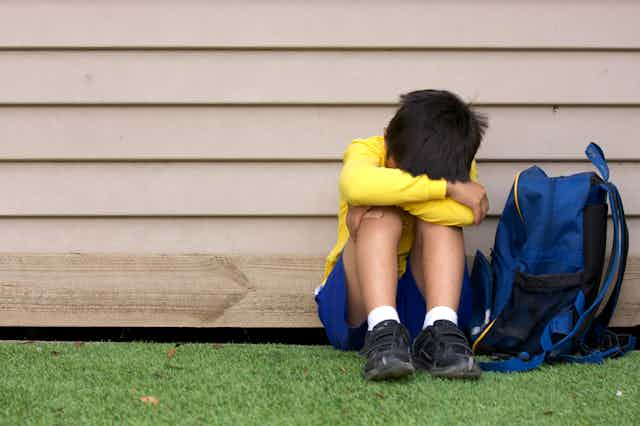
‘There’s only so far I can take them’ – why teachers give up on struggling students who don’t do their homework
Assistant Professor of Sociology, Indiana University
Professor of Mathematics Education, Vanderbilt University
Disclosure statement
Jessica Calarco has received funding from the Institute of Education Sciences, U.S. Department of Education, through Grant R305C050041-05 to the University of Pennsylvania and from the Networks, Complex Systems & Health Project Development Team within the ICTSI NIH/NCRR Grant Number UL1TR001108. She is a member of the Board of Directors of the Council on Contemporary Families.
Ilana Horn currently receives funding from the National Science Foundation. In the past, her work has been funded by the Spencer Foundation, the Carnegie Foundation, the Washington State Office of the Superintendent of Public Instruction, the Mindset Scholars Network, and the American Educational Research Association.
Vanderbilt University provides funding as a founding partner of The Conversation US.
Indiana University provides funding as a member of The Conversation US.
View all partners
Whenever “Gina,” a fifth grader at a suburban public school on the East Coast, did her math homework, she never had to worry about whether she could get help from her mom.
“I help her a lot with homework,” Gina’s mother, a married, mid-level manager for a health care company, explained to us during an interview for a study we did about how teachers view students who complete their homework versus those who do not.
“I try to maybe re-explain things, like, things she might not understand,” Gina’s mom continued. “Like, if she’s struggling, I try to teach her a different way. I understand that Gina is a very visual child but also needs to hear things, too. I know that when I’m reading it, and I’m writing it, and I’m saying it to her, she comprehends it better.”
One of us is a sociologist who looks at how schools favor middle-class families . The other is a math education professor who examines how math teachers perceive their students based on their work.
We were curious about how teachers reward students who complete their homework and penalize and criticize those who don’t – and whether there was any link between those things and family income.
By analyzing student report cards and interviewing teachers, students and parents, we found that teachers gave good grades for homework effort and other rewards to students from middle-class families like Gina, who happen to have college-educated parents who take an active role in helping their children complete their homework.
But when it comes to students such as “Jesse,” who attends the same school as Gina and is the child of a poor, single mother of two, we found that teachers had a more bleak outlook.
The names “Jesse” and “Gina” are pseudonyms to protect the children’s identities. Jesse can’t count on his mom to help with his homework because she struggled in school herself.
“I had many difficulties in school,” Jesse’s mom told us for the same study. “I had behavior issues, attention-deficit. And so after seventh grade, they sent me to an alternative high school, which I thought was the worst thing in the world. We literally did, like, first and second grade work. So my education was horrible.”
Jesse’s mother admitted she still can’t figure out division to this day.
“[My son will] ask me a question, and I’ll go look at it and it’s like algebra, in fifth grade. And I’m like: ‘What’s this?’” Jesse’s mom said. “So it’s really hard. Sometimes you just feel stupid. Because he’s in fifth grade. And I’m like, I should be able to help my son with his homework in fifth grade.”
Unlike Gina’s parents, who are married and own their own home in a middle-class neighborhood, Jesse’s mom isn’t married and rents a place in a mobile home community. She had Jesse when she was a teenager and was raising Jesse and his brother mostly on her own, though with some help from her parents. Her son is eligible for free lunch.
An issue of equity
As a matter of fairness, we think teachers should take these kinds of economic and social disparities into account in how they teach and grade students. But what we found in the schools we observed is that they usually don’t, and instead they seemed to accept inequality as destiny. Consider, for instance, what a fourth grade teacher – one of 22 teachers we interviewed and observed during the study – told us about students and homework.
“I feel like there’s a pocket here – a lower income pocket,” one teacher said. “And that trickles down to less support at home, homework not being done, stuff not being returned and signed. It should be almost 50-50 between home and school. If they don’t have the support at home, there’s only so far I can take them. If they’re not going to go home and do their homework, there’s just not much I can do.”
While educators recognize the different levels of resources that students have at home, they continue to assign homework that is too difficult for students to complete independently, and reward students who complete the homework anyway.

Consider, for example, how one seventh grade teacher described his approach to homework: “I post the answers to the homework for every course online. The kids do the homework, and they’re supposed to check it and figure out if they need extra help. The kids who do that, there is an amazing correlation between that and positive grades. The kids who don’t do that are bombing.
"I need to drill that to parents that they need to check homework with their student, get it checked to see if it’s right or wrong and then ask me questions. I don’t want to use class time to go over homework.”
The problem is that the benefits of homework are not uniformly distributed. Rather, research shows that students from high-income families make bigger achievement gains through homework than students from low-income families.
This relationship has been found in both U.S. and Dutch schools , and it suggests that homework may contribute to disparities in students’ performance in school.
Tougher struggles
On top of uneven academic benefits, research also reveals that making sense of the math homework assigned in U.S schools is often more difficult for parents who have limited educational attainment , parents who feel anxious over mathematical content . It is also difficult for parents who learned math using different approaches than those currently taught in the U.S. .
Meanwhile, students from more-privileged families are disproportionately more likely to have a parent or a tutor available after school to help with homework, as well as parents who encourage them to seek help from their teachers if they have questions . And they are also more likely to have parents who feel entitled to intervene at school on their behalf.
False ideas about merit
In the schools we observed, teachers interpreted homework inequalities through what social scientists call the myth of meritocracy . The myth suggests that all students in the U.S. have the same opportunities to succeed in school and that any differences in students’ outcomes are the result of different levels of effort. Teachers in our study said things that are in line with this belief.
For instance, one third grade teacher told us: “We’re dealing with some really struggling kids. There are parents that I’ve never even met. They don’t come to conferences. There’s been no communication whatsoever. … I’ll write notes home or emails; they never respond. There are kids who never do their homework, and clearly the parents are OK with that.
"When you don’t have that support from home, what can you do? They can’t study by themselves. So if they don’t have parents that are going to help them out with that, then that’s tough on them, and it shows.”
- Mathematics
- K-12 education
- Math skills
- Math scores
- Higher ed attainment
Lecturer / Senior Lecturer in Construction and Project Management

Lecturer in Strategy Innovation and Entrepreneurship (Education Focused) (Identified)

Research Fellow in Dynamic Energy and Mass Budget Modelling

Communications Director

University Relations Manager
Homework – Top 3 Pros and Cons
Pro/Con Arguments | Discussion Questions | Take Action | Sources | More Debates

From dioramas to book reports, from algebraic word problems to research projects, whether students should be given homework, as well as the type and amount of homework, has been debated for over a century. [ 1 ]
While we are unsure who invented homework, we do know that the word “homework” dates back to ancient Rome. Pliny the Younger asked his followers to practice their speeches at home. Memorization exercises as homework continued through the Middle Ages and Enlightenment by monks and other scholars. [ 45 ]
In the 19th century, German students of the Volksschulen or “People’s Schools” were given assignments to complete outside of the school day. This concept of homework quickly spread across Europe and was brought to the United States by Horace Mann , who encountered the idea in Prussia. [ 45 ]
In the early 1900s, progressive education theorists, championed by the magazine Ladies’ Home Journal , decried homework’s negative impact on children’s physical and mental health, leading California to ban homework for students under 15 from 1901 until 1917. In the 1930s, homework was portrayed as child labor, which was newly illegal, but the prevailing argument was that kids needed time to do household chores. [ 1 ] [ 2 ] [ 45 ] [ 46 ]
Public opinion swayed again in favor of homework in the 1950s due to concerns about keeping up with the Soviet Union’s technological advances during the Cold War . And, in 1986, the US government included homework as an educational quality boosting tool. [ 3 ] [ 45 ]
A 2014 study found kindergarteners to fifth graders averaged 2.9 hours of homework per week, sixth to eighth graders 3.2 hours per teacher, and ninth to twelfth graders 3.5 hours per teacher. A 2014-2019 study found that teens spent about an hour a day on homework. [ 4 ] [ 44 ]
Beginning in 2020, the COVID-19 pandemic complicated the very idea of homework as students were schooling remotely and many were doing all school work from home. Washington Post journalist Valerie Strauss asked, “Does homework work when kids are learning all day at home?” While students were mostly back in school buildings in fall 2021, the question remains of how effective homework is as an educational tool. [ 47 ]
Is Homework Beneficial?
Pro 1 Homework improves student achievement. Studies have shown that homework improved student achievement in terms of improved grades, test results, and the likelihood to attend college. Research published in the High School Journal indicated that students who spent between 31 and 90 minutes each day on homework “scored about 40 points higher on the SAT-Mathematics subtest than their peers, who reported spending no time on homework each day, on average.” [ 6 ] Students in classes that were assigned homework outperformed 69% of students who didn’t have homework on both standardized tests and grades. A majority of studies on homework’s impact – 64% in one meta-study and 72% in another – showed that take-home assignments were effective at improving academic achievement. [ 7 ] [ 8 ] Research by the Institute for the Study of Labor (IZA) concluded that increased homework led to better GPAs and higher probability of college attendance for high school boys. In fact, boys who attended college did more than three hours of additional homework per week in high school. [ 10 ] Read More
Pro 2 Homework helps to reinforce classroom learning, while developing good study habits and life skills. Students typically retain only 50% of the information teachers provide in class, and they need to apply that information in order to truly learn it. Abby Freireich and Brian Platzer, co-founders of Teachers Who Tutor NYC, explained, “at-home assignments help students learn the material taught in class. Students require independent practice to internalize new concepts… [And] these assignments can provide valuable data for teachers about how well students understand the curriculum.” [ 11 ] [ 49 ] Elementary school students who were taught “strategies to organize and complete homework,” such as prioritizing homework activities, collecting study materials, note-taking, and following directions, showed increased grades and more positive comments on report cards. [ 17 ] Research by the City University of New York noted that “students who engage in self-regulatory processes while completing homework,” such as goal-setting, time management, and remaining focused, “are generally more motivated and are higher achievers than those who do not use these processes.” [ 18 ] Homework also helps students develop key skills that they’ll use throughout their lives: accountability, autonomy, discipline, time management, self-direction, critical thinking, and independent problem-solving. Freireich and Platzer noted that “homework helps students acquire the skills needed to plan, organize, and complete their work.” [ 12 ] [ 13 ] [ 14 ] [ 15 ] [ 49 ] Read More
Pro 3 Homework allows parents to be involved with children’s learning. Thanks to take-home assignments, parents are able to track what their children are learning at school as well as their academic strengths and weaknesses. [ 12 ] Data from a nationwide sample of elementary school students show that parental involvement in homework can improve class performance, especially among economically disadvantaged African-American and Hispanic students. [ 20 ] Research from Johns Hopkins University found that an interactive homework process known as TIPS (Teachers Involve Parents in Schoolwork) improves student achievement: “Students in the TIPS group earned significantly higher report card grades after 18 weeks (1 TIPS assignment per week) than did non-TIPS students.” [ 21 ] Homework can also help clue parents in to the existence of any learning disabilities their children may have, allowing them to get help and adjust learning strategies as needed. Duke University Professor Harris Cooper noted, “Two parents once told me they refused to believe their child had a learning disability until homework revealed it to them.” [ 12 ] Read More
Con 1 Too much homework can be harmful. A poll of California high school students found that 59% thought they had too much homework. 82% of respondents said that they were “often or always stressed by schoolwork.” High-achieving high school students said too much homework leads to sleep deprivation and other health problems such as headaches, exhaustion, weight loss, and stomach problems. [ 24 ] [ 28 ] [ 29 ] Alfie Kohn, an education and parenting expert, said, “Kids should have a chance to just be kids… it’s absurd to insist that children must be engaged in constructive activities right up until their heads hit the pillow.” [ 27 ] Emmy Kang, a mental health counselor, explained, “More than half of students say that homework is their primary source of stress, and we know what stress can do on our bodies.” [ 48 ] Excessive homework can also lead to cheating: 90% of middle school students and 67% of high school students admit to copying someone else’s homework, and 43% of college students engaged in “unauthorized collaboration” on out-of-class assignments. Even parents take shortcuts on homework: 43% of those surveyed admitted to having completed a child’s assignment for them. [ 30 ] [ 31 ] [ 32 ] Read More
Con 2 Homework exacerbates the digital divide or homework gap. Kiara Taylor, financial expert, defined the digital divide as “the gap between demographics and regions that have access to modern information and communications technology and those that don’t. Though the term now encompasses the technical and financial ability to utilize available technology—along with access (or a lack of access) to the Internet—the gap it refers to is constantly shifting with the development of technology.” For students, this is often called the homework gap. [ 50 ] [ 51 ] 30% (about 15 to 16 million) public school students either did not have an adequate internet connection or an appropriate device, or both, for distance learning. Completing homework for these students is more complicated (having to find a safe place with an internet connection, or borrowing a laptop, for example) or impossible. [ 51 ] A Hispanic Heritage Foundation study found that 96.5% of students across the country needed to use the internet for homework, and nearly half reported they were sometimes unable to complete their homework due to lack of access to the internet or a computer, which often resulted in lower grades. [ 37 ] [ 38 ] One study concluded that homework increases social inequality because it “potentially serves as a mechanism to further advantage those students who already experience some privilege in the school system while further disadvantaging those who may already be in a marginalized position.” [ 39 ] Read More
Con 3 Homework does not help younger students, and may not help high school students. We’ve known for a while that homework does not help elementary students. A 2006 study found that “homework had no association with achievement gains” when measured by standardized tests results or grades. [ 7 ] Fourth grade students who did no homework got roughly the same score on the National Assessment of Educational Progress (NAEP) math exam as those who did 30 minutes of homework a night. Students who did 45 minutes or more of homework a night actually did worse. [ 41 ] Temple University professor Kathryn Hirsh-Pasek said that homework is not the most effective tool for young learners to apply new information: “They’re learning way more important skills when they’re not doing their homework.” [ 42 ] In fact, homework may not be helpful at the high school level either. Alfie Kohn, author of The Homework Myth, stated, “I interviewed high school teachers who completely stopped giving homework and there was no downside, it was all upside.” He explains, “just because the same kids who get more homework do a little better on tests, doesn’t mean the homework made that happen.” [ 52 ] Read More
Discussion Questions
1. Is homework beneficial? Consider the study data, your personal experience, and other types of information. Explain your answer(s).
2. If homework were banned, what other educational strategies would help students learn classroom material? Explain your answer(s).
3. How has homework been helpful to you personally? How has homework been unhelpful to you personally? Make carefully considered lists for both sides.
Take Action
1. Examine an argument in favor of quality homework assignments from Janine Bempechat.
2. Explore Oxford Learning’s infographic on the effects of homework on students.
3. Consider Joseph Lathan’s argument that homework promotes inequality .
4. Consider how you felt about the issue before reading this article. After reading the pros and cons on this topic, has your thinking changed? If so, how? List two to three ways. If your thoughts have not changed, list two to three ways your better understanding of the “other side of the issue” now helps you better argue your position.
5. Push for the position and policies you support by writing US national senators and representatives .
| 1. | Tom Loveless, “Homework in America: Part II of the 2014 Brown Center Report of American Education,” brookings.edu, Mar. 18, 2014 | |
| 2. | Edward Bok, “A National Crime at the Feet of American Parents,” , Jan. 1900 | |
| 3. | Tim Walker, “The Great Homework Debate: What’s Getting Lost in the Hype,” neatoday.org, Sep. 23, 2015 | |
| 4. | University of Phoenix College of Education, “Homework Anxiety: Survey Reveals How Much Homework K-12 Students Are Assigned and Why Teachers Deem It Beneficial,” phoenix.edu, Feb. 24, 2014 | |
| 5. | Organization for Economic Cooperation and Development (OECD), “PISA in Focus No. 46: Does Homework Perpetuate Inequities in Education?,” oecd.org, Dec. 2014 | |
| 6. | Adam V. Maltese, Robert H. Tai, and Xitao Fan, “When is Homework Worth the Time?: Evaluating the Association between Homework and Achievement in High School Science and Math,” , 2012 | |
| 7. | Harris Cooper, Jorgianne Civey Robinson, and Erika A. Patall, “Does Homework Improve Academic Achievement? A Synthesis of Researcher, 1987-2003,” , 2006 | |
| 8. | Gökhan Bas, Cihad Sentürk, and Fatih Mehmet Cigerci, “Homework and Academic Achievement: A Meta-Analytic Review of Research,” , 2017 | |
| 9. | Huiyong Fan, Jianzhong Xu, Zhihui Cai, Jinbo He, and Xitao Fan, “Homework and Students’ Achievement in Math and Science: A 30-Year Meta-Analysis, 1986-2015,” , 2017 | |
| 10. | Charlene Marie Kalenkoski and Sabrina Wulff Pabilonia, “Does High School Homework Increase Academic Achievement?,” iza.og, Apr. 2014 | |
| 11. | Ron Kurtus, “Purpose of Homework,” school-for-champions.com, July 8, 2012 | |
| 12. | Harris Cooper, “Yes, Teachers Should Give Homework – The Benefits Are Many,” newsobserver.com, Sep. 2, 2016 | |
| 13. | Tammi A. Minke, “Types of Homework and Their Effect on Student Achievement,” repository.stcloudstate.edu, 2017 | |
| 14. | LakkshyaEducation.com, “How Does Homework Help Students: Suggestions From Experts,” LakkshyaEducation.com (accessed Aug. 29, 2018) | |
| 15. | University of Montreal, “Do Kids Benefit from Homework?,” teaching.monster.com (accessed Aug. 30, 2018) | |
| 16. | Glenda Faye Pryor-Johnson, “Why Homework Is Actually Good for Kids,” memphisparent.com, Feb. 1, 2012 | |
| 17. | Joan M. Shepard, “Developing Responsibility for Completing and Handing in Daily Homework Assignments for Students in Grades Three, Four, and Five,” eric.ed.gov, 1999 | |
| 18. | Darshanand Ramdass and Barry J. Zimmerman, “Developing Self-Regulation Skills: The Important Role of Homework,” , 2011 | |
| 19. | US Department of Education, “Let’s Do Homework!,” ed.gov (accessed Aug. 29, 2018) | |
| 20. | Loretta Waldman, “Sociologist Upends Notions about Parental Help with Homework,” phys.org, Apr. 12, 2014 | |
| 21. | Frances L. Van Voorhis, “Reflecting on the Homework Ritual: Assignments and Designs,” , June 2010 | |
| 22. | Roel J. F. J. Aries and Sofie J. Cabus, “Parental Homework Involvement Improves Test Scores? A Review of the Literature,” , June 2015 | |
| 23. | Jamie Ballard, “40% of People Say Elementary School Students Have Too Much Homework,” yougov.com, July 31, 2018 | |
| 24. | Stanford University, “Stanford Survey of Adolescent School Experiences Report: Mira Costa High School, Winter 2017,” stanford.edu, 2017 | |
| 25. | Cathy Vatterott, “Rethinking Homework: Best Practices That Support Diverse Needs,” ascd.org, 2009 | |
| 26. | End the Race, “Homework: You Can Make a Difference,” racetonowhere.com (accessed Aug. 24, 2018) | |
| 27. | Elissa Strauss, “Opinion: Your Kid Is Right, Homework Is Pointless. Here’s What You Should Do Instead.,” cnn.com, Jan. 28, 2020 | |
| 28. | Jeanne Fratello, “Survey: Homework Is Biggest Source of Stress for Mira Costa Students,” digmb.com, Dec. 15, 2017 | |
| 29. | Clifton B. Parker, “Stanford Research Shows Pitfalls of Homework,” stanford.edu, Mar. 10, 2014 | |
| 30. | AdCouncil, “Cheating Is a Personal Foul: Academic Cheating Background,” glass-castle.com (accessed Aug. 16, 2018) | |
| 31. | Jeffrey R. Young, “High-Tech Cheating Abounds, and Professors Bear Some Blame,” chronicle.com, Mar. 28, 2010 | |
| 32. | Robin McClure, “Do You Do Your Child’s Homework?,” verywellfamily.com, Mar. 14, 2018 | |
| 33. | Robert M. Pressman, David B. Sugarman, Melissa L. Nemon, Jennifer, Desjarlais, Judith A. Owens, and Allison Schettini-Evans, “Homework and Family Stress: With Consideration of Parents’ Self Confidence, Educational Level, and Cultural Background,” , 2015 | |
| 34. | Heather Koball and Yang Jiang, “Basic Facts about Low-Income Children,” nccp.org, Jan. 2018 | |
| 35. | Meagan McGovern, “Homework Is for Rich Kids,” huffingtonpost.com, Sep. 2, 2016 | |
| 36. | H. Richard Milner IV, “Not All Students Have Access to Homework Help,” nytimes.com, Nov. 13, 2014 | |
| 37. | Claire McLaughlin, “The Homework Gap: The ‘Cruelest Part of the Digital Divide’,” neatoday.org, Apr. 20, 2016 | |
| 38. | Doug Levin, “This Evening’s Homework Requires the Use of the Internet,” edtechstrategies.com, May 1, 2015 | |
| 39. | Amy Lutz and Lakshmi Jayaram, “Getting the Homework Done: Social Class and Parents’ Relationship to Homework,” , June 2015 | |
| 40. | Sandra L. Hofferth and John F. Sandberg, “How American Children Spend Their Time,” psc.isr.umich.edu, Apr. 17, 2000 | |
| 41. | Alfie Kohn, “Does Homework Improve Learning?,” alfiekohn.org, 2006 | |
| 42. | Patrick A. Coleman, “Elementary School Homework Probably Isn’t Good for Kids,” fatherly.com, Feb. 8, 2018 | |
| 43. | Valerie Strauss, “Why This Superintendent Is Banning Homework – and Asking Kids to Read Instead,” washingtonpost.com, July 17, 2017 | |
| 44. | Pew Research Center, “The Way U.S. Teens Spend Their Time Is Changing, but Differences between Boys and Girls Persist,” pewresearch.org, Feb. 20, 2019 | |
| 45. | ThroughEducation, “The History of Homework: Why Was It Invented and Who Was behind It?,” , Feb. 14, 2020 | |
| 46. | History, “Why Homework Was Banned,” (accessed Feb. 24, 2022) | |
| 47. | Valerie Strauss, “Does Homework Work When Kids Are Learning All Day at Home?,” , Sep. 2, 2020 | |
| 48. | Sara M Moniuszko, “Is It Time to Get Rid of Homework? Mental Health Experts Weigh In,” , Aug. 17, 2021 | |
| 49. | Abby Freireich and Brian Platzer, “The Worsening Homework Problem,” , Apr. 13, 2021 | |
| 50. | Kiara Taylor, “Digital Divide,” , Feb. 12, 2022 | |
| 51. | Marguerite Reardon, “The Digital Divide Has Left Millions of School Kids Behind,” , May 5, 2021 | |
| 52. | Rachel Paula Abrahamson, “Why More and More Teachers Are Joining the Anti-Homework Movement,” , Sep. 10, 2021 |
More School Debate Topics
Should K-12 Students Dissect Animals in Science Classrooms? – Proponents say dissecting real animals is a better learning experience. Opponents say the practice is bad for the environment.
Should Students Have to Wear School Uniforms? – Proponents say uniforms may increase student safety. Opponents say uniforms restrict expression.
Should Corporal Punishment Be Used in K-12 Schools? – Proponents say corporal punishment is an appropriate discipline. Opponents say it inflicts long-lasting physical and mental harm on students.
ProCon/Encyclopaedia Britannica, Inc. 325 N. LaSalle Street, Suite 200 Chicago, Illinois 60654 USA
Natalie Leppard Managing Editor [email protected]
© 2023 Encyclopaedia Britannica, Inc. All rights reserved
- Social Media
- Death Penalty
- School Uniforms
- Video Games
- Animal Testing
- Gun Control
- Banned Books
- Teachers’ Corner
Cite This Page
ProCon.org is the institutional or organization author for all ProCon.org pages. Proper citation depends on your preferred or required style manual. Below are the proper citations for this page according to four style manuals (in alphabetical order): the Modern Language Association Style Manual (MLA), the Chicago Manual of Style (Chicago), the Publication Manual of the American Psychological Association (APA), and Kate Turabian's A Manual for Writers of Term Papers, Theses, and Dissertations (Turabian). Here are the proper bibliographic citations for this page according to four style manuals (in alphabetical order):
[Editor's Note: The APA citation style requires double spacing within entries.]
[Editor’s Note: The MLA citation style requires double spacing within entries.]
- About the Hub
- Announcements
- Faculty Experts Guide
- Subscribe to the newsletter
Explore by Topic
- Arts+Culture
- Politics+Society
- Science+Technology
- Student Life
- University News
- Voices+Opinion
- About Hub at Work
- Gazette Archive
- Benefits+Perks
- Health+Well-Being
- Current Issue
- About the Magazine
- Past Issues
- Support Johns Hopkins Magazine
- Subscribe to the Magazine
You are using an outdated browser. Please upgrade your browser to improve your experience.

Credit: August de Richelieu
Does homework still have value? A Johns Hopkins education expert weighs in
Joyce epstein, co-director of the center on school, family, and community partnerships, discusses why homework is essential, how to maximize its benefit to learners, and what the 'no-homework' approach gets wrong.
By Vicky Hallett
The necessity of homework has been a subject of debate since at least as far back as the 1890s, according to Joyce L. Epstein , co-director of the Center on School, Family, and Community Partnerships at Johns Hopkins University. "It's always been the case that parents, kids—and sometimes teachers, too—wonder if this is just busy work," Epstein says.
But after decades of researching how to improve schools, the professor in the Johns Hopkins School of Education remains certain that homework is essential—as long as the teachers have done their homework, too. The National Network of Partnership Schools , which she founded in 1995 to advise schools and districts on ways to improve comprehensive programs of family engagement, has developed hundreds of improved homework ideas through its Teachers Involve Parents in Schoolwork program. For an English class, a student might interview a parent on popular hairstyles from their youth and write about the differences between then and now. Or for science class, a family could identify forms of matter over the dinner table, labeling foods as liquids or solids. These innovative and interactive assignments not only reinforce concepts from the classroom but also foster creativity, spark discussions, and boost student motivation.
"We're not trying to eliminate homework procedures, but expand and enrich them," says Epstein, who is packing this research into a forthcoming book on the purposes and designs of homework. In the meantime, the Hub couldn't wait to ask her some questions:
What kind of homework training do teachers typically get?
Future teachers and administrators really have little formal training on how to design homework before they assign it. This means that most just repeat what their teachers did, or they follow textbook suggestions at the end of units. For example, future teachers are well prepared to teach reading and literacy skills at each grade level, and they continue to learn to improve their teaching of reading in ongoing in-service education. By contrast, most receive little or no training on the purposes and designs of homework in reading or other subjects. It is really important for future teachers to receive systematic training to understand that they have the power, opportunity, and obligation to design homework with a purpose.
Why do students need more interactive homework?
If homework assignments are always the same—10 math problems, six sentences with spelling words—homework can get boring and some kids just stop doing their assignments, especially in the middle and high school years. When we've asked teachers what's the best homework you've ever had or designed, invariably we hear examples of talking with a parent or grandparent or peer to share ideas. To be clear, parents should never be asked to "teach" seventh grade science or any other subject. Rather, teachers set up the homework assignments so that the student is in charge. It's always the student's homework. But a good activity can engage parents in a fun, collaborative way. Our data show that with "good" assignments, more kids finish their work, more kids interact with a family partner, and more parents say, "I learned what's happening in the curriculum." It all works around what the youngsters are learning.
Is family engagement really that important?
At Hopkins, I am part of the Center for Social Organization of Schools , a research center that studies how to improve many aspects of education to help all students do their best in school. One thing my colleagues and I realized was that we needed to look deeply into family and community engagement. There were so few references to this topic when we started that we had to build the field of study. When children go to school, their families "attend" with them whether a teacher can "see" the parents or not. So, family engagement is ever-present in the life of a school.
My daughter's elementary school doesn't assign homework until third grade. What's your take on "no homework" policies?
There are some parents, writers, and commentators who have argued against homework, especially for very young children. They suggest that children should have time to play after school. This, of course is true, but many kindergarten kids are excited to have homework like their older siblings. If they give homework, most teachers of young children make assignments very short—often following an informal rule of 10 minutes per grade level. "No homework" does not guarantee that all students will spend their free time in productive and imaginative play.
Some researchers and critics have consistently misinterpreted research findings. They have argued that homework should be assigned only at the high school level where data point to a strong connection of doing assignments with higher student achievement . However, as we discussed, some students stop doing homework. This leads, statistically, to results showing that doing homework or spending more minutes on homework is linked to higher student achievement. If slow or struggling students are not doing their assignments, they contribute to—or cause—this "result."
Teachers need to design homework that even struggling students want to do because it is interesting. Just about all students at any age level react positively to good assignments and will tell you so.
Did COVID change how schools and parents view homework?
Within 24 hours of the day school doors closed in March 2020, just about every school and district in the country figured out that teachers had to talk to and work with students' parents. This was not the same as homeschooling—teachers were still working hard to provide daily lessons. But if a child was learning at home in the living room, parents were more aware of what they were doing in school. One of the silver linings of COVID was that teachers reported that they gained a better understanding of their students' families. We collected wonderfully creative examples of activities from members of the National Network of Partnership Schools. I'm thinking of one art activity where every child talked with a parent about something that made their family unique. Then they drew their finding on a snowflake and returned it to share in class. In math, students talked with a parent about something the family liked so much that they could represent it 100 times. Conversations about schoolwork at home was the point.
How did you create so many homework activities via the Teachers Involve Parents in Schoolwork program?
We had several projects with educators to help them design interactive assignments, not just "do the next three examples on page 38." Teachers worked in teams to create TIPS activities, and then we turned their work into a standard TIPS format in math, reading/language arts, and science for grades K-8. Any teacher can use or adapt our prototypes to match their curricula.
Overall, we know that if future teachers and practicing educators were prepared to design homework assignments to meet specific purposes—including but not limited to interactive activities—more students would benefit from the important experience of doing their homework. And more parents would, indeed, be partners in education.
Posted in Voices+Opinion
You might also like
News network.
- Johns Hopkins Magazine
- Get Email Updates
- Submit an Announcement
- Submit an Event
- Privacy Statement
- Accessibility
Discover JHU
- About the University
- Schools & Divisions
- Academic Programs
- Plan a Visit
- my.JohnsHopkins.edu
- © 2024 Johns Hopkins University . All rights reserved.
- University Communications
- 3910 Keswick Rd., Suite N2600, Baltimore, MD
- X Facebook LinkedIn YouTube Instagram
- Future Students
- Current Students
- Faculty/Staff

News and Media
- News & Media Home
- Research Stories
- School’s In
- In the Media
You are here
More than two hours of homework may be counterproductive, research suggests.

A Stanford education researcher found that too much homework can negatively affect kids, especially their lives away from school, where family, friends and activities matter. "Our findings on the effects of homework challenge the traditional assumption that homework is inherently good," wrote Denise Pope , a senior lecturer at the Stanford Graduate School of Education and a co-author of a study published in the Journal of Experimental Education . The researchers used survey data to examine perceptions about homework, student well-being and behavioral engagement in a sample of 4,317 students from 10 high-performing high schools in upper-middle-class California communities. Along with the survey data, Pope and her colleagues used open-ended answers to explore the students' views on homework. Median household income exceeded $90,000 in these communities, and 93 percent of the students went on to college, either two-year or four-year. Students in these schools average about 3.1 hours of homework each night. "The findings address how current homework practices in privileged, high-performing schools sustain students' advantage in competitive climates yet hinder learning, full engagement and well-being," Pope wrote. Pope and her colleagues found that too much homework can diminish its effectiveness and even be counterproductive. They cite prior research indicating that homework benefits plateau at about two hours per night, and that 90 minutes to two and a half hours is optimal for high school. Their study found that too much homework is associated with: • Greater stress : 56 percent of the students considered homework a primary source of stress, according to the survey data. Forty-three percent viewed tests as a primary stressor, while 33 percent put the pressure to get good grades in that category. Less than 1 percent of the students said homework was not a stressor. • Reductions in health : In their open-ended answers, many students said their homework load led to sleep deprivation and other health problems. The researchers asked students whether they experienced health issues such as headaches, exhaustion, sleep deprivation, weight loss and stomach problems. • Less time for friends, family and extracurricular pursuits : Both the survey data and student responses indicate that spending too much time on homework meant that students were "not meeting their developmental needs or cultivating other critical life skills," according to the researchers. Students were more likely to drop activities, not see friends or family, and not pursue hobbies they enjoy. A balancing act The results offer empirical evidence that many students struggle to find balance between homework, extracurricular activities and social time, the researchers said. Many students felt forced or obligated to choose homework over developing other talents or skills. Also, there was no relationship between the time spent on homework and how much the student enjoyed it. The research quoted students as saying they often do homework they see as "pointless" or "mindless" in order to keep their grades up. "This kind of busy work, by its very nature, discourages learning and instead promotes doing homework simply to get points," said Pope, who is also a co-founder of Challenge Success , a nonprofit organization affiliated with the GSE that conducts research and works with schools and parents to improve students' educational experiences.. Pope said the research calls into question the value of assigning large amounts of homework in high-performing schools. Homework should not be simply assigned as a routine practice, she said. "Rather, any homework assigned should have a purpose and benefit, and it should be designed to cultivate learning and development," wrote Pope. High-performing paradox In places where students attend high-performing schools, too much homework can reduce their time to foster skills in the area of personal responsibility, the researchers concluded. "Young people are spending more time alone," they wrote, "which means less time for family and fewer opportunities to engage in their communities." Student perspectives The researchers say that while their open-ended or "self-reporting" methodology to gauge student concerns about homework may have limitations – some might regard it as an opportunity for "typical adolescent complaining" – it was important to learn firsthand what the students believe. The paper was co-authored by Mollie Galloway from Lewis and Clark College and Jerusha Conner from Villanova University.
Clifton B. Parker is a writer at the Stanford News Service .
More Stories

⟵ Go to all Research Stories
Get the Educator
Subscribe to our monthly newsletter.
Stanford Graduate School of Education
482 Galvez Mall Stanford, CA 94305-3096 Tel: (650) 723-2109
- Contact Admissions
- GSE Leadership
- Site Feedback
- Web Accessibility
- Career Resources
- Faculty Open Positions
- Explore Courses
- Academic Calendar
- Office of the Registrar
- Cubberley Library
- StanfordWho
- StanfordYou
Improving lives through learning

- Stanford Home
- Maps & Directions
- Search Stanford
- Emergency Info
- Terms of Use
- Non-Discrimination
- Accessibility
© Stanford University , Stanford , California 94305 .
Is Homework a Waste of Time? Teachers Weigh In

- Share article
The debate over homework rages on.
In response to an Opinion essay by a teacher titled “ What Do You Mean My Kid Doesn’t Have Homework? ”, many Facebook users took to the comments section to voice their perspectives on whether assigning homework is outdated and unnecessary—especially during a pandemic—or whether it’s a critical step to cultivating learning.
The benefits of homework have long been disputed, especially at the elementary school level. In 2018, Marva Hinton wrote about how homework was assigned at early grades and the potential effects on these young students. Some schools embraced homework, like Arlington Traditional School, a countywide elementary school in Arlington, Va., where kindergartners were expected to complete a minimum of 30 minutes of homework a night, Monday through Thursday. But some teachers such as Cathy Vatterott, a professor of education at the University of Missouri-St. Louis and the author of Rethinking Homework worried that adjusting to school routines combined with homework could sour young students on school.
But what about the benefits for older students? In a 2019 article , Education Week Assistant Editor Stephen Sawchuk unpacked the results of a Center for American Progress analysis, which found that while much of the homework assigned to the students in the study aligned with the Common Core State Standards, it did not contribute to building more difficult skills called for in the standards, like analyzing or extending their knowledge to new problems.
Beyond considering the efficacy of homework, the debate over how much time students should spend daily on take-home assignments dates back to the early 1900s. The public furor even led some state lawmakers to ban homework entirely at one point. Multiple studies over the years have examined different angles of the homework debate, including just how much homework students were assigned. In 2003, a pair of national studies found that most American students spent less than an hour daily on homework, and the workload was no bigger than it was 50 years prior.
“There is this view in the popular media that there has been this terrible burden of homework on children, and that the homework is increasing,” said Tom Loveless, the director of the Brown Center on Education Policy at the Brookings Institution to Education Week’s Debra Viadero in a 2003 article . “That is not the case.”
Fast-forward to the present, teachers and students alike might find themselves at another crossroads in the homework debate. The pandemic brought with it the advent of strategies like “flipped learning” , which relies heavily on homework as an integral component of the lesson. While this might work for some, many students grew weary of the reliance on homework during remote and hybrid learning. This is on top of the potential equity issues arising from lack of internet access affecting students’ ability to complete the steady stream of homework being assigned, and the uptick in mental health issues in students .
So what do teachers really think about homework? Here’s what they had to say in response to the recently resurfaced essay by Samantha Hulsman.
A Disconnect Between Parents and Educators
“i teach 1st grade. i had parents ask for homework. i explained that i don’t give homework. home time is family time. time to play, cook, explore and spend time together. i do send books home, but there is no requirement or checklist for reading them. read them, enjoy them, and return them when your child is ready for more. i explained that as a parent myself, i know they are busy—and what a waste of energy it is to sit and force their kids to do work at home—when they could use that time to form relationships and build a loving home. something kids need more than a few math problems a week.”.
- Colleen S.
“I tried the ‘no homework’ policy one year and received so much pushback from my parents that I began sending home a weekly packet. I pass it out on Monday and it is due on Friday. Parents [are] happy, I’m happy, and life goes on. I say pick your battles. Now, I refuse to give packets over school breaks (winter/spring). If a parent asks, I simply tell them to have them work on any app that we use in class.”
“i literally only assign homework because some parents always make a huge deal of it if i don’t.”, “parents are the driving force behind homework ... they demand it and will complain about not receiving it even after explaining your philosophy of education and providing them with pedagogy that refutes the ‘benefits’ of it.”, homework can be useful for certain subjects or grades, “as a teacher of nearly 40 years, i believe homework has its place. especially in math math needs to be practiced to learn it. i don’t believe in giving homework just because. i think it should be purposeful.”.
- Sandra S.
“For those leading the charge against homework, please think about the expectation for students beyond your classroom. If you teach elementary school, will they be asked to do homework in middle school, high school, and beyond? If so, organization, time management, and study skills are not so easily learned at a later age, when the expectation has never been present. I can’t imagine being a student, who enters college, having never had the expectation of nightly HW.”
- Bobbie M.
Is Homework Actually Helpful for Learning?
Some agree that at its core, homework is practice, which is a needed element to achieving learning.
“Homework is practice. Practice the skills we learned about in class so we can review and add to them. My instrumental students are required to practice every day. When they don’t it’s evident.”
Others aren’t as convinced it’s actually a good tool for assessing comprehension.
“As a teacher, if the kids were assigned homework, guess when the papers were graded ... After discovering a Mom had been doing the homework and was making failing grades ... I gave it up ... taught 25 years without it and my students did much better ...”
- Martha H.
Heightens Equity Issues
“no homework ever it is unnecessary it is so elitist and ableist and teaches kids that it is expected to take work home after hours of a job. nope never”, “homework just further separates the students. those who have parents home who understand the work, or can afford a tutor will do so. families already struggling financially tend not to have parents home to help and cannot afford tutors.”.
- Rebecca J.
Sign Up for EdWeek Update
Edweek top school jobs.

Sign Up & Sign In


Join Our Discord Community!

daily dose of research
Ayers et. al.
An analysis of "zero tolerance policies" and their danger to students, and increased initiatives on militarization of schooling.

featured contributor

This is why we should stop giving homework
At Human Restoration Project, one of the core systemic changes we suggest is the elimination of homework. Throughout this piece, I will outline several research studies and reports that demonstrate how the negative impact of homework is so evident that any mandated homework, outside of some minor catching up or for incredibly niche cases, simply does more harm than good.
I’ll summarize four main reasons why homework just flat out doesn’t make sense.
- Achievement, whether that be measured through standardized tests or general academic knowledge, isn’t correlated to assigning or completing homework.
- Homework is an inequitable practice that harms certain individuals more than others, to the detriment of those with less resources and to minor, if any, improvement for those with resources.
- It contributes to negative impacts at home with one’s family, peer relationships, and just general school-life balance, which causes far more problems than homework is meant to solve.
- And finally, it highlights and exacerbates our obsession with ultra-competitive college admissions and job opportunities, and other detrimental faults of making everything about getting ahead .
Does Homework Make Us Learn More?
Homework is such a ubiquitous part of school that it’s considered radical to even suggest that lessening it could be good teaching. It’s completely normal for families to spend extra hours each night, even on weekends, completing projects, reports, and worksheets. On average, teenagers spend about an hour a day completing homework, which is up 30-45 minutes from decades past. Kindergartners, who are usually saved from completing a lot of after school work, average about 25 minutes of homework a night (which to note, is 25 minutes too much than is recommended by child development experts).
The “10-minute rule”, endorsed by the National Parent Teacher Association and National Education Association, is incorporated into most school policies: there’s 10 minutes of homework per day per grade level – as in 20 minutes a day in second grade or 2 hours a day in 12th grade.
It’s so normalized that it was odd, when seemingly out of nowhere the President of Ireland recently suggested that homework should be banned . (And many experts were shocked at this suggestion.)
Numerous studies on homework reflect inconsistent results on what it exactly achieves. Homework is rarely shown to have any impact on achievement, whether that be measured through standardized testing or otherwise. As I’ll talk about later, the amount of marginal gains homework may lead to aren’t worth its negative trade-offs.
Let’s look at a quick summary of various studies:
- First off, the book National Differences, Global Similarities: World Culture and the Future of Schooling by David P. Baker and Gerald K. LeTendre draws on a 4 year investigation of schools in 47 countries. It’s the largest study of its type: looking at how schools operate, their pedagogy, their procedures, and the like. They made a shocking discovery: countries that assigned the least amount of homework: Denmark and the Czech Republic, had much higher test scores than those who assigned the most amount of homework: Iran and Thailand. The same work indicated that there was no correlation between academic achievement and homework with elementary students, and any moderate positive correlation in middle or high school diminished as more and more homework was assigned.
- A study in Contemporary Educational Psychology of 28,051 high school seniors concluded that quality of instruction, motivation, and ability are all correlated to a student’s academic success. However, homework’s effectiveness was marginal or perhaps even counterproductive: leading to more academic problems than it hoped to solve.
- The Teachers College Record published that homework added academic pressure and societal stress to those already experiencing pressures from other forces at home. This caused a further divide in academic performance from those with more privileged backgrounds. We’ll talk about this more later.
- A study in the Journal of Educational Psychology examined 2,342 student attitudes toward homework in foreign language classes. They found that time spent on homework had a significant negative impact on grades and standardized test scores. The researchers concluded that this may be because participants had to spend their time completing worksheets rather than spend time practicing skills on their own time.
- Some studies are more positive. In fact, a meta-analysis of 32 homework studies in the Review of Educational Research found that most studies indicated a positive correlation between achievement and doing homework. However, the researchers noted that generally these studies made it hard to draw causal conclusions due to how they were set up and conducted. There was so much variance that it was difficult to make a claim one way or another, even though the net result seemed positive. This often cited report led by Dr. Harris Cooper at Duke University is the most commonly used by proponents of the practice. But popular education critic Alfie Kohn believes that this study fails to establish, ironically, causation among other factors.
- And that said in a later published study in The High School Journal , researchers concluded that in all homework assigned, there were only modest linkages to improved math and science standardized test scores, with no difference in other subjects between those who were assigned homework and those who were not. None of the homework assigned had any bearing on grades. The only difference was for a few points on those particular subject’s standardized test scores.
All in all, the data is relatively inconclusive. Some educational experts suggest that there should be hours of homework in high school, some homework in middle school, and none in elementary school. Some call for the 10-minute rule. Others say that homework doesn’t work at all. It’s still fairly unstudied how achievement is impacted as a result of homework. But as Alfie Kohn says , “The better the research, the less likely one is to find any benefits from homework.” That said, when we couple this data with the other negative impacts of assigning homework: how it impacts those at the margins, leads to anxiety and stress, and takes away from important family time – it really makes us question why this is such a ubiquitous practice.
Or as Etta Kralovec and John Buell write in The End of Homework: How Homework Disrupts Families, Overburdens Children, and Limits Learning,
‘Extensive classroom research of ‘time on task’ and international comparisons of year-round time for study suggest that additional homework might promote U.S. students’ achievement.’ This written statement by some of the top professionals in the field of homework research raises some difficult questions. More homework might promote student achievement? Are all our blood, sweat, and tears at the kitchen table over homework based on something that merely might be true? Our belief in the value of homework is akin to faith. We assume that it fosters a love of learning, better study habits, improved attitudes toward school, and greater self-discipline; we believe that better teachers assign more homework and that one sign of a good school is a good, enforced homework policy.
Our obsession with homework is likely rooted in select studies that imply it leads to higher test scores. The authors continue by deciphering this phenomena:
“[this is] a problem that routinely bedevils all the sciences: the relationship between correlation and causality. If A and B happen simultaneously, we do not know whether A causes B or B causes A, or whether both phenomena occur casually together or are individually determined by another set of variables…Thus far, most studies in this area have amounted to little more than crude correlations that cannot justify the sweeping conclusions some have derived from them.”
Alfie Kohn adds that even the correlation between achievement and homework doesn’t really matter. Saying,
“If all you want is to cram kids’ heads with facts for tomorrow’s tests that they’re going to forget by next week, yeah, if you give them more time and make them do the cramming at night, that could raise the scores…But if you’re interested in kids who know how to think or enjoy learning, then homework isn’t merely ineffective, but counterproductive… The practice of homework assumes that only academic growth matters, to the point that having kids work on that most of the school day isn’t enough…”
Ramping Up Inequity
Many justify the practice of assigning homework with the well-intentioned belief that we’ll make a more equitable society through high standards. However, it seems to be that these practices actually add to inequity. “Rigorous” private and preparatory schools – whether they be “no excuses” charters in marginalized communities or “college ready” elite suburban institutions, are notorious for extreme levels of homework assignment. Yet, many progressive schools who focus on holistic learning and self-actualization assign no homework and achieve the same levels of college and career success.
Perhaps this is because the largest predictor of college success has nothing to do with rigorous preparation, and everything to do with family income levels. 77% of students from high income families graduated from a highly competitive college, whereas 9% of students from low income families did the same .
It seems like by loading students up with mountains of homework each night in an attempt to get them into these colleges, we actually make their chances of success worse .

When assigning homework, it is common practice to recommend that families provide a quiet, well-lit place for the child to study. After all, it’s often difficult to complete assignments after a long day. Having this space, time, and energy must always be considered in the context of the family’s education, income, available time, and job security. For many people, jobs have become less secure and less well paid over the course of the last two decades.
In a United States context, we work the longest hours of any nation . Individuals in 2006 worked 11 hours longer than their counterparts in 1979. In 2020, 70% of children lived in households where both parents work. We are the only country in the industrial world without guaranteed family leave. And the results are staggering: 90% of women and 95% of men report work-family conflict . According to the Center for American Progress , “the United States today has the most family-hostile public policy in the developed world due to a long-standing political impasse.”
As a result, parents have much less time to connect with their children. This is not a call to a return to traditional family roles or to have stay-at-home parents – rather, our occupation-oriented society is structured inadequately which causes problems with how homework is meant to function.
For those who work in entry level positions, such as customer service and cashiers, there is an average 240% turnover per year due to lack of pay, poor conditions, work-life balance, and mismanagement. Family incomes continue to decline for lower- and middle-class Americans, leaving more families to work increased hours or multiple jobs. In other words, families, especially poor families, have less opportunities to spend time with their children, let alone foster academic “gains” via homework.

Even for students with ample resources who attend “elite schools”, the amount of homework is stressful. In a 2013 study in The Journal of Experiential Education, researchers conducted a survey of 4,317 students in 10 high-performing upper middle class high schools. These students had an average of more than 3 hours of homework a night. In comparison to their peers, they had more academic stress, notable physical health problems, and spent a worrying amount of time focused entirely on school and nothing else. Competitive advantage came at the cost of well-being and just being a kid.
A similar study in Frontiers of Psychology found that students pressured in the competitive college admissions process , who attended schools assigning hours of homework each night and promoting college-level courses and resume building extracurriculars, felt extreme stress. Two-thirds of the surveyed students reported turning to alcohol and drugs to cope.
In fact, a paper published by Dr. Suniya Luthar and her colleagues concluded that upper middle-class youth are actually more likely to be troubled than their middle class peers . There is an extreme problem with academic stress, where young people are engaging in a rat race toward the best possible educational future as determined by Ivy League colleges and scholarships. To add fuel to the fire, schools continue to add more and more homework to have students get ahead – which has a massively negative impact on both ends of the economic spectrum.
A 2012 study by Dr. Jonathan Daw indicated that their results,
“...imply that increases in the amount of homework assigned may increase the socioeconomic achievement gap in math, science, and reading in secondary school.”
In an effort to increase engagement with homework, teachers have been encouraged to create interesting, creative assignments. In fact, most researchers seem to agree that the quality of assignments matters a whole lot . After all, maybe assigning all of this homework won’t matter as long as it’s interesting and relevant to students? Although this has good intentions, rigorous homework with increased complexity places more impetus on parents. As researcher and author Gary Natrillo, an initial proponent of creative homework , stated later:
…not only was homework being assigned as suggested by all the ‘experts,’ but the teacher was obviously taking the homework seriously, making it challenging instead of routine and checking it each day and giving feedback. We were enveloped by the nightmare of near total implementation of the reform recommendations pertaining to homework…More creative homework tasks are a mixed blessing on the receiving end. On the one hand, they, of course, lead to higher engagement and interest for children and their parents. On the other hand, they require one to be well rested, a special condition of mind not often available to working parents…
Time is a luxury to most people. With increased working hours, in conjunction with extreme levels of stress, many people don’t have the necessary mindset to adequately supply children with the attention to detail for complex homework. As Kralovec and Buell state,
To put it plainly, I have discovered that after a day at work, the commute home, dinner preparations, and the prospect of baths, goodnight stories, and my own work ahead, there comes a time beyond which I cannot sustain my enthusiasm for the math brain teaser or the creative story task.
Americans are some of the most stressed people in the world. Mass shootings, health care affordability, discrimination, racism, sexual harassment, climate change, the presidential elections, and literally: staying informed on current events have caused roughly 70% of people to report moderate or extreme stress , with increased rates for people of color, LGBTQIA Americans, and other discriminated groups. 90% of high schoolers and college students report moderate or higher stress, with half reporting depression and a lack of energy and motivation .

In 2015, 1,100 parents were surveyed on the impact of homework on family life. Fights over homework were 200% more likely in families where parents didn’t have a college degree. Generally, these families believed that if their children didn’t understand a homework assignment then they must have been not paying attention at school. This led to young people feeling dumb or upset, and parents feeling like their child was lying or goofing off. The lead researcher noted,
All of our results indicate that homework as it is now being assigned discriminates against children whose parents don’t have a college degree, against parents who have English as a second language, against, essentially, parents who are poor.
Schooling is so integrated into family life that a group of researchers noted that “...homework tended to recreate the problems of school, such as status degradation.” An online survey of over 2,000 students and families found that 90% of students reported additional stress from homework, and 40% of families saw it as nothing more than busy work. Authors Sara Bennett and Nancy Kalish wrote the aptly titled The Case Against Homework which conducted interviews across the mid-2000s with families and children, citing just how many people are burdened with overscheduling homework featuring over-the-top assignments and constant work. One parent remarked,
I sit on Amy's bed until 11 p.m. quizzing her, knowing she's never going to use this later, and it feels like abuse," says Nina of Menlo Park, California, whose eleven-year-old goes to a Blue Ribbon public school and does at least three-and-a-half hours of homework each night. Nina also questions the amount of time spent on "creative" projects. "Amy had to visit the Mission in San Francisco and then make a model of it out of cardboard, penne pasta, and paint. But what was she supposed to be learning from this? All my daughter will remember is how tense we were in the garage making this thing. Then when she handed it in, the teacher dropped it and all the penne pasta flew off." These days, says Nina, "Amy's attitude about school has really soured." Nina's has, too. "Everything is an emergency and you feel like you're always at battle stations."
1/3rd of the families interviewed felt “crushed by the workload.” It didn’t matter if they lived in rural or suburban areas, or if they were rich or poor.
Learning this way is also simply ineffective because well, that’s just not how kids learn! Young people build upon prior knowledge. They use what they know to make what they’re currently doing easier. Adding more and more content to a student’s plate – having to connect the dots and build upon more information – especially with the distractions of home life is unrealistic. Plus, simply put…it’s just not fun! Why would I want to spend all of my free time on homework rather than hanging out with my friends or playing video games?
Even with all that said – if other countries demonstrate educational success on standardized testing with little to no assigned homework and limited school hours (nevermind the fact that this is measured through the questionable method of standardized testing), shouldn’t we take a step back and analyze the system as a whole, rather than figure out better homework policies? If other countries do this with limited to no homework , why can’t everyone else?
Investigating Systemic Problems
Perhaps the solution to academic achievement in America isn’t doubling down on increasing the work students do at home, but solving the underlying systemic inequities: the economic and discriminatory problems that plague our society. Yes, the United States tends to fall behind other countries on math and reading scores. Many countries impose increased workloads on students because they are afraid that they will fall behind economically with the standard of living to the rest of the world. But perhaps the problem with education doesn’t lie in not having enough “rigorous” methods, but with how easy it is for a family to simply live and be content.
Finland, frequently cited as a model education system which grew to prominence during the 2000s through popular scholars like Pasi Sahlberg, enjoys some of the highest standards of living in the world:
- Finland’s life expectancy is 81.8 years, compared to the US’ 78.7 years . Unlike Finland, there’s a notable difference between the richest and poorest Americans . The richest Americans are expected to live, on average, nearly 15 years longer than the poorest. Further, America’s life expectancy is declining, the only industrialized country with this statistic .
- Finland’s health care is rated best in the world and only spends $3,078 per capita, compared to $8,047 in the US.
- Finland has virtually no homelessness , compared to the 500,000 (and growing) homeless population in the United States .
- Finland has the lowest inequality levels in the EU , compared to the United States with one of the highest inequality levels in the world . Research has demonstrated that countries with lower inequality levels are happier and healthier .
These statistics reflect that potentially — instead of investing hundreds of millions of dollars in initiatives to increase national test scores , such as homework strategies, curriculum changes, and nationwide “raising the bar” initiatives — that we should invest in programs that improve our standard of living, such as universal healthcare and housing. The solution to test scores is rooted in solving underlying inequities in our societies — shining a light on our core issues — rather than making teachers solve all of our community’s problems.
This doesn’t mean that there’s no space for improving pedagogy, schooling, or curriculums, but at the end of the day the solution cannot solely be by improving education.

Creating Future Workers
Education often equates learning with work. As a teacher, I had to stop myself from behaving like an economics analyst: telling students to quit “wasting time”, stating that the purpose of the lesson is useful for securing a high salary career, seeing everything as prep for college and career (and college’s purpose as just for more earnings in a career), and making blanket assumptions that those who aren’t motivated will ultimately never contribute to society, taking on “low levels” of work that “aren’t as important” as other positions.
A common argument exists that the pressure of homework mirrors the real world – that we should assign homework because that’s “just the way things are.” If we want kids to succeed in the “real world”, they need to have this pressure.
But this mentality is unhealthy and unjust. The purpose of education should be to develop purpose. People live happier and healthier lives as a result of pursuing and developing a core purpose. Some people’s purpose is related to their line of work, but there is not necessarily a connection. However, the primary goal for education stated by districts, states, and the national government is to make “productive members of society” – those who are “prepared for the future” through “college and career readiness.” When we double down on economic principles, rather than look to developmental psychology and holistic care, to raise young people, it’s no wonder we’re seeing such horrific statistics related to childhood .
Further, the consistent pressure to solely learn for future economic gain raises generations of young people to believe that wealth is a measurement of success, and that specific lines of work create happiness. Teachers and parents are told to make their children “work hard” for future success and develop “grit.” Although grit is an important indicator of overcoming obstacles , it is not developed by enforcing grit through authoritarian classrooms or meaningless, long tasks like homework. In fact, an argument could be made that many Americans accept their dramatically poor work-life balance and lack of access to needs such as affordable health care by being brought up in a society that rewards tasks of “working through it” to “eventually achieve happiness.”
Many families have shifted from having children participate in common household chores and activities to have them exclusively focus on their school work. Americans have more difficulty than ever raising children, with increasing demands of time and rising childcare costs . When teachers provide more and more homework, they take away from the parents’ ability to structure their household according to their needs. In fact, children with chores show completely positive universal growth across the board , from time management skills to responsibility to managing a healthy work-life balance.
Of course, this is not to say that it is all the teacher’s fault. Educators face immense pressure to carry out governmental/school policies that place test scores at the forefront. Plus, most families had homework themselves – so continuing the practice only makes sense. Many of these policies require homework, and an educator’s employment is centered on enacting these changes. Barbara Stengel , an education professor, noted that the reason why so much homework isn’t necessarily interesting or applicable to a student’s lived experience is because “some of the people who would really have pushed the limits of that are no longer in teaching.” The constant pressure on teachers to raise test scores while simultaneously being overworked and underpaid is making many leave the profession. Etta Kralovec and John Buell add:
As more academic demands are placed on teachers, homework can help lengthen the school day and thus ensure ‘coverage’ — that is, the completion of the full curriculum that each teacher is supposed to cover during the school year…This in itself places pressure on teachers to create meaningful homework and often to assign large amounts of it so that the students’ parents will think the teacher is rigorous and the school has high academic standards. Extensive homework is frequently linked in our minds to high standards.
Therefore, there’s a connection to be made between the school- or work-life balance of children and the people who are tasked with teaching them. 8% of the teacher workforce leaves every year , with one of the primary reasons being poor work-life balance . Perhaps teachers see an increased desire to “work” students in their class and at home due to the pressures they face in their own occupation?

The more we equate work with learning, and the more we accept that a school’s primary purpose is to prepare workers, the less we actually succeed at promoting academics. Instead, we bolster the neoliberal tendencies of the United States (and others like it) to work hard, yet comparably to other countries’ lifestyle gains, achieve little.
This is why so many families demand that their children have ample amounts of homework. In fact, the majority of parents believe their students have just the right amount. They’re afraid that their kids are going to fall behind, doomed to a life within an increasingly hostile and inequitable society. They want the best for their children, and taking the risk of not assigning homework means that someone else may take that top slot. The same could be said for many parts of the “tracks toward college and career readiness” that professor William Deresiewicz refers to as “zombication” – lurching through each stage of the rat race in competitive admissions: a lot of assignments, difficult courses, sports, clubs, forced volunteerism, internships, and other things to pack our schedules.
The United States must examine the underlying inequities of peoples’ lives, rather than focus on increasing schools’ workloads and lessening children’s free time for mythical academic gains that lead to little change. Teacher preparation programs and popular authors need to stop promoting “interesting and fun ways to teach ‘x’!” and propose systemic changes that radically change the way education is done, including systemic changes to society at large. Only then will the United States actually see improved livelihoods and a better education system for all.
And what could be done instead? Much of the research and writing on homework tends to conclude that we should find a “happy middle ground” to continue the practice of homework, just in case it does indeed work. However, based on the decades of studies we have on this issue…I’m not really sure. It seems the best practice, by far, is to eliminate homework altogether outside of incredibly niche and rare scenarios. If a student asks for more things to do at home because they want to explore something that interests them, great! But that doesn’t need to be mandated homework.
Human Restoration Project believes that the four recommendations of the late educator and scholar Ken Robinson allows young people to learn for themselves and make the most of their lives:
- Let children spend time with their families. The single strongest predictor of academic success and fewer behavioral problems for a child, 3-12 years old, is eating as a family. Make planned time during the day to catch up with children, talking to them about what they’re learning, and encouraging them to achieve.
- Give children time to play outside or create something, preferably not always with a screen. Let them dive into their passions and plan a trip to a library, park, or museum. Explore free online resources to discover new skills and interests.
- Give children opportunities to read by themselves or with their family. One of the best ways to learn about the world is developing a lifelong love of reading. Children who prioritize reading are more motivated to learn and see drastically improved academic outcomes.
- Let children sleep! Elementary students should sleep at least 10 hours each night and adolescents, 9 hours. Being awake and ready to tackle each day keeps us energized and healthy.
If you’re interested in learning more, see The Case Against Homework by Nancy Kalish and Sara Bennett, The Homework Myth by Alfie Kohn, The End of Homework by Etta Kralovec and John Muelle, or one of the many citations linked in the show notes.
You can also watch a modified video version of this piece on our YouTube channel:
Anderson, J. (2019, December 3). Finland has the most efficient education system in the world. Quartz . https://qz.com/1759598/finland-has-the-most-efficient-education-system-in-the-world
APA. (2019a). Stress in America . https://www.apa.org/news/press/releases/stress/2019/stress-america-2019.pdf
APA. (2019b). Stress in America TM 2019: Interactive Graphics . https://www.apa.org/news/press/releases/stress/2019/interactive-graphics
Baker, D., & LeTendre, G. K. (2005). National differences, global similarities: World culture and the future of schooling . Stanford University Press.
Balingit, M. (2022, September 13). Wanted: Teachers. No training necessary. The Washington Post . https://www.washingtonpost.com/education/2022/09/13/teacher-requirements-shortage-jobs/
Bennett, S., & Kalish, N. (2007). The Case Against Homework: How homework is hurting children and what parents can do about it . Harmony.
Byrnes, H. (2019a, April 11). U.S. leads among countries that spend the most on public health care. WLST . https://www.coloradoan.com/story/money/2019/04/11/countries-that-spend-the-most-on-public-health/39307147/
CDC. (2022, June 3). Data and statistics on children’s mental health . Centers for Disease Control and Prevention. https://www.cdc.gov/childrensmentalhealth/data.html
Chang, C. B., Wall, D., Tare, M., Golonka, E., & Vatz, K. (2014). Relationships of attitudes toward homework and time spent on homework to course outcomes: The case of foreign language learning. Journal of Educational Psychology , 106 (4), 1049–1065. https://doi.org/10.1037/a0036497
Chetty, R., Stepner, M., Abraham, S., Lin, S., Scuderi, B., Turner, N., Bergeron, A., & Cutler, D. (2016). The Association Between Income and Life Expectancy in the United States, 2001–2014: Association Between Income and Life Expectancy in the United States. JAMA , 315 (16). https://doi.org/10.1001/jama.2016.4226
Chores and children . (2018). https://www.aacap.org/AACAP/Families_and_Youth/Facts_for_Families/FFF-Guide/Chores_and_Children-125.aspx
Cool, V. A., & Keith, T. Z. (1991). Testing a model of school learning: Direct and indirect effects on academic achievement. Contemporary Educational Psychology , 16 (1), 28–44. https://doi.org/10.1016/0361-476x(91)90004-5
Cooper, H., Robinson, J. C., & Patall, E. A. (2006). Does homework improve academic achievement? A synthesis of research, 1987–2003. Review of Educational Research , 76 (1), 1–62. https://doi.org/10.3102/00346543076001001
Costa, P. N. da. (2019, May 29). America’s humongous wealth gap is widening further. Forbes . https://www.forbes.com/sites/pedrodacosta/2019/05/29/americas-humungous-wealth-gap-is-widening-further/?sh=327f1ac342ee
Costley, K. (2013). Does Homework Really Improve Achievement? Arkansas Tech University .
Covington, N. (2020, January 31). A progressive response to “Ed. Reform’s Lost Decade.” Human Restoration Project . https://medium.com/human-restoration-project/a-progressive-response-to-ed-reforms-lost-decade-fb640c16d893
Daniels, E., & Steres, M. (2011). Examining the effects of a school-wide reading culture on the engagement of middle school students. RMLE Online , 35 (2), 1–13. https://doi.org/10.1080/19404476.2011.11462085
Deresiewicz, W. (2015). Excellent sheep: The miseducation of the American elite and the way to a meaningful life . Simon and Schuster.
Dweck, C. S. (2006). Mindset: The new psychology of success . Random House.
Esdal, L. Teacher turnover: An overview of the problem and why it matters . (2019, February 28). Education Evolving. https://www.educationevolving.org/blog/2019/02/teacher-turnover-overview-of-problem-and-why-it-matters
Finland - WID - World inequality database . (2016, June 23). WID - Wealth and Income Database. https://wid.world/country/finland/
Galloway, M., Conner, J., & Pope, D. (2013). Nonacademic effects of homework in privileged, high-performing high schools. The Journal of Experimental Education , 81 (4), 490–510. https://doi.org/10.1080/00220973.2012.745469
Henly, J. R., Shaefer, H. L., & Waxman, E. (2006). Nonstandard work schedules: Employer‐ and employee‐driven flexibility in retail jobs. Social Service Review , 80 (4), 609–634. https://doi.org/10.1086/508478
Hofferth, S. L., & Sandberg, J. F. (2001). How American children spend their time. Journal of Marriage and Family , 63 (2), 295–308. https://doi.org/10.1111/j.1741-3737.2001.00295.x
Human Restoration Project. (n.d.). Research . Retrieved January 24, 2023, from https://www.humanrestorationproject.org/research
Indicators of Higher Education: Equity in the US . (2018). http://pellinstitute.org/downloads/publications-Indicators_of_Higher_Education_Equity_in_the_US_2018_Historical_Trend_Report.pdf&sa=D&source=docs&ust=1674598544982744&usg=AOvVaw3EdEhMRi9luOuJm0IKhMSF
Ken Robinson, TED. (2007). Do schools kill creativity? [Video]. In YouTube . https://www.youtube.com/watch?v=iG9CE55wbtY
Kohn, A. (2007). The homework myth: Why our kids get too much of a bad thing . Da Capo Lifelong Books.
Kralovec, E., & Buell, J. (2001). The End of Homework: How homework disrupts families, overburdens children, and limits learning . Beacon Press.
Leonard, N. R., Gwadz, M. V., Ritchie, A., Linick, J. L., Cleland, C. M., Elliott, L., & Grethel, M. (2015). A multi-method exploratory study of stress, coping, and substance use among high school youth in private schools. Frontiers in Psychology , 6 . https://doi.org/10.3389/fpsyg.2015.01028
Livingston, G. (2019, February 20). The way U.S. teens spend their time is changing, but differences between boys and girls persist. Pew Research Center . https://www.pewresearch.org/fact-tank/2019/02/20/the-way-u-s-teens-spend-their-time-is-changing-but-differences-between-boys-and-girls-persist/
Luthar, S. S., Barkin, S. H., & Crossman, E. J. (2013). “I can, therefore I must”: Fragility in the upper-middle classes. Development and Psychopathology , 25 (4pt2), 1529–1549. https://doi.org/10.1017/s0954579413000758
Lynch, R. The economic and fiscal consequences of improving U.S. educational outcomes - Equitable growth . (2015, February 2). Washington Center for Equitable Growth. https://equitablegrowth.org/achievement-gap/
Mcdermott, R. P., Goldman, S. V., & Varenne, H. (1984a). When school goes home: Some problems in the organization of homework. Teachers College Record: The Voice of Scholarship in Education , 85 (3), 391–409. https://doi.org/10.1177/016146818408500310
McGuire, J. (2023). The President Of Ireland Wants To Get Rid Of Homework & Honestly, He's Onto Something. Romper. https://www.romper.com/life/president-of-ireland-michael-d-higgins-homework
Miller, C. C. (2018, December 25). The relentlessness of modern parenting. The New York Times . https://www.nytimes.com/2018/12/25/upshot/the-relentlessness-of-modern-parenting.html
Natriello, G., & McDill, E. L. (1986). Performance standards, student effort on homework, and academic achievement. Sociology of Education , 59 (1), 18. https://doi.org/10.2307/2112483
PBS NewsHour : Biggest Predictor of College Success is Family Income . (2015). America’s Promise. https://web.archive.org/web/20220807230624/americaspromise.org/news/pbs-newshour-biggest-predictor-college-success-family-income
Plante, T. (2018, December 3). Americans are stressed out, and it is getting worse . Psychology Today. https://www.psychologytoday.com/us/blog/do-the-right-thing/201812/americans-are-stressed-out-and-it-is-getting-worse
Pinsker, J. (2019, March 28). Does homework work? The Atlantic . https://www.theatlantic.com/education/archive/2019/03/homework-research-how-much/585889/
Pressman, R. M., Sugarman, D. B., Nemon, M. L., Desjarlais, J., Owens, J. A., & Schettini-Evans, A. (2015). Homework and family stress: With consideration of parents’ self confidence, educational level, and cultural background. The American Journal of Family Therapy , 43 (4), 297–313. https://doi.org/10.1080/01926187.2015.1061407
Sander, G. F. (2018). Finland’s homeless crisis nearly solved. How? By giving homes to all who need. The Christian Science Monitor . https://www.csmonitor.com/World/Europe/2018/0321/Finland-s-homeless-crisis-nearly-solved.-How-By-giving-homes-to-all-who-need
Smurthwaite, D. (2018, April 27). Why Overworking is Made in America and Work-Life Balance Lives in Europe . https://www.linkedin.com/pulse/why-overworking-made-america-work-life-balance-lives-dave-smurthwaite/
Taras, H., & Potts-Datema, W. (2005). Sleep and student performance at school. Journal of School Health , 75 (7), 248–254. https://doi.org/10.1111/j.1746-1561.2005.00033.x
The State of Homelessness in America . (2019). https://www.whitehouse.gov/wp-content/uploads/2019/09/The-State-of-Homelessness-in-America.pdf
The three faces of work-family conflict . (2010, January 25). Center for American Progress. https://www.americanprogress.org/article/the-three-faces-of-work-family-conflict/
Walker, T. (2015). The great homework debate: What’s getting lost in the hype . NEA. https://www.nea.org/advocating-for-change/new-from-nea/great-homework-debate-whats-getting-lost-hype
Wallace, K. (2015, August 12). Kids have three times too much homework, study finds; what’s the cost? CNN . https://www.cnn.com/2015/08/12/health/homework-elementary-school-study/index.html
Weir, K. (2016). Is homework a necessary evil? https://www.apa.org/monitor/2016/03/homework
Wilkinson, R. G. (2002). Unhealthy societies: The afflictions of inequality . Routledge.
Wilkinson, R., & Pickett, K. (2020). The inner level: How more equal societies reduce stress, restore sanity and improve everyone’s well-being . Penguin.
Woolf, S. H. (2019). Life expectancy and mortality rates in the United States, 1959-2017. JAMA , 322 (20), 1996–2016. https://doi.org/10.1001/jama.2019.16932

read this next

take a listen

Join the Movement
Stay informed.
I've read a lot about it being called a zero-sum game, right? This idea that we cannot both win. It's just not possible. I'm like, who said? There are all kinds of games and activities you play where you think someone has to lose, and then you realize, did you have to? The sharing of the orange. You all have seen these activities, but wow. I don't want to talk about where it came from, but I am curious. It's so ingrained in this country, and probably other countries, but I don't know.
Where's this from?
- Grades 6-12
- School Leaders
Teach students checking vs. savings accounts!
Should Homework Be Banned? Here’s What Real Educators Think
Plus, what research on the subject really tells us.
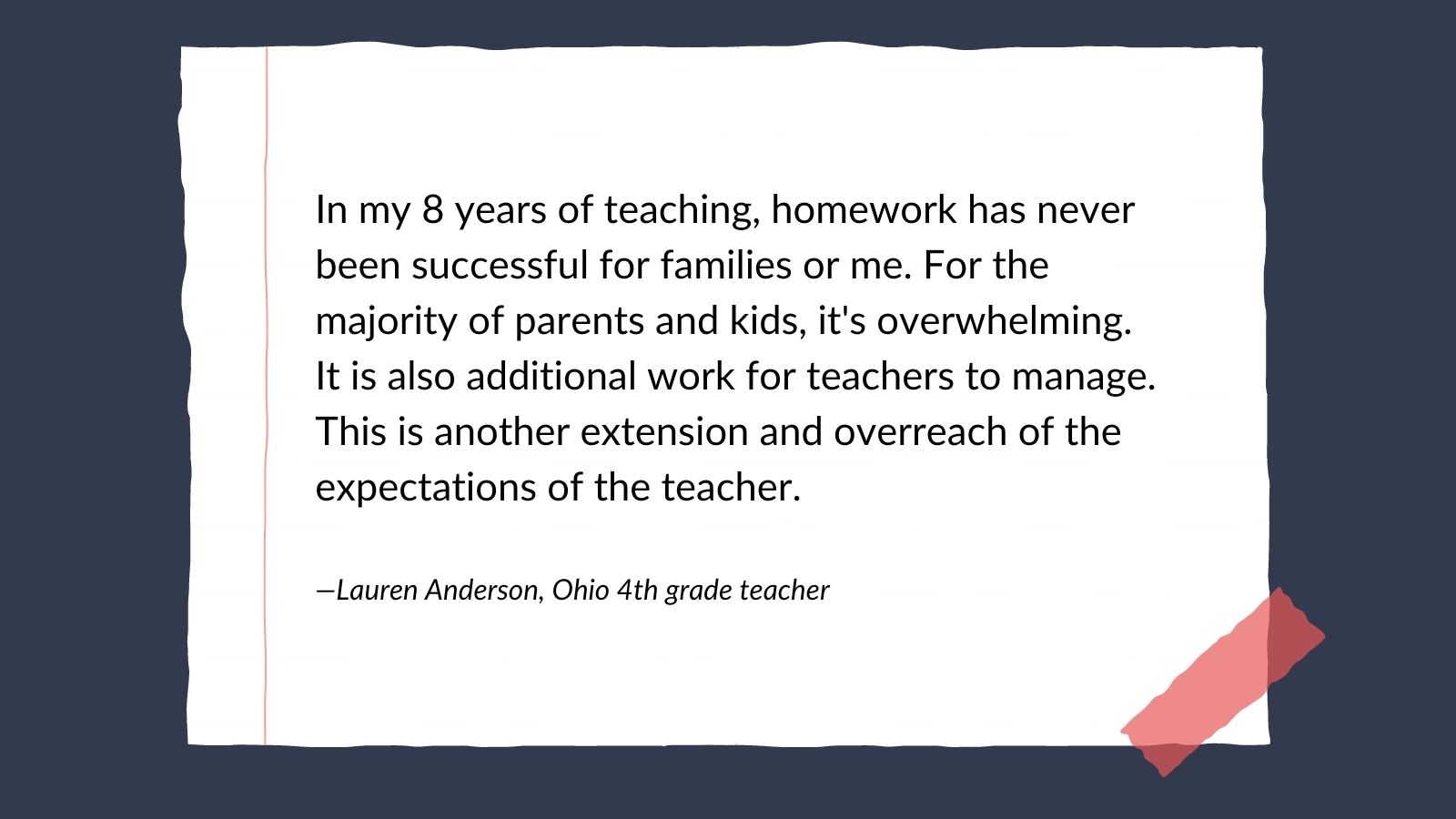
Every kid dreams of it: “Homework banned forevermore!” For as long as anyone can remember, homework has just been one of those things kids have to do because it’s good for them, like eating their vegetables. But is it really as important to do hours of homework every night as it is to eat broccoli and carrots? New research suggests homework might not have a whole lot of value. This leads to a big question: Should we ban homework?
“I think parents already have enough stress just in providing for their families!” says one Arizona 1st grade teacher. “I can imagine one more chore of having to sit down and do homework with their child would add that much more stress. Kids don’t like doing homework, so it frustrates them, which in turn frustrates parents. They spend time fighting about homework that they could be spending quality time over a board game or family meal!”
We wanted to know more, as every educator should. So, we combed through recent research to see what experts say, and explored the news to see what schools in the United States and abroad have tried. Plus, we asked 40+ active K-12 educators to share their thoughts. Here’s what we found out.
Does homework actually work?
This is one of the biggest questions people have around homework bans. Is it worth the time students are spending on it? How many kids actually do it consistently? How involved do parents need to be? In short: Does homework have value?
What the Research Says
Educators first started asking serious questions about homework more than 20 years ago, when an article that evaluated decades of research on homework suggested that it might not be as effective as we thought, at least in the lower grades . But other studies on homework indicate that students who do homework as assigned have higher academic outcomes overall, especially in grades 7 through 12.
What Real Educators Say
Most of the teachers that responded to our survey felt homework (especially for upper grades) does have at least some value. Many, though, were less concerned with academic benefits and more with developing general life skills like time management and responsibility.
- “For older students, reasonable homework that is preparation for class the next day helps students learn how to manage their time, meet deadlines, and take responsibility for their learning. I am a fan of flipped learning—students watch the lesson for homework and then use class time to ask questions, work together, work with their teacher, and do the work.” —Julie Mason, MS/HS English teacher
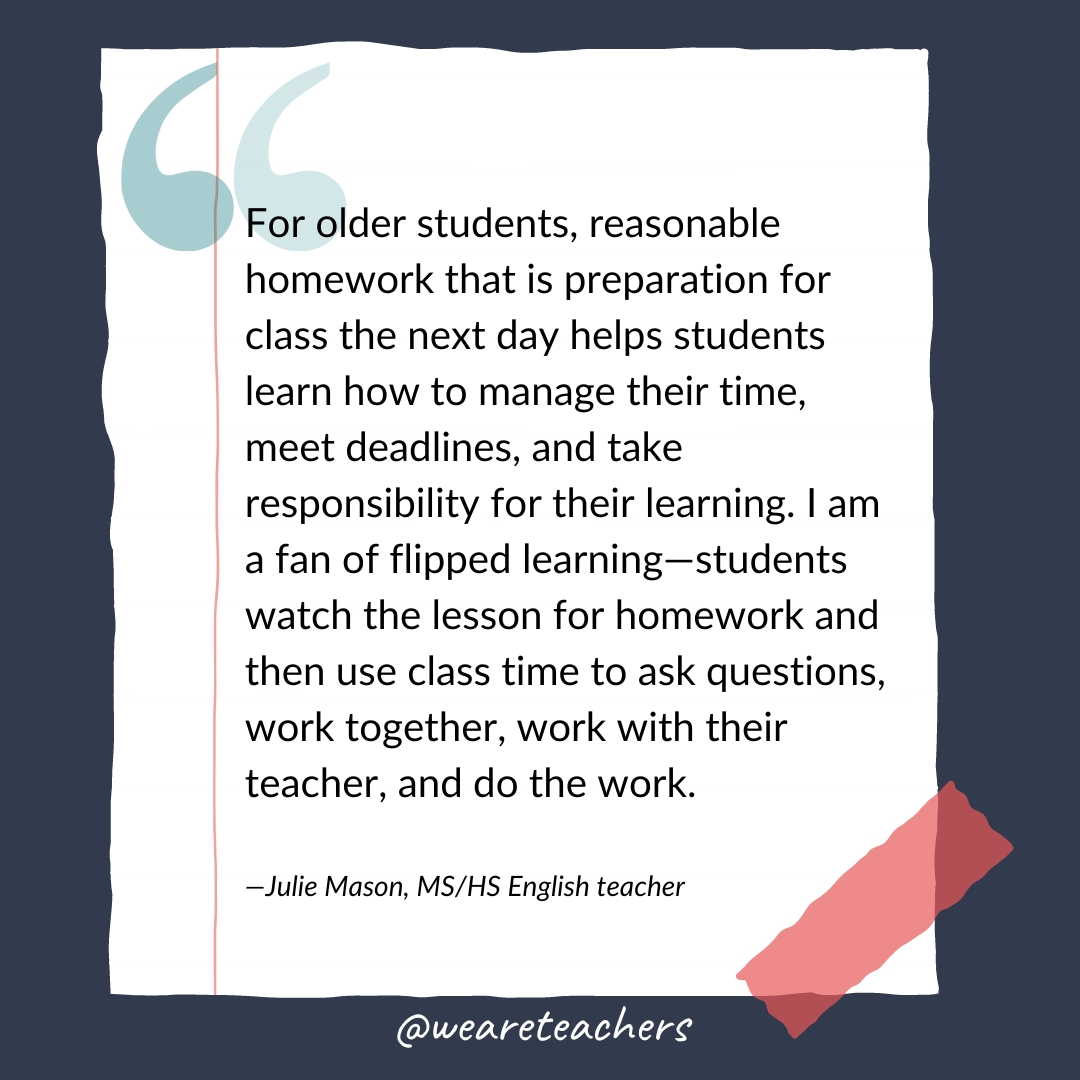
- “In middle school and high school, homework is important because it helps build stamina and potential study habits for college or trade schools.” —Desiree T., elementary teacher
- “Homework is good practice for subjects like math. In other subjects, it is good for reviewing subject matter.” —Ohio 8th grade social studies teacher
- “The proper amount of homework that is relevant to the daily lessons will help reinforce the skill and allow parents to see what their child is learning.” —Joanie B., Texas 4th/6th grade teacher
- “It’s not beneficial; parents today have not been taught how to help with new strategies. They are also often so busy that they cannot be bothered to help so they just give the answers. I saw a lot of this during the pandemic and even after when I would have 1st graders tell me they knew the answer ‘because they just know it.’ Not to mention the students who would actually benefit from having the extra practice of homework oftentimes do not have the support at home.” —Georgia 3rd grade teacher
- “In my 8 years of teaching, homework has never been successful for families or me. For the majority of parents and kids, it’s overwhelming. It is also additional work for teachers to manage. This is another extension and overreach of the expectations of the teacher.” —Lauren Anderson, Ohio 4th grade teacher
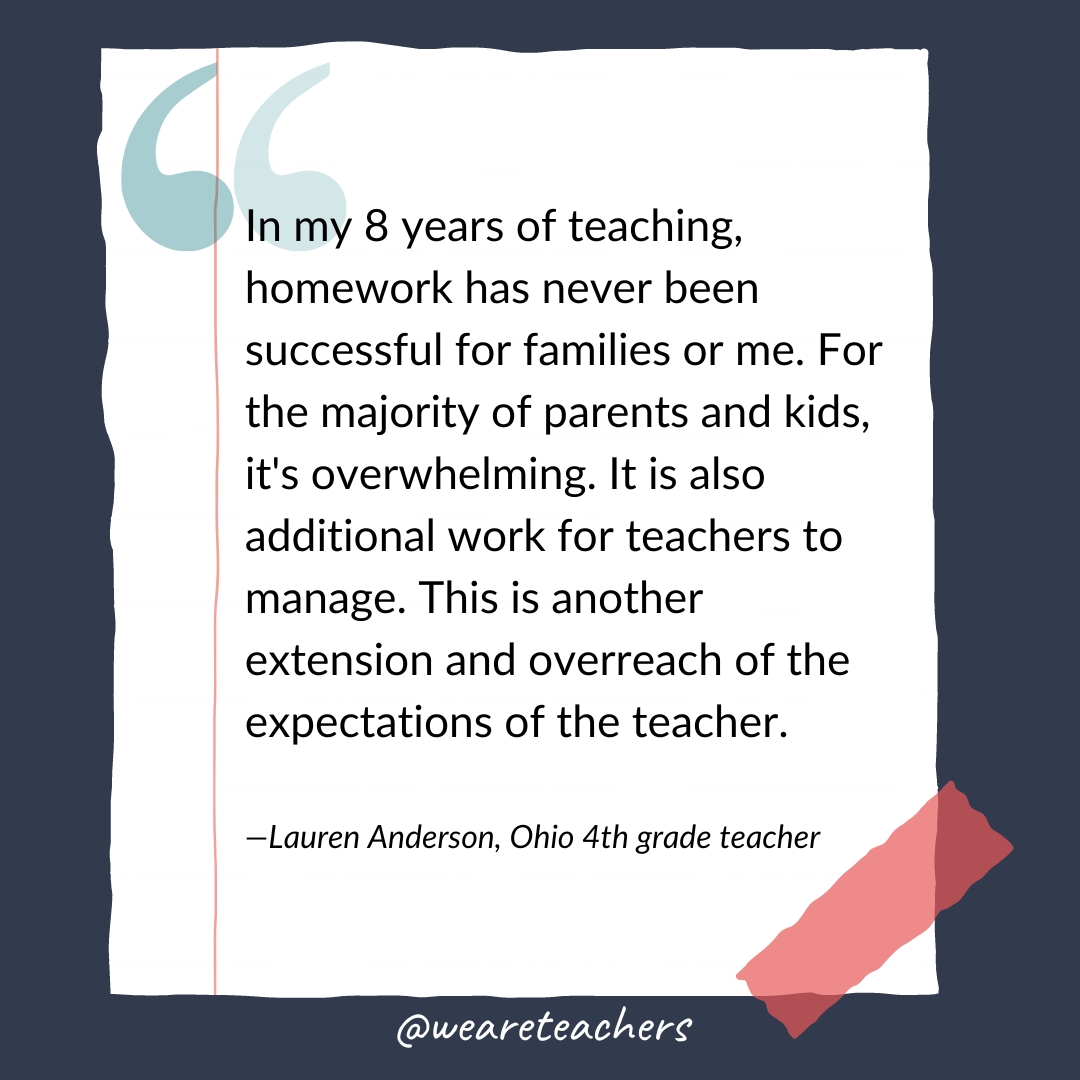
- “Homework isn’t busy work. How will today’s youth become tomorrow’s leaders (or survive college/trades classes) if they aren’t practicing skills to the next level?” —Arizona 1st grade teacher
Should we ban homework in elementary school?
Most adults today didn’t have homework in kindergarten, so they’re surprised when their child arrives home with a backpack full of worksheets. Older elementary students frequently bring home big projects like making a diorama or creating a family tree, something that usually means a lot of parent involvement. Is homework at this age reasonable and meaningful?
Supporters of a homework ban often cite research from John Hattie, who concluded that elementary school homework has no effect on academic progress. In a podcast he said, “Homework in primary school has an effect of around zero … It’s one of those lower hanging fruits that we should be looking in our primary schools to say, ‘Is it really making a difference?’”
The general wisdom these days seems to point to less homework overall at the elementary level, with one huge exception: reading. The research agrees: kids need to read at home as well as at school. Most educators recommend kids spend at least 20 minutes reading at home every single day.
More than half of our survey respondents (56%) are in favor of banning homework for the elementary grades. They worried about kids not having support or resources at home and taking away their time for creative play or family activities. But some teachers still find value in elementary homework, especially for math and reading, as long as it’s minimal. ADVERTISEMENT
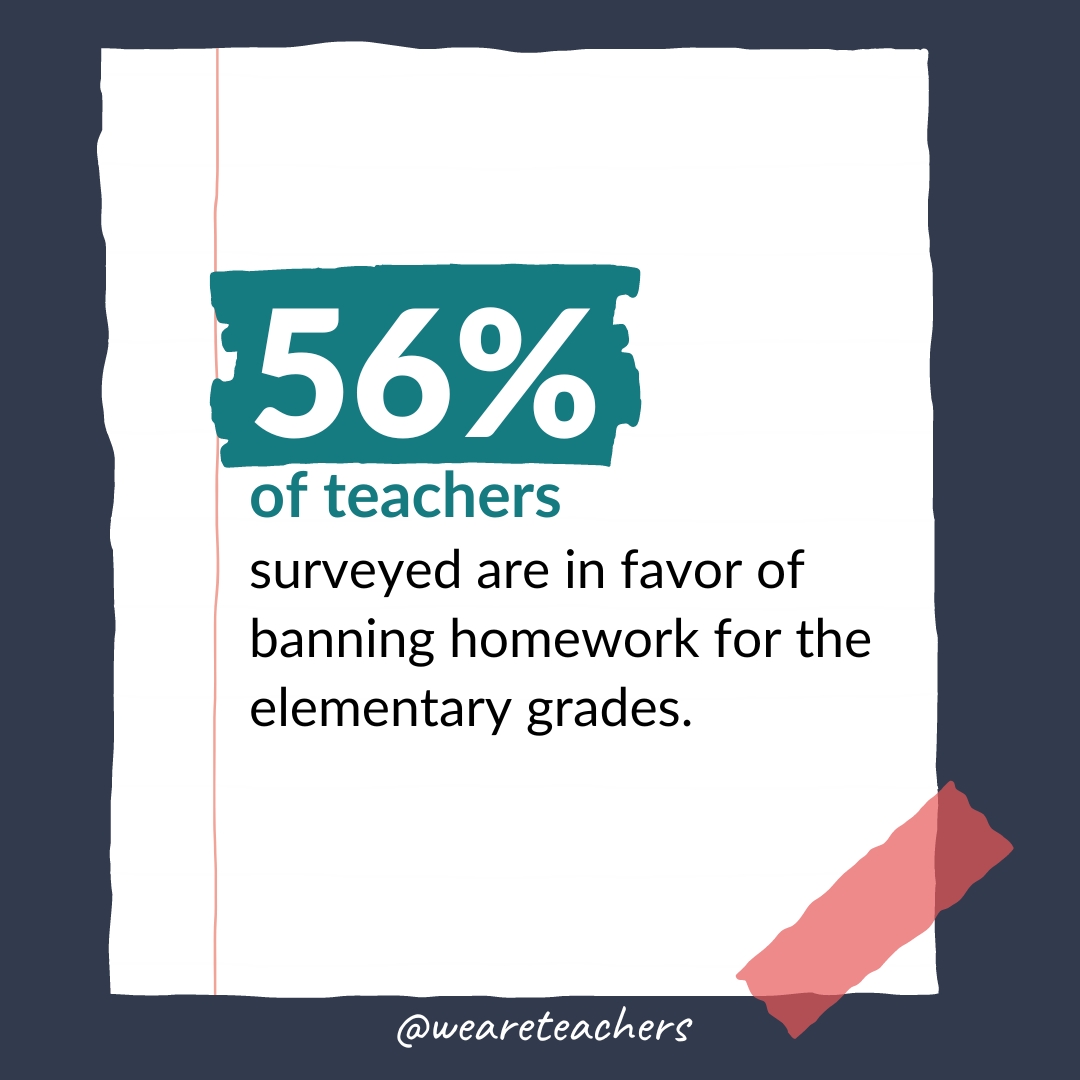
- “The common push for homework in elementary schools is ‘to prepare them for high school.’ That’s overreach. The elementary child’s job is to be an elementary child. We need to teach children where they are.” —Lauren Anderson
- “In elementary school, there should be a mixture of homework and unhomework activities. For example, a homework menu with a list of activities to complete for the month or for the week: Read in pajamas for 20 minutes, complete 3 math sheets, help cook dinner, have a family movie night, write your first and last name 10 times, help pack your snack, etc.” —Desiree T.
- “No homework should be part of the teacher motto—work smarter, not harder. Teachers spend too much time grading homework. I believe teachers and students should commit to making every minute count in the classroom so everyone can go home and just be with family.” —Jennifer N., 5th grade teacher
- “Students are learning new concepts. There is not a guarantee that someone will be able to help them with these tasks. Practicing incorrectly is worse than no practice at all.” —High school resource specialist
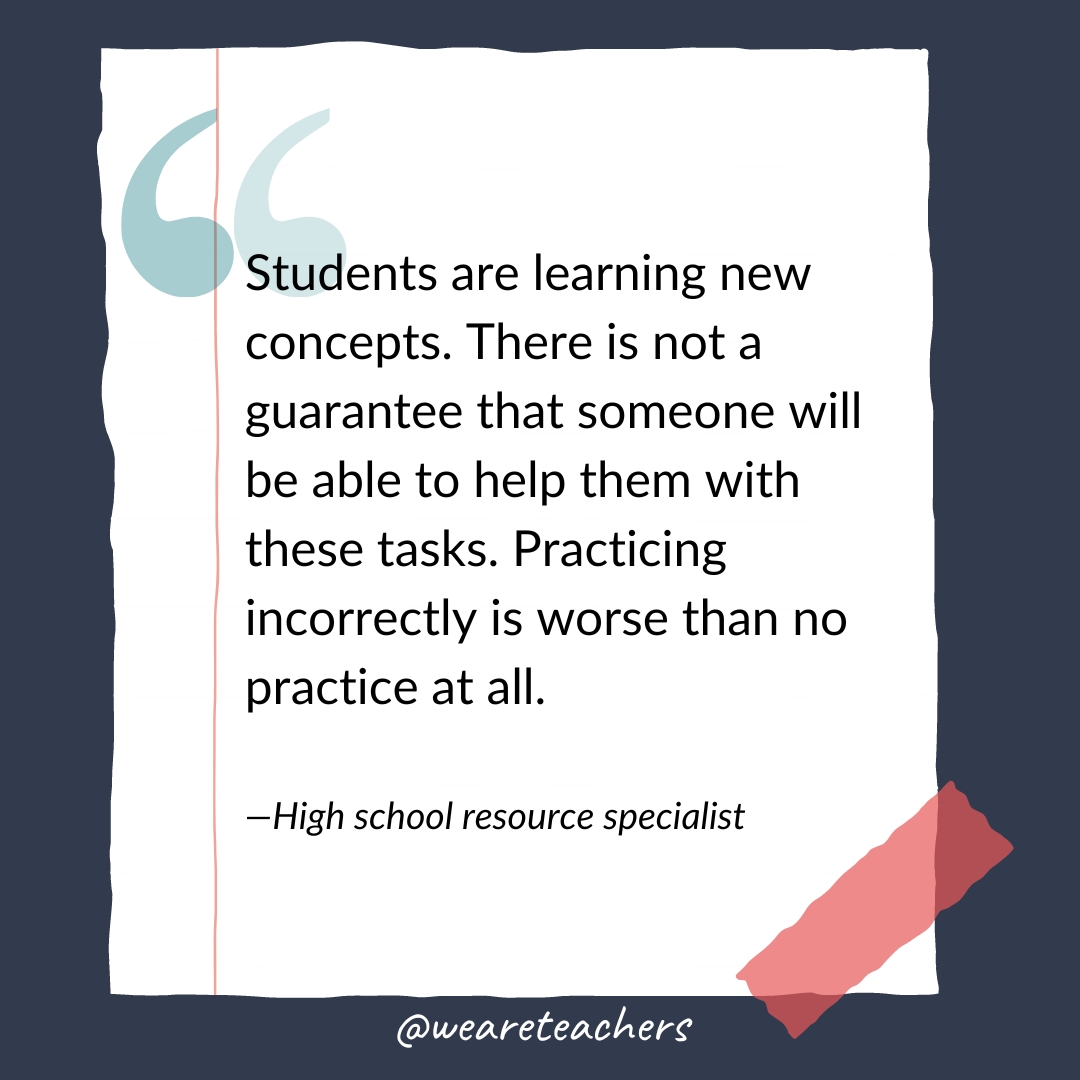
- “Kids should be encouraged to read [at home] and spend time with families and friends.” —Elementary English language development teacher
How much homework is enough (or too much)?
If we agree that that answer to “should we ban homework altogether” is “no,” then how much homework is reasonable? The answer seems to vary by grade level, as you would expect. But many point out the need to focus on the quality of homework over the quantity. And there have been increasing calls to let kids enjoy their longer school breaks without homework hanging over their heads .
A 2019 study showed that teenagers have doubled the amount of time they spend on homework since the 1990s. This study found that teens spend about an hour a day doing homework on average, which many would argue isn’t unreasonable. But in another study , kids self-reported doing an average of three hours of homework a night, which seems a lot more significant.
The National PTA and the NEA recommend kids do about 10 minutes of homework per night per grade level. In other words, a 3rd grader should do 30 minutes of homework. A 12th grader would do 120 minutes, or two full hours.
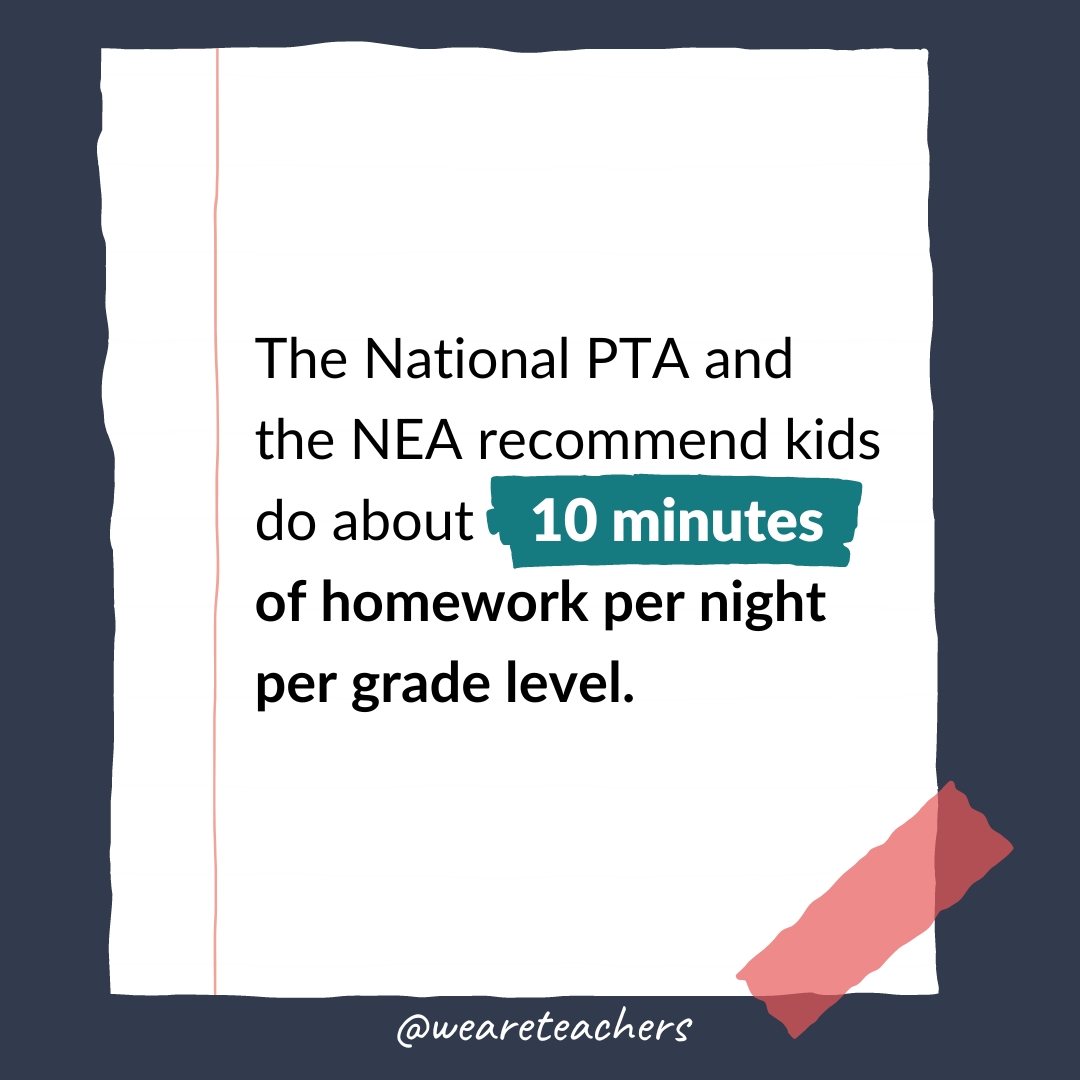
Perhaps more important than “How much homework?” is “What kind of homework?” Meaningful practice of what kids learned in class that day can be helpful. Busywork is not. And assigning really difficult work for kids to tackle at home, without any help from a teacher or other expert voice, is likely to simply frustrate them. Unfortunately, most teachers don’t receive training on how to assign homework that is meaningful and relevant to students. This is another area where we really need to consider a major culture shift.
While 75% of those surveyed say homework has some value in the upper grades at least, most feel it shouldn’t be excessive. Teachers stressed that it should never be used as punishment. Plus, it’s important to remember not all kids have the same access to help and resources outside the classroom.
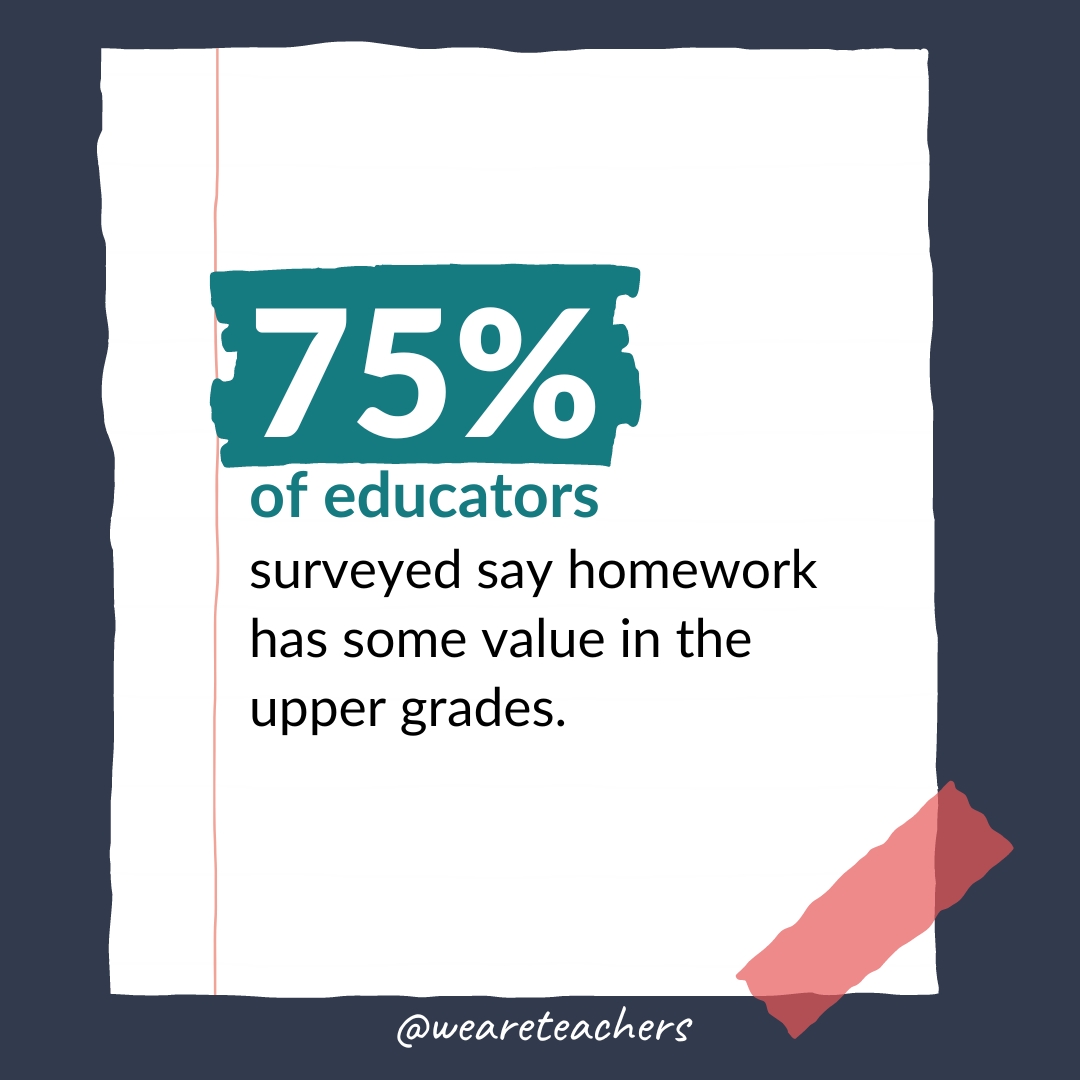
- “Homework is important but I also believe it shouldn’t exceed 30-60 minutes a night.” —Desiree T.
- “I do think elementary students should practice their reading and maybe 10 minutes of math [at home]. That may look different for each child due to how long it may take them to complete something.” —Wisconsin elementary special education teacher
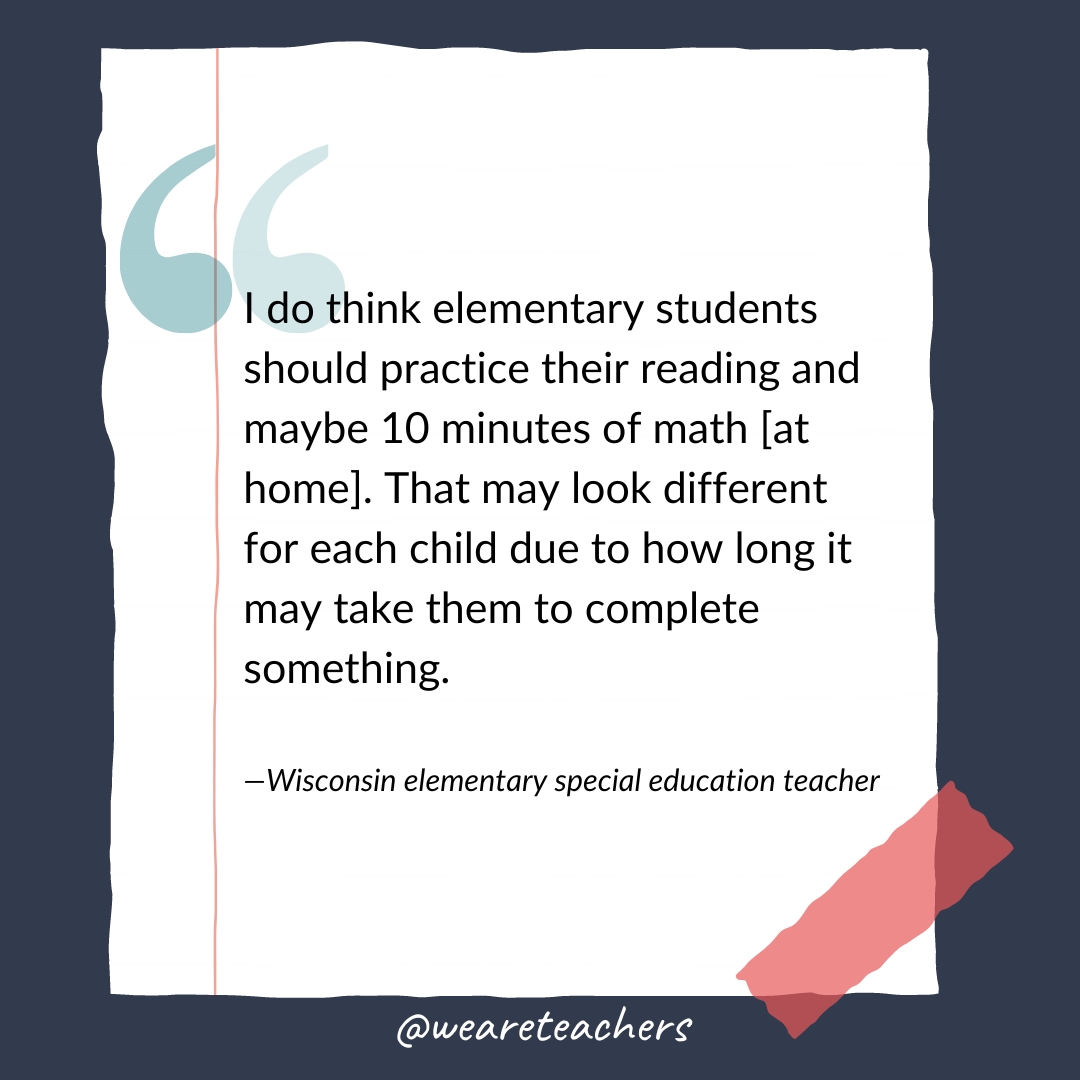
- “Elementary students are not too young to have homework once or twice a week. More than that would be too much.” —Tanya T., HS ELA teacher
- “In order to prepare students for high school, I feel 20-30 minutes of homework is okay [in elementary school].” —Florida 5th grade teacher
- “A ton of homework in every subject is ridiculous. But having to read parts of a book or an article and do several math problems should not be burdensome. And the benefit of those two things has been documented.” —Teresa Rennie, Pennsylvania 8th grade teacher

- “I encourage my elementary students to read a little every day to develop a love of reading.” —Meenal Parikh, Ohio 1st grade teacher
- “I think some homework is reasonable. Should it be a hindrance to other other activities or a major inconvenience? No. Some is good, but it doesn’t need to be an every-night thing.” —Patrick Danz, Michigan high school ELA teacher
Are there benefits to less (or no) homework?
Some schools have already banned homework, both in the United States and around the world. In April 2024, Poland enacted a homework ban for students in grades 1 through 3. In grades 4 through 8, homework must be optional and can’t count toward a student’s grade. Finnish schools are famous for assigning less homework at all ages , yet continuing to score highly in international rankings. So what are the benefits of freeing kids from homework?
Prioritizing mental health is at the forefront of the homework ban movement. Leaders say they want to give students time to develop other hobbies, relationships, and balance in their lives. When two Utah elementary schools officially banned homework , they found psychologist referrals for anxiety decreased by more than 50%.
In some cases, less or no homework can even have a positive effect on academic outcomes. One high school math teacher dramatically reduced the number of practice problems he asked his students to tackle at home. He also decreased the impact of homework on grades (from 25% to 1%). Now kids had more time to spend on just a few practice problems, and they weren’t stressed about getting them wrong. The result of changes like these? Higher standardized test scores on average.
Some schools have experimented with extending the school day in exchange for eliminating homework. This ensures that kids have more time to do independent work while also ensuring access to expert assistance. After all, not all parents have the time or ability to help with homework. And Internet access isn’t a given in every household. Keeping schoolwork at school means giving all kids equal access to the resources they need.
Teachers worry that kids who spend too much time doing homework are losing out in other areas. They want younger students to have more time to play. Older kids should be able to decompress after spending hours in the classroom. And everyone deserves more opportunities for family time and extracurriculars.
- “The stress and time surrounding homework is unnecessary. Jobs don’t require you take work home so school shouldn’t either. If a kid needs to work more, school could reach out with extra help, but homework is a waste of time. Home is for family time.” —Stephanie G., Maryland 1st grade teacher
- “Homework creates an equity problem. Not all learners have access to the same environment or supports at home as they do in school. The students who have supportive parents and resources (tutors, etc.) will succeed, while others will be penalized.” —Illinois high school teacher
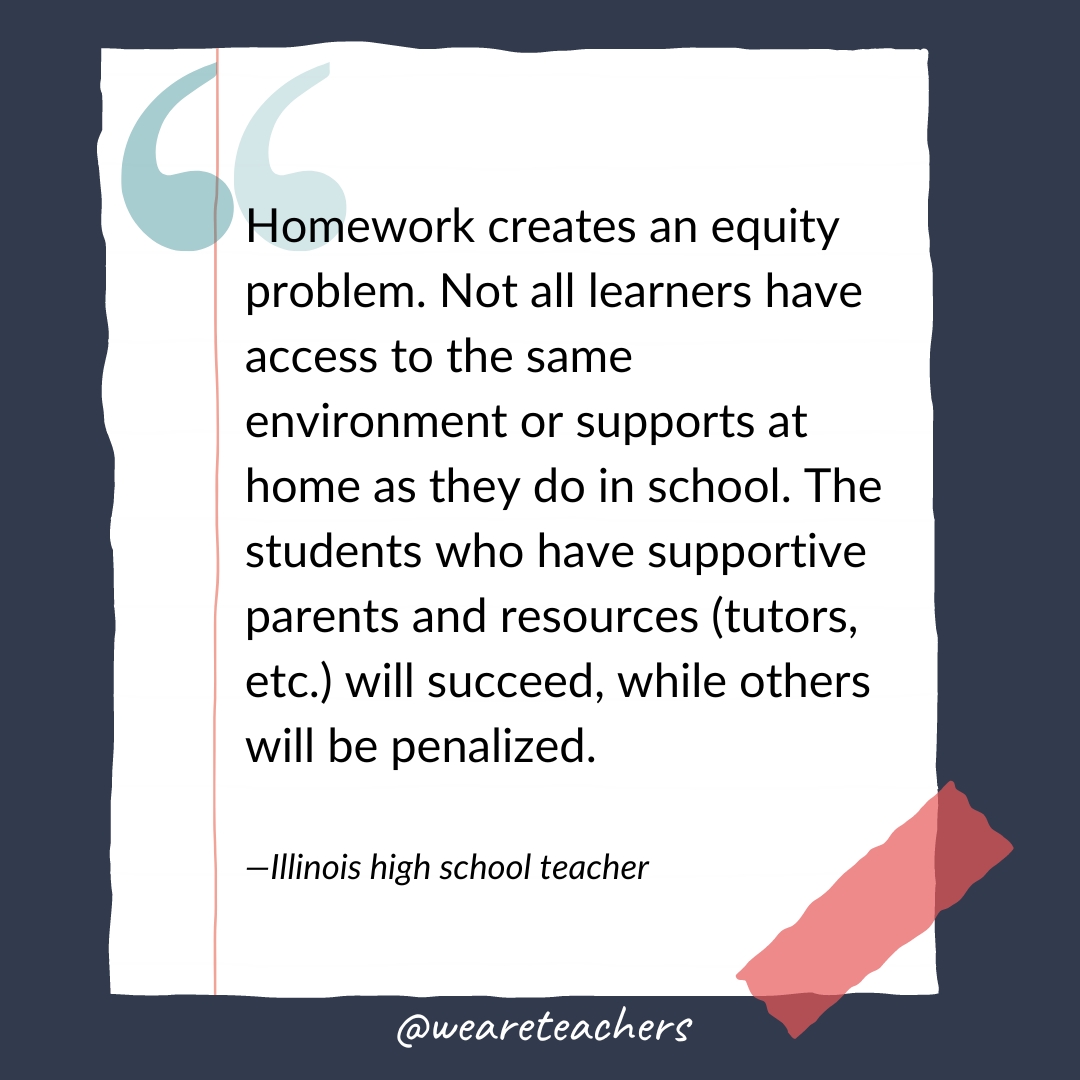
- “If they work at school, they don’t need to work at home. We’re teaching them that it’s okay for someone to tell them how to spend their off-time. School is their job. I don’t like working for free; why should they think that it’s okay?” —North Carolina 1st grade teacher
- “After-school programs, sports, and unstructured play is MUCH more meaningful and impactful for these generations of students.” —Lauren Anderson
- “There are other ways to teach children responsibility and time management than completing homework that will most likely be ungraded.” —4th grade social studies teacher
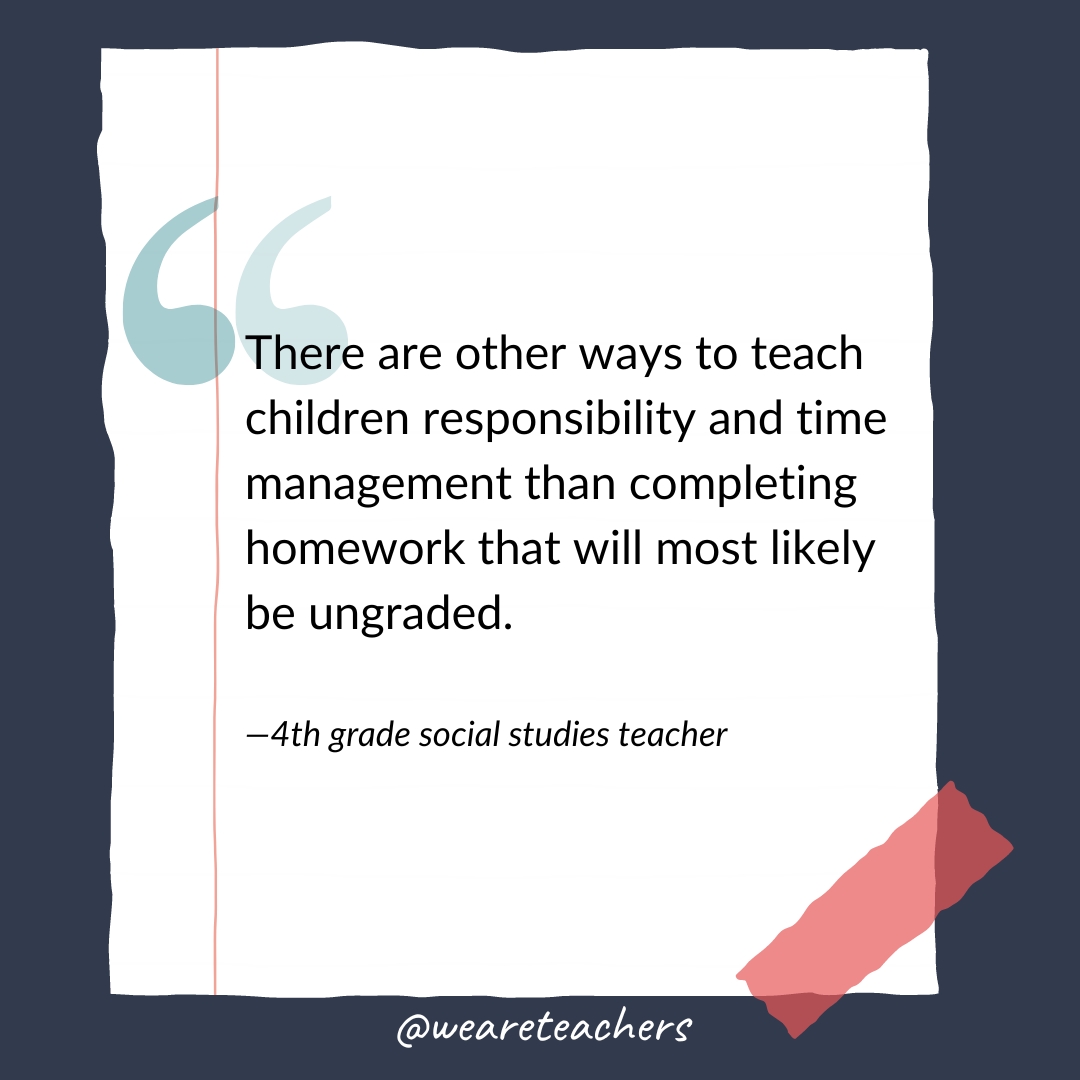
One Teacher’s Take on the Value of Homework: More Cons Than Pros
One 4th grade social studies teacher from North Carolina shared their thoughts with us in detail. We felt they were worth sharing with a wider audience. (Note: We’ve edited and condensed their words for space and clarity.)
Homework Hurts Families
“There are multiple factors that work together that make homework detrimental to students and their families. Children need to spend time with their parents building relationships of trust and respect. It is difficult because during the limited time families have together, they are forced by the schools to give that up to deal with homework.
“Many parents are unable to answer homework questions to help their children as methodology has changed and evolved. Homework becomes a stressful battlefield. Children with ADHD, autism, and other challenges have such a difficult time keeping focus at school. When they have to do additional work at home, there are increased meltdowns and battles, putting further strains on families.”
Homework’s Time Cost
“Children also have less time to complete work at home due to how overscheduled families have become. Children as young as 3rd grade arrive home from their games as late as 10:00 at night. That is often their first opportunity to sit down to complete their work. When they come to school the next day, they become irritable, unfocused, frustrated, and unable to quickly grasp new material.
“In older grades, teachers don’t plan together and don’t understand how much is required of the student to complete each night. If a high school student has six classes and each teacher assigns only 30 minutes of homework each night, that adds up to three hours. I hear of many teachers that each give an hour each night. I don’t see how it is possible for a high school student to complete six hours of homework every night.
“The additional stress of homework for the teacher, students, and families is not worth it. Give families time to spend together, and free up teacher time by not having to hunt down missing work and reviewing what they are not grading. Allow children to have a better bedtime and avoid meltdowns at home, which lead to additional stress, anxiety, and depression.”
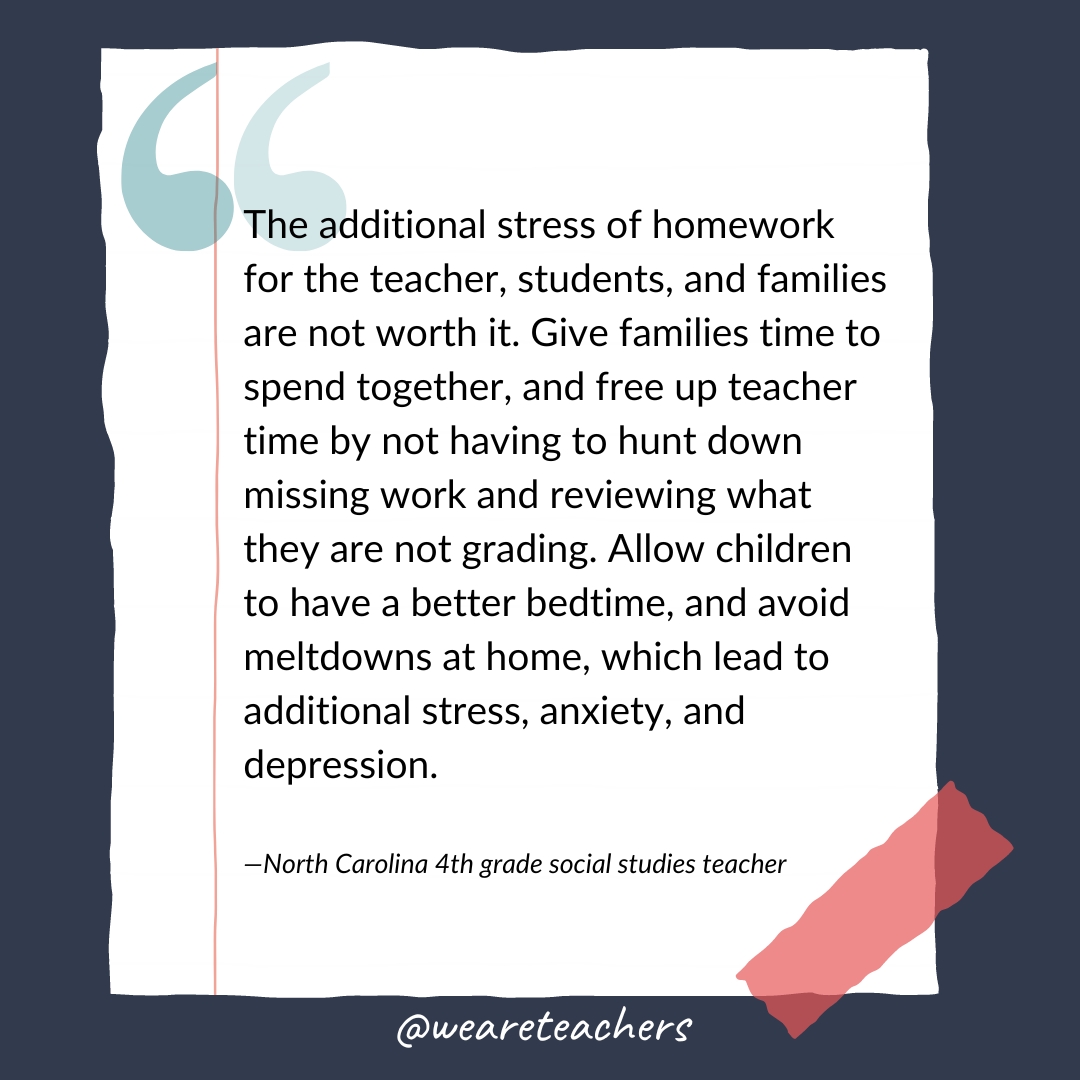
We’d love to hear your thoughts—should homework be banned? Join the discussion in the We Are Teachers HELPLINE group on Facebook.

You Might Also Like

This Teacher’s Technology Hack Will Save You So Much Time Every Morning
It's like a magic wand for your browser tabs. Continue Reading
Copyright © 2024. All rights reserved. 5335 Gate Parkway, Jacksonville, FL 32256

Home > Blog > Tips for Online Students > The Pros and Cons of Homework
School Life Balance , Tips for Online Students
The Pros and Cons of Homework
Updated: July 16, 2024
Published: January 23, 2020

Remember those nights when you’d find yourself staring at a mountain of homework, eyes drooping, wondering if you’d ever see the light at the end of the tunnel? The debate over homework’s role in education is as old as time. Is it a crucial tool for reinforcing learning or just an unnecessary burden?
For college students, this question takes on new dimensions. Juggling homework with the endless amount of classes, part-time jobs, and social lives can feel like walking on thin ice. The pressure to maintain grades, meet deadlines, and still find time for friends and relaxation can be overwhelming. So, is homework a friend or foe?

Photo by energepic.com from Pexels
The homework dilemma.
A large amount of college students report feeling overwhelmed by their academic workload, leading to high levels of stress and anxiety. According to Research.com , 45% of college students in the U.S. experience “more than average” stress, with 36.5% citing stress as a major impediment to their academic performance. This stress often stems directly from the homework load, leading to symptoms like headaches, exhaustion, and difficulty sleeping. The intense pressure to manage homework alongside other responsibilities makes us question the true impact of homework on students’ overall well-being.
And then there’s the digital twist. A whopping 89% of students confessed to using AI tools like ChatGPT for their assignments. While these tools can be a godsend for quick answers and assistance, they can also undermine the personal effort and critical thinking necessary to truly understand the material.
On the brighter side, homework can be a powerful ally. According to Inside Higher Ed , structured assignments can actually help reduce stress by providing a clear learning roadmap and keeping students engaged with the material. But where’s the balance between helpful and harmful?
With these perspectives in mind, let’s dive into the pros and cons of homework for college students. By understanding both sides, we can find a middle ground that maximizes learning while keeping stress at bay.
The Pros of Homework
When thoughtfully assigned, homework can be a valuable tool in a student’s educational journey . Let’s explore how homework can be a beneficial companion to your studies:
Enhances Critical Thinking
Homework isn’t just busywork; it’s an opportunity to stretch your mental muscles. Those late-night problem sets and essays can actually encourage deeper understanding and application of concepts. Think of homework as a mental gym; each assignment is a new exercise, pushing you to analyze, synthesize, and evaluate information in ways that strengthen your critical thinking skills .
Time Management Skills
Do you ever juggle multiple deadlines and wonder how to keep it all together? Regular homework assignments can be a crash course in time management . They teach you to prioritize tasks, manage your schedule, and balance academic responsibilities with personal commitments. The ability to juggle various tasks is a skill that will serve you well beyond your college years.
Reinforcement of Learning
There’s a reason why practice makes perfect. Homework reinforces what you’ve learned in class, helping to cement concepts and theories in your mind. Understanding a concept during a lecture is one thing, but applying it through homework can deepen your comprehension and retention.
Preparation for Exams
Think of homework as a sound check and warm-up for exams. Regular assignments keep you engaged with the material, making it easier to review and prepare when exam time rolls around. By consistently working through problems and writing essays, you build a solid foundation that can make the difference between cramming and confident exam performance.
Encourages Independent Learning
Homework promotes a sense of responsibility and independence. It pushes you to tackle assignments on your own, encouraging problem-solving and self-discipline. This independence prepares you for the academic challenges ahead and the autonomy required in your professional and personal life.

The Cons of Homework
Despite its potential benefits, homework can also have significant downsides. Let’s examine the challenges and drawbacks of homework:
Impact on Mental Health
Homework can be a double-edged sword when it comes to mental health . While it’s meant to reinforce learning, the sheer volume of assignments can lead to stress and anxiety. The constant pressure to meet deadlines and the fear of falling behind can create a relentless cycle of stress. Many students become overwhelmed, leading to burnout and negatively impacting their overall well-being.
Limited Time for Other Activities
College isn’t just about hitting the books. It’s also a time for personal growth, exploring new interests, and building social connections. Excessive homework can eat into the time you might otherwise spend on extracurricular activities, hobbies, or simply hanging out with friends. This lack of balance can lead to a less fulfilling college experience. Shouldn’t education be about more than just academics?
Quality Over Quantity
When it comes to homework, more isn’t always better. Piling on assignments can lead to diminished returns on learning. Instead of diving deep into a subject and gaining a thorough understanding, students might rush through tasks just to get them done. This focus on quantity over quality can undermine the educational value of homework.
Inequity in Education
Homework can sometimes exacerbate educational inequalities. Not all students can access the same resources and support systems at home. While some might have a quiet space and access to the internet, others might struggle with distractions and lack of resources. This disparity can put certain students at a disadvantage, making homework more of a burden than a learning tool.
Dependence on AI Tools
With the advent of AI tools like ChatGPT , homework has taken on a new dimension. While these tools can provide quick answers and assistance, they also pose the risk of students becoming overly reliant on technology. This dependence can take away from the actual learning process, as students might bypass the critical thinking and effort needed to truly understand the material. Is convenience worth the potential loss in learning?
Finding the Balance
Finding the right balance with homework means tackling assignments that challenge and support you. Instead of drowning in a sea of tasks, focus on quality over quantity. Choose projects that spark your critical thinking and connect to real-world situations. Flexibility is key here. Recognize that your circumstances are unique, and adjusting your approach can help reduce stress and create a more inclusive learning environment. Constructive feedback makes homework more than just a chore; it turns it into a tool for growth and improvement.
It’s also about living a well-rounded college life. Don’t let homework overshadow other important parts of your life, like extracurricular activities or personal downtime. Emphasize independent learning and use technology wisely to prepare for future challenges. By balancing thoughtful assignments with your personal needs, homework can shift from being a burden to becoming a helpful companion on your educational journey, enriching your academic and personal growth.
Homework has its pros and cons, especially for college students. It can enhance critical thinking, time management, and learning, but it also brings stress, impacts mental health, and can become overwhelming. Finding the right balance is key.
Focus on quality assignments, maintain flexibility, and make sure your homework complements rather than dominates your life. With a thoughtful approach, homework can support your educational journey, fostering both academic success and personal growth.
How can I manage my time effectively to balance homework and other activities?
Create a schedule that allocates specific times for homework, classes, and personal activities. Use planners or digital calendars to keep track of deadlines and prioritize tasks. Don’t forget to include breaks to avoid burnout.
How can I reduce the stress associated with homework?
To manage stress, practice mindfulness techniques like meditation or deep breathing exercises. Break assignments into smaller, manageable tasks and tackle them one at a time. If needed, seek support from classmates, tutors, or mental health professionals.
Is using AI tools for homework cheating?
While AI tools like ChatGPT can be helpful for quick assistance, relying on them too much can hinder your learning process. Use them as a supplement rather than a replacement for your own effort and critical thinking.
How can teachers make homework more equitable?
Teachers can offer flexible deadlines, provide resources for students who lack them, and design assignments that account for different learning styles and home environments. Open communication between students and teachers can also help address individual challenges.
What are some strategies to make homework more meaningful?
Focus on quality over quantity by designing assignments that encourage deep thinking and application of knowledge. Integrate real-world problems to make homework more relevant and engaging. Provide constructive feedback to help students learn and grow from their assignments.
In this article
At UoPeople, our blog writers are thinkers, researchers, and experts dedicated to curating articles relevant to our mission: making higher education accessible to everyone. Read More

What’s the Right Amount of Homework?
Decades of research show that homework has some benefits, especially for students in middle and high school—but there are risks to assigning too much.
Your content has been saved!
Many teachers and parents believe that homework helps students build study skills and review concepts learned in class. Others see homework as disruptive and unnecessary, leading to burnout and turning kids off to school. Decades of research show that the issue is more nuanced and complex than most people think: Homework is beneficial, but only to a degree. Students in high school gain the most, while younger kids benefit much less.
The National PTA and the National Education Association support the “ 10-minute homework guideline ”—a nightly 10 minutes of homework per grade level. But many teachers and parents are quick to point out that what matters is the quality of the homework assigned and how well it meets students’ needs, not the amount of time spent on it.
The guideline doesn’t account for students who may need to spend more—or less—time on assignments. In class, teachers can make adjustments to support struggling students, but at home, an assignment that takes one student 30 minutes to complete may take another twice as much time—often for reasons beyond their control. And homework can widen the achievement gap, putting students from low-income households and students with learning disabilities at a disadvantage.
However, the 10-minute guideline is useful in setting a limit: When kids spend too much time on homework, there are real consequences to consider.
Small Benefits for Elementary Students
As young children begin school, the focus should be on cultivating a love of learning, and assigning too much homework can undermine that goal. And young students often don’t have the study skills to benefit fully from homework, so it may be a poor use of time (Cooper, 1989 ; Cooper et al., 2006 ; Marzano & Pickering, 2007 ). A more effective activity may be nightly reading, especially if parents are involved. The benefits of reading are clear: If students aren’t proficient readers by the end of third grade, they’re less likely to succeed academically and graduate from high school (Fiester, 2013 ).
For second-grade teacher Jacqueline Fiorentino, the minor benefits of homework did not outweigh the potential drawback of turning young children against school at an early age, so she experimented with dropping mandatory homework. “Something surprising happened: They started doing more work at home,” Fiorentino writes . “This inspiring group of 8-year-olds used their newfound free time to explore subjects and topics of interest to them.” She encouraged her students to read at home and offered optional homework to extend classroom lessons and help them review material.
Moderate Benefits for Middle School Students
As students mature and develop the study skills necessary to delve deeply into a topic—and to retain what they learn—they also benefit more from homework. Nightly assignments can help prepare them for scholarly work, and research shows that homework can have moderate benefits for middle school students (Cooper et al., 2006 ). Recent research also shows that online math homework, which can be designed to adapt to students’ levels of understanding, can significantly boost test scores (Roschelle et al., 2016 ).
There are risks to assigning too much, however: A 2015 study found that when middle school students were assigned more than 90 to 100 minutes of daily homework, their math and science test scores began to decline (Fernández-Alonso, Suárez-Álvarez, & Muñiz, 2015 ). Crossing that upper limit can drain student motivation and focus. The researchers recommend that “homework should present a certain level of challenge or difficulty, without being so challenging that it discourages effort.” Teachers should avoid low-effort, repetitive assignments, and assign homework “with the aim of instilling work habits and promoting autonomous, self-directed learning.”
In other words, it’s the quality of homework that matters, not the quantity. Brian Sztabnik, a veteran middle and high school English teacher, suggests that teachers take a step back and ask themselves these five questions :
- How long will it take to complete?
- Have all learners been considered?
- Will an assignment encourage future success?
- Will an assignment place material in a context the classroom cannot?
- Does an assignment offer support when a teacher is not there?
More Benefits for High School Students, but Risks as Well
By the time they reach high school, students should be well on their way to becoming independent learners, so homework does provide a boost to learning at this age, as long as it isn’t overwhelming (Cooper et al., 2006 ; Marzano & Pickering, 2007 ). When students spend too much time on homework—more than two hours each night—it takes up valuable time to rest and spend time with family and friends. A 2013 study found that high school students can experience serious mental and physical health problems, from higher stress levels to sleep deprivation, when assigned too much homework (Galloway, Conner, & Pope, 2013 ).
Homework in high school should always relate to the lesson and be doable without any assistance, and feedback should be clear and explicit.
Teachers should also keep in mind that not all students have equal opportunities to finish their homework at home, so incomplete homework may not be a true reflection of their learning—it may be more a result of issues they face outside of school. They may be hindered by issues such as lack of a quiet space at home, resources such as a computer or broadband connectivity, or parental support (OECD, 2014 ). In such cases, giving low homework scores may be unfair.
Since the quantities of time discussed here are totals, teachers in middle and high school should be aware of how much homework other teachers are assigning. It may seem reasonable to assign 30 minutes of daily homework, but across six subjects, that’s three hours—far above a reasonable amount even for a high school senior. Psychologist Maurice Elias sees this as a common mistake: Individual teachers create homework policies that in aggregate can overwhelm students. He suggests that teachers work together to develop a school-wide homework policy and make it a key topic of back-to-school night and the first parent-teacher conferences of the school year.
Parents Play a Key Role
Homework can be a powerful tool to help parents become more involved in their child’s learning (Walker et al., 2004 ). It can provide insights into a child’s strengths and interests, and can also encourage conversations about a child’s life at school. If a parent has positive attitudes toward homework, their children are more likely to share those same values, promoting academic success.
But it’s also possible for parents to be overbearing, putting too much emphasis on test scores or grades, which can be disruptive for children (Madjar, Shklar, & Moshe, 2015 ). Parents should avoid being overly intrusive or controlling—students report feeling less motivated to learn when they don’t have enough space and autonomy to do their homework (Orkin, May, & Wolf, 2017 ; Patall, Cooper, & Robinson, 2008 ; Silinskas & Kikas, 2017 ). So while homework can encourage parents to be more involved with their kids, it’s important to not make it a source of conflict.
share this!
January 18, 2024
This article has been reviewed according to Science X's editorial process and policies . Editors have highlighted the following attributes while ensuring the content's credibility:
fact-checked
trusted source
Q&A: Does homework still have value? An education expert weighs in
by Vicky Hallett, Johns Hopkins University

The necessity of homework has been a subject of debate since at least as far back as the 1890s, according to Joyce L. Epstein, co-director of the Center on School, Family, and Community Partnerships at Johns Hopkins University. "It's always been the case that parents, kids—and sometimes teachers, too—wonder if this is just busy work," Epstein says.
But after decades of researching how to improve schools, the professor in the Johns Hopkins School of Education remains certain that homework is essential—as long as the teachers have done their homework, too. The National Network of Partnership Schools, which she founded in 1995 to advise schools and districts on ways to improve comprehensive programs of family engagement, has developed hundreds of improved homework ideas through its Teachers Involve Parents in Schoolwork program.
For an English class, a student might interview a parent on popular hairstyles from their youth and write about the differences between then and now. Or for science class, a family could identify forms of matter over the dinner table, labeling foods as liquids or solids. These innovative and interactive assignments not only reinforce concepts from the classroom but also foster creativity, spark discussions, and boost student motivation.
"We're not trying to eliminate homework procedures, but expand and enrich them," says Epstein, who is packing this research into a forthcoming book on the purposes and designs of homework. In the meantime, the Hub couldn't wait to ask her some questions.
What kind of homework training do teachers typically get?
Future teachers and administrators really have little formal training on how to design homework before they assign it. This means that most just repeat what their teachers did, or they follow textbook suggestions at the end of units. For example, future teachers are well prepared to teach reading and literacy skills at each grade level, and they continue to learn to improve their teaching of reading in ongoing in-service education.
By contrast, most receive little or no training on the purposes and designs of homework in reading or other subjects. It is really important for future teachers to receive systematic training to understand that they have the power, opportunity, and obligation to design homework with a purpose.
Why do students need more interactive homework?
If homework assignments are always the same—10 math problems, six sentences with spelling words—homework can get boring and some kids just stop doing their assignments, especially in the middle and high school years. When we've asked teachers what's the best homework you've ever had or designed, invariably we hear examples of talking with a parent or grandparent or peer to share ideas.
To be clear, parents should never be asked to "teach" seventh grade science or any other subject. Rather, teachers set up the homework assignments so that the student is in charge. It's always the student's homework. But a good activity can engage parents in a fun, collaborative way.
Our data show that with "good" assignments, more kids finish their work, more kids interact with a family partner, and more parents say, "I learned what's happening in the curriculum." It all works around what the youngsters are learning.
Is family engagement really that important?
At Hopkins, I am part of the Center for Social Organization of Schools, a research center that studies how to improve many aspects of education to help all students do their best in school. One thing my colleagues and I realized was that we needed to look deeply into family and community engagement. There were so few references to this topic when we started that we had to build the field of study. When children go to school, their families "attend" with them whether a teacher can "see" the parents or not. So, family engagement is ever-present in the life of a school.
My daughter's elementary school doesn't assign homework until third grade. What's your take on 'no homework' policies?
There are some parents, writers, and commentators who have argued against homework, especially for very young children. They suggest that children should have time to play after school. This, of course is true, but many kindergarten kids are excited to have homework like their older siblings. If they give homework, most teachers of young children make assignments very short—often following an informal rule of 10 minutes per grade level . "No homework" does not guarantee that all students will spend their free time in productive and imaginative play.
Some researchers and critics have consistently misinterpreted research findings. They have argued that homework should be assigned only at the high school level where data point to a strong connection of doing assignments with higher student achievement. However, as we discussed, some students stop doing homework. This leads, statistically, to results showing that doing homework or spending more minutes on homework is linked to higher student achievement. If slow or struggling students are not doing their assignments, they contribute to—or cause—this "result."
Teachers need to design homework that even struggling students want to do because it is interesting. Just about all students at any age level react positively to good assignments and will tell you so.

Did COVID change how schools and parents view homework?
Within 24 hours of the day school doors closed in March 2020, just about every school and district in the country figured out that teachers had to talk to and work with students' parents. This was not the same as homeschooling—teachers were still working hard to provide daily lessons. But if a child was learning at home in the living room, parents were more aware of what they were doing in school .
One of the silver linings of COVID was that teachers reported that they gained a better understanding of their students' families. We collected wonderfully creative examples of activities from members of the National Network of Partnership Schools. I'm thinking of one art activity where every child talked with a parent about something that made their family unique. Then they drew their finding on a snowflake and returned it to share in class. In math, students talked with a parent about something the family liked so much that they could represent it 100 times. Conversations about schoolwork at home was the point.
How did you create so many homework activities via the Teachers Involve Parents in Schoolwork program?
We had several projects with educators to help them design interactive assignments, not just "do the next three examples on page 38." Teachers worked in teams to create TIPS activities, and then we turned their work into a standard TIPS format in math, reading/language arts, and science for grades K-8. Any teacher can use or adapt our prototypes to match their curricula.
Overall, we know that if future teachers and practicing educators were prepared to design homework assignments to meet specific purposes—including but not limited to interactive activities—more students would benefit from the important experience of doing their homework. And more parents would, indeed, be partners in education.
Provided by Johns Hopkins University
Explore further
Feedback to editors

Oceanic life found to be thriving thanks to Saharan dust blown from thousands of kilometers away
59 minutes ago

New material with wavy layers of atoms exhibits unusual superconducting properties
8 hours ago

Researchers build AI model database to find new alloys for nuclear fusion facilities

Greylag geese with similar personalities have higher hatching success, study suggests

Can captive tigers be part of the effort to save wild populations?

Proteins in tooth enamel offer window into ancient and modern human wellness
10 hours ago

Mysteries of the bizarre 'pseudogap' in quantum physics finally untangled

Are cows pickier than goats? Answers from innovative large-scale feeding experiments from 275 years ago

Research predicts rise in tropical hydraulic failure

Human genome stored on 'everlasting' memory crystal
Relevant physicsforums posts, sources to study basic logic for precocious 10-year old.
16 minutes ago
How to explain Bell's theorem to non-scientists
15 hours ago
Worksheets for Physics Experiments with Smartphones
20 hours ago
How is Physics taught without Calculus?
Sep 18, 2024
I want to start Tutoring Online -- Looking for Advice
Sep 13, 2024
Are excuses for academic parties getting thinner or is it just me?
Sep 7, 2024
More from STEM Educators and Teaching
Related Stories

'There's only so far I can take them': Why teachers give up on struggling students who don't do their homework
Sep 27, 2022

Should parents help their kids with homework?
Aug 29, 2019

What's the point of homework?
Sep 1, 2021

How to help your kids with homework—without doing it for them
Jan 24, 2020

Is homework useful for kids? If so, what age should it start?
Nov 30, 2022

Doing homework is associated with change in students' personality
Oct 6, 2017
Recommended for you

Learning mindset could be key to addressing medical students' alarming burnout
13 hours ago

Researchers test ChatGPT, other AI models against real-world students
Sep 16, 2024

Virtual learning linked to rise in chronic absenteeism, study finds
Sep 5, 2024

AI tools like ChatGPT popular among students who struggle with concentration and attention
Aug 28, 2024

Researchers find academic equivalent of a Great Gatsby Curve in science mentorships
Aug 27, 2024

More academic freedom leads to more innovation, reports study
Aug 21, 2024
Let us know if there is a problem with our content
Use this form if you have come across a typo, inaccuracy or would like to send an edit request for the content on this page. For general inquiries, please use our contact form . For general feedback, use the public comments section below (please adhere to guidelines ).
Please select the most appropriate category to facilitate processing of your request
Thank you for taking time to provide your feedback to the editors.
Your feedback is important to us. However, we do not guarantee individual replies due to the high volume of messages.
E-mail the story
Your email address is used only to let the recipient know who sent the email. Neither your address nor the recipient's address will be used for any other purpose. The information you enter will appear in your e-mail message and is not retained by Phys.org in any form.
Newsletter sign up
Get weekly and/or daily updates delivered to your inbox. You can unsubscribe at any time and we'll never share your details to third parties.
More information Privacy policy
Donate and enjoy an ad-free experience
We keep our content available to everyone. Consider supporting Science X's mission by getting a premium account.
E-mail newsletter
Along with Stanford news and stories, show me:
- Student information
- Faculty/Staff information
We want to provide announcements, events, leadership messages and resources that are relevant to you. Your selection is stored in a browser cookie which you can remove at any time using “Clear all personalization” below.

Education scholar Denise Pope has found that too much homework has negative effects on student well-being and behavioral engagement. (Image credit: L.A. Cicero)
A Stanford researcher found that too much homework can negatively affect kids, especially their lives away from school, where family, friends and activities matter.
“Our findings on the effects of homework challenge the traditional assumption that homework is inherently good,” wrote Denise Pope , a senior lecturer at the Stanford Graduate School of Education and a co-author of a study published in the Journal of Experimental Education .
The researchers used survey data to examine perceptions about homework, student well-being and behavioral engagement in a sample of 4,317 students from 10 high-performing high schools in upper-middle-class California communities. Along with the survey data, Pope and her colleagues used open-ended answers to explore the students’ views on homework.
Median household income exceeded $90,000 in these communities, and 93 percent of the students went on to college, either two-year or four-year.
Students in these schools average about 3.1 hours of homework each night.
“The findings address how current homework practices in privileged, high-performing schools sustain students’ advantage in competitive climates yet hinder learning, full engagement and well-being,” Pope wrote.
Pope and her colleagues found that too much homework can diminish its effectiveness and even be counterproductive. They cite prior research indicating that homework benefits plateau at about two hours per night, and that 90 minutes to two and a half hours is optimal for high school.
Their study found that too much homework is associated with:
* Greater stress: 56 percent of the students considered homework a primary source of stress, according to the survey data. Forty-three percent viewed tests as a primary stressor, while 33 percent put the pressure to get good grades in that category. Less than 1 percent of the students said homework was not a stressor.
* Reductions in health: In their open-ended answers, many students said their homework load led to sleep deprivation and other health problems. The researchers asked students whether they experienced health issues such as headaches, exhaustion, sleep deprivation, weight loss and stomach problems.
* Less time for friends, family and extracurricular pursuits: Both the survey data and student responses indicate that spending too much time on homework meant that students were “not meeting their developmental needs or cultivating other critical life skills,” according to the researchers. Students were more likely to drop activities, not see friends or family, and not pursue hobbies they enjoy.
A balancing act
The results offer empirical evidence that many students struggle to find balance between homework, extracurricular activities and social time, the researchers said. Many students felt forced or obligated to choose homework over developing other talents or skills.
Also, there was no relationship between the time spent on homework and how much the student enjoyed it. The research quoted students as saying they often do homework they see as “pointless” or “mindless” in order to keep their grades up.
“This kind of busy work, by its very nature, discourages learning and instead promotes doing homework simply to get points,” Pope said.
She said the research calls into question the value of assigning large amounts of homework in high-performing schools. Homework should not be simply assigned as a routine practice, she said.
“Rather, any homework assigned should have a purpose and benefit, and it should be designed to cultivate learning and development,” wrote Pope.
High-performing paradox
In places where students attend high-performing schools, too much homework can reduce their time to foster skills in the area of personal responsibility, the researchers concluded. “Young people are spending more time alone,” they wrote, “which means less time for family and fewer opportunities to engage in their communities.”
Student perspectives
The researchers say that while their open-ended or “self-reporting” methodology to gauge student concerns about homework may have limitations – some might regard it as an opportunity for “typical adolescent complaining” – it was important to learn firsthand what the students believe.
The paper was co-authored by Mollie Galloway from Lewis and Clark College and Jerusha Conner from Villanova University.
Media Contacts
Denise Pope, Stanford Graduate School of Education: (650) 725-7412, [email protected] Clifton B. Parker, Stanford News Service: (650) 725-0224, [email protected]
7 Research-Based Reasons Why Students Should Not Have Homework: Academic Insights, Opposing Perspectives & Alternatives
Checking 13yo’s math homework & I have just one question. I can catch mistakes & help her correct. But what do kids do when their parent isn’t an Algebra teacher? Answer: They get frustrated. Quit. Get a bad grade. Think they aren’t good at math. How is homework fair??? — Jay Wamsted (@JayWamsted) March 24, 2022
Insights from Teachers and Education Industry Experts: Diverse Perspectives on Homework
Check out this video featuring Courtney White, a high school language arts teacher who gained widespread attention for her explanation of why she chooses not to assign homework.
“I teach 1st grade. I had parents ask for homework. I explained that I don’t give homework. Home time is family time. Time to play, cook, explore and spend time together. I do send books home, but there is no requirement or checklist for reading them. Read them, enjoy them, and return them when your child is ready for more. I explained that as a parent myself, I know they are busy—and what a waste of energy it is to sit and force their kids to do work at home—when they could use that time to form relationships and build a loving home. Something kids need more than a few math problems a week.” — Colleen S. , 1st grade teacher
“The lasting educational value of homework at that age is not proven. A kid says the times tables [at school] because he studied the times tables last night. But over a long period of time, a kid who is drilled on the times tables at school, rather than as homework, will also memorize their times tables. We are worried about young children and their social emotional learning. And that has to do with physical activity, it has to do with playing with peers, it has to do with family time. All of those are very important and can be removed by too much homework.” — David Bloomfield , education professor at Brooklyn College and the City University of New York graduate center
“Homework in primary school has an effect of around zero. In high school it’s larger. (…) Which is why we need to get it right. Not why we need to get rid of it. It’s one of those lower hanging fruit that we should be looking in our primary schools to say, ‘Is it really making a difference?’” — John Hattie , professor
”Many kids are working as many hours as their overscheduled parents and it is taking a toll – psychologically and in many other ways too. We see kids getting up hours before school starts just to get their homework done from the night before… While homework may give kids one more responsibility, it ignores the fact that kids do not need to grow up and become adults at ages 10 or 12. With schools cutting recess time or eliminating playgrounds, kids absorb every single stress there is, only on an even higher level. Their brains and bodies need time to be curious, have fun, be creative and just be a kid.” — Pat Wayman, teacher and CEO of HowtoLearn.com
7 Reasons Why Students Should Not Have Homework
1. elevated stress and health consequences.
By addressing the issue of homework-related stress and health consequences, we can take a significant step toward creating a more nurturing and effective educational environment. This environment would not only prioritize academic achievement but also the overall well-being and happiness of students, preparing them for a balanced and healthy life both inside and outside the classroom.
2. Inequitable Impact and Socioeconomic Disparities
Moreover, the approach to homework varies significantly across different types of schools. While some rigorous private and preparatory schools in both marginalized and affluent communities assign extreme levels of homework, many progressive schools focusing on holistic learning and self-actualization opt for no homework, yet achieve similar levels of college and career success. This contrast raises questions about the efficacy and necessity of heavy homework loads in achieving educational outcomes.
3. Negative Impact on Family Dynamics
The issue is not confined to specific demographics but is a widespread concern. Samantha Hulsman, a teacher featured in Education Week Teacher , shared her personal experience with the toll that homework can take on family time. She observed that a seemingly simple 30-minute assignment could escalate into a three-hour ordeal, causing stress and strife between parents and children. Hulsman’s insights challenge the traditional mindset about homework, highlighting a shift towards the need for skills such as collaboration and problem-solving over rote memorization of facts.
4. Consumption of Free Time
Authors Sara Bennett and Nancy Kalish , in their book “The Case Against Homework,” offer an insightful window into the lives of families grappling with the demands of excessive homework. They share stories from numerous interviews conducted in the mid-2000s, highlighting the universal struggle faced by families across different demographics. A poignant account from a parent in Menlo Park, California, describes nightly sessions extending until 11 p.m., filled with stress and frustration, leading to a soured attitude towards school in both the child and the parent. This narrative is not isolated, as about one-third of the families interviewed expressed feeling crushed by the overwhelming workload.
Furthermore, the intense homework routine’s effectiveness is doubtful, as it can overwhelm students and detract from the joy of learning. Effective learning builds on prior knowledge in an engaging way, but excessive homework in a home setting may be irrelevant and uninteresting. The key challenge is balancing homework to enhance learning without overburdening students, allowing time for holistic growth and activities beyond academics. It’s crucial to reassess homework policies to support well-rounded development.
5. Challenges for Students with Learning Disabilities
Homework, a standard educational tool, poses unique challenges for students with learning disabilities, often leading to a frustrating and disheartening experience. These challenges go beyond the typical struggles faced by most students and can significantly impede their educational progress and emotional well-being.
Child psychologist Kenneth Barish’s insights in Psychology Today shed light on the complex relationship between homework and students with learning disabilities:
6. Critique of Underlying Assumptions about Learning
These findings bring to light several critical points:
The emerging consensus from these studies suggests that the traditional approach to homework needs rethinking. Rather than focusing on the quantity of assignments, educators should consider the quality and relevance of homework, ensuring it truly contributes to learning and development. This reassessment is crucial for fostering an educational environment that nurtures curiosity and a love for learning, rather than extinguishing it.
7. Issues with Homework Enforcement, Reliability, and Temptation to Cheat
In the academic realm, the enforcement of homework is a subject of ongoing debate, primarily due to its implications on student integrity and the true value of assignments. The challenges associated with homework enforcement often lead to unintended yet significant issues, such as cheating, copying, and a general undermining of educational values.
In conclusion, the challenges of homework enforcement present a complex problem that requires careful consideration. The focus should shift towards creating meaningful, manageable, and quality-driven assignments that encourage genuine learning and integrity, rather than overwhelming students and prompting counterproductive behaviors.
Addressing Opposing Views on Homework Practices
While opinions on homework policies are diverse, understanding different viewpoints is crucial. In the following sections, we will examine common arguments supporting homework assignments, along with counterarguments that offer alternative perspectives on this educational practice.
1. Improvement of Academic Performance
2. reinforcement of learning.
Homework is traditionally viewed as a tool to reinforce classroom learning, enabling students to practice and retain material. However, research suggests its effectiveness is ambiguous. In instances where homework is well-aligned with students’ abilities and classroom teachings, it can indeed be beneficial. Particularly for younger students , excessive homework can cause burnout and a loss of interest in learning, counteracting its intended purpose.
3. Development of Time Management Skills
Homework is often considered a crucial tool in helping students develop important life skills such as time management and organization. The idea is that by regularly completing assignments, students learn to allocate their time efficiently and organize their tasks effectively, skills that are invaluable in both academic and personal life.
However, the impact of homework on developing these skills is not always positive. For younger students, especially, an overwhelming amount of homework can be more of a hindrance than a help. Instead of fostering time management and organizational skills, an excessive workload often leads to stress and anxiety . These negative effects can impede the learning process and make it difficult for students to manage their time and tasks effectively, contradicting the original purpose of homework.
4. Preparation for Future Academic Challenges
Homework is often touted as a preparatory tool for future academic challenges that students will encounter in higher education and their professional lives. The argument is that by tackling homework, students build a foundation of knowledge and skills necessary for success in more advanced studies and in the workforce, fostering a sense of readiness and confidence.
5. Parental Involvement in Education
Homework often acts as a vital link connecting parents to their child’s educational journey, offering insights into the school’s curriculum and their child’s learning process. This involvement is key in fostering a supportive home environment and encouraging a collaborative relationship between parents and the school. When parents understand and engage with what their children are learning, it can significantly enhance the educational experience for the child.
Exploring Alternatives to Homework and Finding a Middle Ground
Alternatives to traditional homework, ideas for minimizing homework.
For teachers who are not ready to fully eliminate homework, these strategies offer a compromise, ensuring that homework supports rather than hinders student learning. By focusing on quality, relevance, and student engagement, educators can transform homework from a chore into a meaningful component of education that genuinely contributes to students’ academic growth and personal development. In this way, we can move towards a more balanced and student-centric approach to learning, both in and out of the classroom.
Useful Resources
Leave a comment cancel reply.
You are using an outdated browser. Please upgrade your browser to improve your experience.

Health & Nursing
Courses and certificates.
- Bachelor's Degrees
- View all Business Bachelor's Degrees
- Business Management – B.S. Business Administration
- Healthcare Administration – B.S.
- Human Resource Management – B.S. Business Administration
- Information Technology Management – B.S. Business Administration
- Marketing – B.S. Business Administration
- Accounting – B.S. Business Administration
- Finance – B.S.
- Supply Chain and Operations Management – B.S.
- Communications – B.S.
- User Experience Design – B.S.
- Accelerated Information Technology Bachelor's and Master's Degree (from the School of Technology)
- Health Information Management – B.S. (from the Leavitt School of Health)
- View all Business Degrees
Master's Degrees
- View all Business Master's Degrees
- Master of Business Administration (MBA)
- MBA Information Technology Management
- MBA Healthcare Management
- Management and Leadership – M.S.
- Accounting – M.S.
- Marketing – M.S.
- Human Resource Management – M.S.
- Master of Healthcare Administration (from the Leavitt School of Health)
- Data Analytics – M.S. (from the School of Technology)
- Information Technology Management – M.S. (from the School of Technology)
- Education Technology and Instructional Design – M.Ed. (from the School of Education)
Certificates
- Supply Chain
- Accounting Fundamentals
- Digital Marketing and E-Commerce
Bachelor's Preparing For Licensure
- View all Education Bachelor's Degrees
- Elementary Education – B.A.
- Special Education and Elementary Education (Dual Licensure) – B.A.
- Special Education (Mild-to-Moderate) – B.A.
- Mathematics Education (Middle Grades) – B.S.
- Mathematics Education (Secondary)– B.S.
- Science Education (Middle Grades) – B.S.
- Science Education (Secondary Chemistry) – B.S.
- Science Education (Secondary Physics) – B.S.
- Science Education (Secondary Biological Sciences) – B.S.
- Science Education (Secondary Earth Science)– B.S.
- View all Education Degrees
Bachelor of Arts in Education Degrees
- Educational Studies – B.A.
Master of Science in Education Degrees
- View all Education Master's Degrees
- Curriculum and Instruction – M.S.
- Educational Leadership – M.S.
- Education Technology and Instructional Design – M.Ed.
Master's Preparing for Licensure
- Teaching, Elementary Education – M.A.
- Teaching, English Education (Secondary) – M.A.
- Teaching, Mathematics Education (Middle Grades) – M.A.
- Teaching, Mathematics Education (Secondary) – M.A.
- Teaching, Science Education (Secondary) – M.A.
- Teaching, Special Education (K-12) – M.A.
Licensure Information
- State Teaching Licensure Information
Master's Degrees for Teachers
- Mathematics Education (K-6) – M.A.
- Mathematics Education (Middle Grade) – M.A.
- Mathematics Education (Secondary) – M.A.
- English Language Learning (PreK-12) – M.A.
- Endorsement Preparation Program, English Language Learning (PreK-12)
- Science Education (Middle Grades) – M.A.
- Science Education (Secondary Chemistry) – M.A.
- Science Education (Secondary Physics) – M.A.
- Science Education (Secondary Biological Sciences) – M.A.
- Science Education (Secondary Earth Science)– M.A.
- View all Technology Bachelor's Degrees
- Cloud Computing – B.S.
- Computer Science – B.S.
- Cybersecurity and Information Assurance – B.S.
- Data Analytics – B.S.
- Information Technology – B.S.
- Network Engineering and Security – B.S.
- Software Engineering – B.S.
- Accelerated Information Technology Bachelor's and Master's Degree
- Information Technology Management – B.S. Business Administration (from the School of Business)
- User Experience Design – B.S. (from the School of Business)
- View all Technology Master's Degrees
- Cybersecurity and Information Assurance – M.S.
- Data Analytics – M.S.
- Information Technology Management – M.S.
- MBA Information Technology Management (from the School of Business)
- Full Stack Engineering
- Web Application Deployment and Support
- Front End Web Development
- Back End Web Development
3rd Party Certifications
- IT Certifications Included in WGU Degrees
- View all Technology Degrees
- View all Health & Nursing Bachelor's Degrees
- Nursing (RN-to-BSN online) – B.S.
- Nursing (Prelicensure) – B.S. (Available in select states)
- Health Information Management – B.S.
- Health and Human Services – B.S.
- Psychology – B.S.
- Health Science – B.S.
- Public Health – B.S.
- Healthcare Administration – B.S. (from the School of Business)
- View all Nursing Post-Master's Certificates
- Nursing Education—Post-Master's Certificate
- Nursing Leadership and Management—Post-Master's Certificate
- Family Nurse Practitioner—Post-Master's Certificate
- Psychiatric Mental Health Nurse Practitioner —Post-Master's Certificate
- View all Health & Nursing Degrees
- View all Nursing & Health Master's Degrees
- Nursing – Education (BSN-to-MSN Program) – M.S.
- Nursing – Leadership and Management (BSN-to-MSN Program) – M.S.
- Nursing – Nursing Informatics (BSN-to-MSN Program) – M.S.
- Nursing – Family Nurse Practitioner (BSN-to-MSN Program) – M.S. (Available in select states)
- Nursing – Psychiatric Mental Health Nurse Practitioner (BSN-to-MSN Program) – M.S. (Available in select states)
- Nursing – Education (RN-to-MSN Program) – M.S.
- Nursing – Leadership and Management (RN-to-MSN Program) – M.S.
- Nursing – Nursing Informatics (RN-to-MSN Program) – M.S.
- Master of Healthcare Administration
- Master of Public Health
- MBA Healthcare Management (from the School of Business)
- Business Leadership (with the School of Business)
- Supply Chain (with the School of Business)
- Accounting Fundamentals (with the School of Business)
- Digital Marketing and E-Commerce (with the School of Business)
- Back End Web Development (with the School of Technology)
- Front End Web Development (with the School of Technology)
- Web Application Deployment and Support (with the School of Technology)
- Full Stack Engineering (with the School of Technology)
- Single Courses
- Course Bundles
Apply for Admission
Admission requirements.
- New Students
- WGU Returning Graduates
- WGU Readmission
- Enrollment Checklist
- Accessibility
- Accommodation Request
- School of Education Admission Requirements
- School of Business Admission Requirements
- School of Technology Admission Requirements
- Leavitt School of Health Admission Requirements
Additional Requirements
- Computer Requirements
- No Standardized Testing
- Clinical and Student Teaching Information
Transferring
- FAQs about Transferring
- Transfer to WGU
- Transferrable Certifications
- Request WGU Transcripts
- International Transfer Credit
- Tuition and Fees
- Financial Aid
- Scholarships
Other Ways to Pay for School
- Tuition—School of Business
- Tuition—School of Education
- Tuition—School of Technology
- Tuition—Leavitt School of Health
- Your Financial Obligations
- Tuition Comparison
- Applying for Financial Aid
- State Grants
- Consumer Information Guide
- Responsible Borrowing Initiative
- Higher Education Relief Fund
FAFSA Support
- Net Price Calculator
- FAFSA Simplification
- See All Scholarships
- Military Scholarships
- State Scholarships
- Scholarship FAQs
Payment Options
- Payment Plans
- Corporate Reimbursement
- Current Student Hardship Assistance
- Military Tuition Assistance
WGU Experience
- How You'll Learn
- Scheduling/Assessments
- Accreditation
- Student Support/Faculty
- Military Students
- Part-Time Options
- Virtual Military Education Resource Center
- Student Outcomes
- Return on Investment
- Students and Gradutes
- Career Growth
- Student Resources
- Communities
- Testimonials
- Career Guides
- Skills Guides
- Online Degrees
- All Degrees
- Explore Your Options
Admissions & Transfers
- Admissions Overview
Tuition & Financial Aid
Student Success
- Prospective Students
- Current Students
- Military and Veterans
- Commencement
- Careers at WGU
- Advancement & Giving
- Partnering with WGU
Should Students Have Homework?
- Classroom Strategies
- See More Tags

By Suzanne Capek Tingley, Veteran Educator, M.A. Degree
It used to be that students were the only ones complaining about the practice of assigning homework. For years, teachers and parents thought that homework was a necessary tool when educating children. But studies about the effectiveness of homework have been conflicting and inconclusive, leading some adults to argue that homework should become a thing of the past.
What Research Says about Homework
According to Duke professor Harris Cooper, it's important that students have homework. His meta-analysis of homework studies showed a correlation between completing homework and academic success, at least in older grades. He recommends following a "10 minute rule" : students should receive 10 minutes of homework per day in first grade, and 10 additional minutes each subsequent year, so that by twelfth grade they are completing 120 minutes of homework daily.
But his analysis didn't prove that students did better because they did homework; it simply showed a correlation . This could simply mean that kids who do homework are more committed to doing well in school. Cooper also found that some research showed that homework caused physical and emotional stress, and created negative attitudes about learning. He suggested that more research needed to be done on homework's effect on kids.
Some researchers say that the question isn't whether kids should have homework. It's more about what kind of homework students have and how much. To be effective, homework has to meet students' needs. For example, some middle school teachers have found success with online math homework that's adapted to each student's level of understanding. But when middle school students were assigned more than an hour and a half of homework, their math and science test scores went down .
Researchers at Indiana University discovered that math and science homework may improve standardized test grades, but they found no difference in course grades between students who did homework and those who didn't. These researchers theorize that homework doesn't result in more content mastery, but in greater familiarity with the kinds of questions that appear on standardized tests. According to Professor Adam Maltese, one of the study's authors, "Our results hint that maybe homework is not being used as well as it could be."
So while many teachers and parents support daily homework, it's hard to find strong evidence that the long-held practice produces positive results.
Problems with Homework
In an article in Education Week Teacher , teacher Samantha Hulsman said she's frequently heard parents complain that a 30-minute homework assignment turns into a three-hour battle with their kids. Now, she's facing the same problem with her own kids, which has her rethinking her former beliefs about homework. "I think parents expect their children to have homework nightly, and teachers assign daily homework because it's what we've always done," she explained. Today, Hulsman said, it's more important to know how to collaborate and solve problems than it is to know specific facts.
Child psychologist Kenneth Barish wrote in Psychology Today that battles over homework rarely result in a child's improvement in school . Children who don't do their homework are not lazy, he said, but they may be frustrated, discouraged, or anxious. And for kids with learning disabilities, homework is like "running with a sprained ankle. It's doable, but painful."
Barish suggests that parents and kids have a "homework plan" that limits the time spent on homework. The plan should include turning off all devices—not just the student's, but those belonging to all family members.
One of the best-known critics of homework, Alfie Kohn , says that some people wrongly believe "kids are like vending machines—put in an assignment, get out learning." Kohn points to the lack of evidence that homework is an effective learning tool; in fact, he calls it "the greatest single extinguisher of children's curiosity that we have yet invented."
Homework Bans
Last year, the public schools in Marion County, Florida, decided on a no-homework policy for all of their elementary students . Instead, kids read nightly for 20 minutes. Superintendent Heidi Maier said the decision was based on Cooper's research showing that elementary students gain little from homework, but a lot from reading.
Orchard Elementary School in South Burlington, Vermont, followed the same path, substituting reading for homework. The homework policy has four parts : read nightly, go outside and play, have dinner with your family, and get a good night's sleep. Principal Mark Trifilio says that his staff and parents support the idea.
But while many elementary schools are considering no-homework policies, middle schools and high schools have been reluctant to abandon homework. Schools say parents support homework and teachers know it can be helpful when it is specific and follows certain guidelines. For example, practicing solving word problems can be helpful, but there's no reason to assign 50 problems when 10 will do. Recognizing that not all kids have the time, space, and home support to do homework is important, so it shouldn't be counted as part of a student's grade.
So Should Students Have Homework?
Should you ban homework in your classroom? If you teach lower grades, it's possible. If you teach middle or high school, probably not. But all teachers should think carefully about their homework policies. By limiting the amount of homework and improving the quality of assignments, you can improve learning outcomes for your students.
Ready to Start Your Journey?
HEALTH & NURSING
Recommended Articles
Take a look at other articles from WGU. Our articles feature information on a wide variety of subjects, written with the help of subject matter experts and researchers who are well-versed in their industries. This allows us to provide articles with interesting, relevant, and accurate information.
{{item.date}}
{{item.preTitleTag}}
{{item.title}}
The university, for students.
- Student Portal
- Alumni Services
Most Visited Links
- Business Programs
- Student Experience
- Diversity, Equity, and Inclusion
- Student Communities
Top search tags
- Shuttle Schedule
- Coronavirus Information
Should Teachers Still Give Homework?
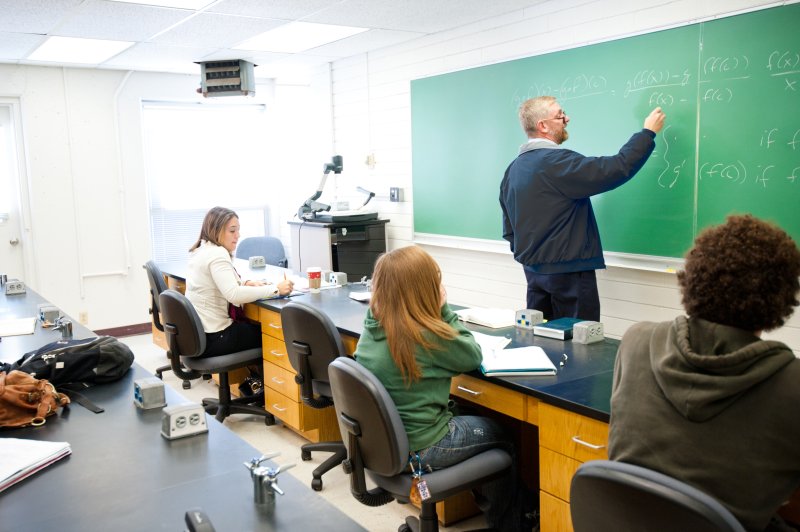
Giving homework is a standard practice in most educational facilities across all grade levels and locations. Homework is intended to further solidify concepts and practices that a student learns in class in their minds later at home. But that could all be changing.
Educators are now taking many different approaches to homework with more of an emphasis placed on the relevancy of the work to both the students’ age and learning level. Some educators are joining the anti-homework movement, and have seen positive results from giving little to no homework for students. However, with outside parties like parents and families getting more involved in the conversation around homework, it may be here to stay. The question is, should it be?
- What is the history of homework?
For contemporary parents or guardians and their students, it might seem like homework has always been around. However, homework has actually been a widely debated topic since its inception in the 19th century. Horace Mann, among others, is credited with championing the idea of homework in the United States after touring German “Volksschulen (‘People’s Schools’)” while visiting the country.
As the idea of homework came across the Atlantic to America, it was quickly met with opposition and eventually a ban was placed on homework for any children under the age of 15 until 1917. When the United States and Russia entered the Cold War era, homework became relevant again as the United States placed emphasis on improving students’ knowledge to compete with other countries for success.
Various studies arguing both sides of the homework question have been released since then. The relevance of homework is now once again in question as educators and homeschooling parents try to understand the true purpose behind it.
Is homework still relevant?
Somewhere around 50% of educators still assign homework . However, this number might be bolstered due to parent involvement. Often, educators don’t want to assign homework or want to assign less homework, saving the time their students have at home for family bonding and other activities.
But many parents are uncomfortable with a lack of homework assignments for the following reasons:
- Parents feel like their children need homework to solidify concepts learned in the classroom.
- Some parents also advocate for the time management, organization, and structure that homework can teach children.
They will often complain to the teacher, forcing the teacher to provide homework of some kind. So while half of all educators are assigning homework, the number of educators who believe it’s necessary may actually be less since some teachers feel pressured to assign homework when they otherwise wouldn’t.
The relevance of homework when it is assigned is frequently up for debate because there are many nuances that go into the process of a student completing homework. When a teacher assigns homework they need to be aware of many things including:
- Student access to a reliable internet source and computer or tablet
- Student/parent dynamics at home
- Parent/parent dynamics at home
- Student accessibility levels
- Necessity to student learning
All of these factors play a role in how well the student will respond to homework. Other factors like grade level also play a role in the quality and quantity of homework being assigned. But beyond these factors, homework also needs to be thought out before it's assigned. To some extent, the relevancy of homework is determined by how well it’s been formulated by the teacher assigning it.
How much homework is too much?
The quantity of homework will vary greatly by grade level. Teachers will often operate by the “ 10-minute rule ” which recommends that a child should be assigned 10 minutes of homework for every grade they’ve passed. So a fifth grader would have 50 minutes of assigned work.
However, homework can become overwhelming when a teacher hasn’t put the time into creating meaningful assignments that can be completed in a reasonable amount of time. Thus the feeling of “too much homework” is often conflated with poorly constructed homework. A positively constructed homework assignment will contain a few things:
- Work reviewing material that the student has already learned in class
- Work that involves professor feedback or has a clear purpose
- Work that can be finished in the time period appropriate for the age and grade level of the student
Why is homework important?
While many educators do not see much value in homework at the K–6 level, studies have shown that students in middle school or grades 7–12 do benefit from homework. Often this is because a student is learning more rigorous material and has a more fully developed brain that benefits from the reinforcement that homework provides.
Many teachers argue that homework for students is like practice for athletes: it reinforces concepts and the neural pathways a student has used during class. Beyond these benefits , homework can also teach students time management and organizational skills.
__________ Become who you are called to be Pursue your purpose at PLNU. __________
Should teachers still give homework?
Studies on the relevance of homework to actual success in the classroom are varied. One of the most comprehensive studies reinforces the idea that homework can have a positive impact if the teacher assigning it is doing so in the correct manner. In this case, the 2006 study conducted by Duke University psychology professor Harris Cooper, showed a positive correlation for students who were doing appropriate homework in higher grade levels. He stated that “a good way to think about homework is the way you think about medications or dietary supplements. If you take too little, they’ll have no effect. If you take too much, they can [hurt] you. If you take the right amount, you’ll get better.”
The study also revealed that the impact of homework went down if the student was in elementary school. Therefore, the decision for teachers to assign homework should be based on the grade level they are teaching and the general intensity level of their students. One PLNU alumna, Megan Wheeler (19), who is also a grade school teacher has found this to be a sound policy and practices it with her own students:
“As an elementary teacher, I do not assign any homework to my students because I find that many students may not have home lives that are conducive to the demands that homework requires…My eight-year-old students are already working hard on school work for six hours during the day with me, so I would much rather they spend that time together as a family or participating in extracurricular activities.”
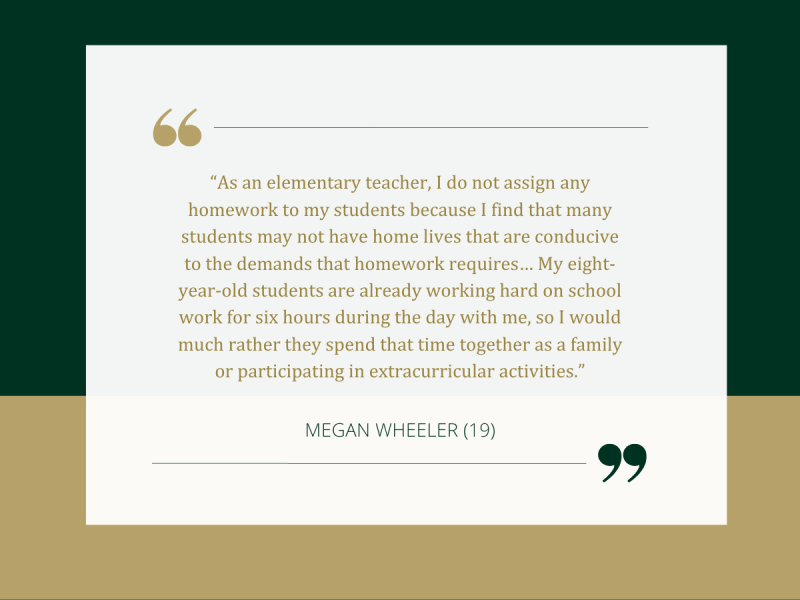
- Take the next steps to becoming an educator
Learning the ins and outs of properly constructed homework assignments can be a daunting task for rising educators, especially when the many types of student learning styles are taken into account. One of the best places to receive more instruction on how to assign the right kind of homework is in an education-specific degree program.
PLNU boasts many undergraduate and graduate-level options for all types of budding educators so you can continue your education while pursuing a worthwhile career. Find out more about these programs by visiting PLNU’s School of Education website .
Request Info
Related Articles
Careers you can pursue with a masters in higher education, 5 strategies to engage students in the digital age, what are the pros and cons of teachers giving letter grades, table of contents.
- Is homework still relevant?
- How much homework is too much?
- Why is homework important?
- Should teachers still give homework?
Request More Information
Start your journey, start your journey today.
Undergraduate Programs Graduate & Professional Programs Accelerated Undergraduate Programs

20 Reasons You Shouldn’t Assign Homework Over The Holidays
20 Reasons You Shouldn’t Assign Homework Over The Holidays by Miriam Clifford Many students agree that homework over the holidays really is a form of cruel and unusual punishment. Upon returning from winter break, you’ll probably have a handful of students saying the dog ate their homework or it got blown away in a winter…
by Miriam Clifford
Many students agree that homework over the holidays really is a form of cruel and unusual punishment.
Upon returning from winter break, you’ll probably have a handful of students saying the dog ate their homework or it got blown away in a winter storm. But you’ll probably be surprised to learn that some research suggests too much homework can be a bad thing. A 2009 article in the Los Angeles Times , suggests that some districts have cut back on the amount of homework in the effort to consider children’s social development. In fact, the San Ramon Valley district modified its homework policy and no homework is allowed over weekends and holiday vacations, except for reading.
The US National Education Association recommends no more than ten minutes (of homework) per grade level, per night.
Homework has fallen in and out of favor over the decades. California even established a law in 1901 limiting the amount of homework teachers could assign. Homework is highly in favor now a days. With recent trends of information overload, packed activity schedules, and childhood obesity, it’s no wonder educators are reconsidering their stance on homework.
1. Students are learning all the time in the 21 st century. According to a recent article in MindShift traditional homework will become obsolete in the next decade. Thanks to computers, learning is occurring 24/7. With access to software programs, worldwide connections, and learning websites such as the Khan Academy, learning occurs all the time. According to Mindshift, “the next decade is going to see the traditional temporal boundaries between home and school disappear.” Try to see if you can bridge the gap between school and home by getting students interested in doing their own research over holiday break. Rather than assigning homework, create a true interest in learning. They will often pursue learning about topics they like on their own. After all, this is the way of the 21 st century and information is everywhere.
2. More homework doesn’t necessarily equate to higher achievement . Yes, too much homework can actually be a bad thing. A 1989 Duke University study that reviewed 120 studies found a weak link between achievement and homework at the elementary level and only a moderate benefit at the middle school level. In a similar recent review of 60 studies, researchers at Duke U found homework was beneficial, but assigning excessive amounts of homework was counterproductive. The research found homework was more beneficial for older students than younger ones. The study was completed by Harris Cooper, a leading homework research and author of “The Battle over Homework: Common Ground for Administrators, Teachers, and Parents”. Cooper suggests that teachers at the younger level may assign homework for improving study skills, rather than learning, explaining why many studies concluded less benefit for younger children. Many teachers do not receive specific training on homework. Cooper suggests that homework should be uncomplicated and short, involve families, and engage student interests.
3. Countries that assign more homework don’t outperform those with less homework. Around the world, countries that assign more homework don’t see to perform any better. A Stanford study found that in counties like Japan, Denmark, and the Czech Republic little homework was assigned and students outperformed students in counties with large amounts of homework such as Greece, Thailand, and Iran. American and British students seem to have more homework than most counties, and still only score in the international average. In fact, Japan has instituted no homework policies at younger levels to allow family time and personal interests. Finland, a national leader in international tests, limits high school homework to half hour per night. Of course, there are other factors not taken into account in the study, such as length of the school day. But in itself, it is interesting to see this issue from a world perspective.
4. Instead of assigning homework, suggest they read for fun. There are great holiday stories and books you can recommend to parents and students. If you approach the activity with a holiday spirit, many students will be engaged. They may want to check out the stories on their own. You can start by reading the first chapter in class and leaving them intrigued. For instance, you can read the first chapter of The Gift of the Magi and suggest students read it over winter break. With younger students, you might promise roles in a play for students who read over break.
5. Don’t assign holiday busy work. Most academics agree that busy work does little to increase learning. It is best to not assign packets of worksheets if they do nothing to add to student learning. You also don’t want to waste valuable time grading meaningless paperwork. Some studies show that much homework may actually decline achievement. Assigning excessive amounts of homework may be detrimental. In fact, a 2006 study by Yankelovick found that reading achievement declined when students were assigned too much homework. Actually, interesting reading such as Harry Potter produced higher reading achievement.
6. Have students attend a local cultural event. You can let parents know that instead of assigning homework, you are suggesting students attend a particular event that relates to your classroom. For instance, if you are reading Shakespeare, they might attend a related play or ballet.
7. Family time is more important during the holidays . Assigning less homework makes it easier for families to have time together. Family studies at the University of Michigan, show that family time is extremely important to achievement and behavior. Studies on family meals, suggest that students who have dinner with their family have better academic scores and behavioral outcomes. Perhaps this is only a correlation, but family time is undeniably important to child development. Students spent most of their days at school while parents are at work. When all is said and done, remember what it was like being a kid. The things you remember most about the holidays aren’t the assignments you took home, but the time you spend with family and friends.
8. For students who travel during the holidays, homework may impede learning on their trip . The Holiday time is the one time of year that many families reconnect with distant family members or travel. I remember having to pack hoards of books over some holidays to Spain and it was not fun. I wanted to enjoy the time with family and experience the country fully. Traveling in itself is a learning activity. Let students experience their travels fully.
9. Kids need time to be kids. A recent article from Australia’s Happy Child website, “What is the value of Homework: Research and Reality” considers this issue and explains how children need unstructured play time. Homework can have a negative influence on early learning experiences. Suggest students use holiday time to do physical activity, such as ice-skating or sledding. Many kids don’t get enough exercise. Childhood obesity is a major problem in the United States. Suggesting students play outside or participate in a sport is a good way to get them to value physical activity. The holidays are a great time for kids to go sledding in the snow or play with friends outside. If no one has homework, classmates might exchange phone numbers to play together. You can suggest this to parents. If the teacher thinks physical activity is important, students will too.
10. Some education experts recommend an end to all homework . Etta Kralovec and John Buell, authors of The End of Homework: How Homework Disrupts Families, Overburdens Children, and Limits Learning , controversially suggests that homework may be a form of intrusion on family life, and may increase the drop-out rate in high schools. The authors blame homework for increasing the achievement gap due to socio-economic differences in after-school obligations. Consider challenging your own views of the benefits of homework and try to create a level playing field when considering assignments.
11. Send a letter to parents explaining why you are not assigning work. You might want to take the Christmas holiday as a chance to engage parents to play a learning game or do some art with their kids. If families know there is an intentional purpose to not assigning work, they may take the chance to spend more one-on-one time with their child.
12. You can make the holidays a time for an “open project” for extra credit. Students might take this time to do something related to the curriculum that they would like to explore on their own terms. Before the holidays, you might talk about topics or provide books students for students to take home. Learning for fun and interest, might produce more meaningful engagement than assigned homework.
13. Suggest they visit a museum instead. With families at home, the holiday time is a great time for students to see an exhibit that interests them or do a fun activity at a nearby museum. Sometimes encouraging these field trips may be more beneficial than assigning homework. You might want to print coupons, a schedule, or a list of upcoming exhibits so that families have the information at their fingertips.
14. Encourage students to volunteer during the holiday time. The holidays are a great time for students to give back. Students might volunteer at a local soup kitchen or pantry. Volunteer organizations are often at their busiest during the holiday time. Plus, students learn a lot from the experience of doing community service. I remember visiting a group home during the holiday time in high school and helping kids wrap Christmas gifts for their families. This is a great alternative to assigning homework, especially for Generation Y who highly values civic involvement.
15. Develop a class game. You might have the class play a learning game the week before vacation and have them take it home to show their family. My fourth grade teacher had hop-scotch math. We often drew with chalk outside to replicate her game at home. Try to think of a holiday-themed game or one that the whole family can get involved in.
16. Students might learn more from observing the real world. Learning isn’t just about paper and pencil activities. Teachers should also inspire students to seek ways to learn from real-world experiences. They might cook with their parents and practice measuring. Or tag along with a parent who is putting up holiday lights or building a shed. Ask students to observe a job around the house or ask their parents about their job over holiday break. They might be enlightened to learn more about the real world and different jobs they might pursue in the future. Perhaps some students might be able to go to work with their parents instead of a formal assignment.
17. Go on a hike. Students learn a great deal from nature. Tell students to go outside on a walk and be ready to share their experience when they get back. Did they observe natural phenomena you talked about in science class or different types of rocks you discussed in geology? Or can you tie their walk into a discussion of poetry?
18. Tell students to visit an amusement park. If you are teaching physics or math, amusement parks give ample room to explain the laws of physics and mathematical probability. This outing would allow students to think about the real world implications of science. You may want to even plan a lesson beforehand that ties this idea in. On another level, it allows students to create a lasting memory with their own families.
19. Kids need rest! Everyone needs a mental breather and the holidays are the best time for students to play and take a break from school. Kids need a full ten hours of sleep and adequate rest. The vacation time is a great time for students to take a mental breather from school. With many family outings and vacations during the holiday time, they will have less time to complete homework. They will come back to school feeling re-energized.
20. Many parents and students dislike holiday homework. You want parents to buy-in to your classroom community and support your endeavors with students. Assigning holiday homework is usually unpopular with parents because it may the one time of year they have to give children their undivided attention. Instead, you might want to take a survey to see if parents agree with the idea. You can then send a letter with the survey results. Taking parents’ perspectives into account shows you value their opinions and feedback. Students prefer some free time too. Not surprisingly one student created a Facebook page, titled, “Why do teachers give us homework over the holiday.” If the students know you are giving them a break over the holidays they may work harder for you when they get back.
If you’re still not convinced, check out this fact sheet based on The Case Against Homework: How Homework Is Hurting Our Children and What We Can Do About It by Sara Bennett and Nancy Kalish. If you are still going to assign some holiday homework, at least keep in mind some guidelines.
The US National Education Association recommends no more than ten minutes per grade level, per night. If you must assign homework make sure it is meaningful and doesn’t take away from time with families. And most of all, remember what it was like being a kid during the holiday time. Homework is generally not a part of those memories, nor should it be. Those days playing outside and spending time with family are lifelong memories just as important as school.
Childhood is over in the blink of an eye.
This is a cross-post from opencolleges.edu.au
TeachThought is an organization dedicated to innovation in education through the growth of outstanding teachers.
DECA competes at nationals in California
Hays High FFA hosts chapter banquet
Indian track teams participate in final meet of regular season
Boys golf closes regular season at Garden City, Great Bend, Liberal
The Guidon Online
Teachers shouldn’t give homework to students.
McKena McBride , Staff Reporter | October 30, 2018

Google Images
While some may believe that giving students homework is helpful to their education, it is damaging to their mental health.
Finland is the country with the top student scores in the world. Their students are given no homework.
Finnish students go to school between 9:00-9:45 a.m., and go home by 2:00-2:45 p.m.. They also have more one on one time with their teachers, have fewer classes a day, and have longer breaks.
No homework is obviously not the only factor to Finnish students’ excellent test scores, but no homework certainly helps.
Many adults will say that homework helps students build character, promote self-discipline, and teaches good work habits, but there is no evidence to this.
Homework is frustrating and exhausting, can cause family conflict, takes away students’ time for other activities, and can reduce a student’s interest in learning.
A Stanford study showed that 56% of students said homework was a main source of their stress, and their amount of homework had caused sleep deprivation and other health problems. The survey data and student responses also indicated that students spending a lot of time on homework were “more likely to drop activities, not see friends or family, and pursue hobbies they enjoy.”
Students that understand the material given in their classes have no need to take homework home, and students that don’t understand the material are not going to learn by doing the work alone at home.
In order to produce an educated and well-rounded workforce, the U.S. education system needs to be revamped and homework discontinued.

McKena McBride is a senior, and this is her third year in newspaper. She is involved in tennis, StuCo, National Honor Society, Leadership, Yearbook, Red...

Hate speech not protected by First Amendment

Freewill is an illusion

Edge superior to other browsers

Even after ‘Reelin’ in the Years,’ Steely Dan’s debut album still holds as one of the best albums of all time
World that ‘twilight’ created is safe space for fans.
There has been much talk lately about a movie that came out in 2008, called “Twilight,” which became one of the most popular movies of its time an...
Staff member reviews ‘Shirley’ movie
Directed by John Ridley, “Shirley” was released on Netflix on March 15, 2024. The movie focuses on the true story of Shirley Chisholm, who is...
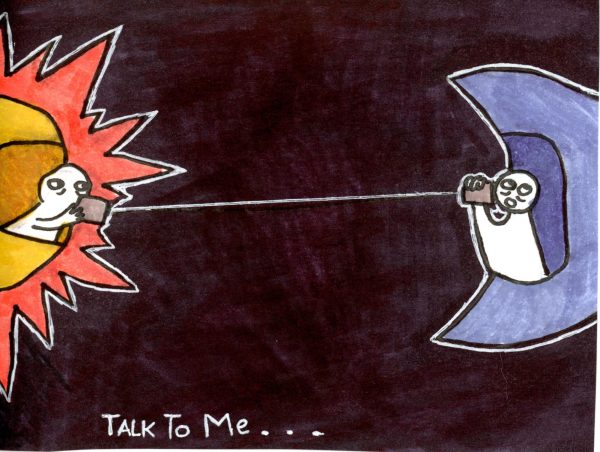
Staff member reviews Snow Cone Express
Serving sweet, frozen treats during the warmer months, Snow Cone Express has been delivering flavored shaved ice to Hays for over a decade. Sizes...
Comments (0)
Cancel reply
Your email address will not be published. Required fields are marked *

Best Of Newstalk
00:00-06:00
'Let kids be kids' - Is it time to ban homework in primary schools?
10.29 19 Sep 2024
Share this article

It is time to “let kids be kids” and ban homework in primary school so they can spend more time with their families and playing outdoors, according to Shane Coleman.
A new study from Maynooth University has found that giving homework more frequently but in “shorter bursts” is the most effective way to help children learn – particularly when it comes to maths and science.
It found that homework assignments of just 15 minutes were just as effective as longer assignments – and increasing the workload to 30 minutes or longer showed no added benefits.
It also noted that the benefits were the same across different socioeconomic backgrounds, potentially addressing fears that homework is generally more beneficial to children from wealthier homes.

On Newstalk Breakfast this morning, Shane said there may be benefits to homework in secondary school – but it is time to give children a break by banning it at primary level.
“The best-performing country in the world in maths and science is Finland and they don't do homework in primary school,” he said.
“They believe kids should be kids and they believe things like having dinner with your family, getting exercise and having a good night's sleep are all more important than doing homework.
“The OECD research suggests the countries that have the least amount of homework have the best-performing students.”
He said homework is “exhausting” for children after a full day of school.
“I think let kids be kids; let them go out and play and when they get to secondary, they have enough time for study and all that kind of stuff,” he said.

Fellow presenter Ciara Kelly said many parents want to see homework abolished because they are too involved with it themselves.
“This is a debate that is probably happening over kitchen tables right now, people tuning in this morning because the kids are back at school and the homework is coming home and parents feel an absolute obligation to get stuck in and help them and it is a flashpoint in a lot of families,” she said.
“It's a very big sort of stress ball for people and as a consequence, we increasingly hear calls to get rid of it.
“I think two things.
“It's very simple; I think homework is good for kids. I think practicing things like maths cements them in your brains.
“I think sometimes you have to step out of the classroom and do stuff on your own to really understand it, to really get a feel for it – I think that's good.
“I also happen to think that parents now who are under so much pressure because they are working are then coming home in the evening and they're tired and they're doing it at the wrong time of the day, really, because it's nighttime practically trying to do the homework with the kids.
“It was never meant to be thus. When I was a kid and my mum was a stay-at-home mum, she never did the homework with me.
“You struggle through it whatever way you went and the teacher corrected it and you learn better the next day.”

She said homework is good for children when done right.
“I think setting kids tasks is good, I think giving kids a bit of responsibility and a chore to do is good and I think it's good for them educationally,” she said.
“But I also think, parents, step back. You're making a stick for your own back and that's one of the reasons that we want to get rid of it, because parents don't like it.
“Just let them at it but don't take it away from them because you don't like it. It's good for them.”
Shane said parents nowadays are simply “much more involved now with their kids” suggesting that as long as homework is assigned, they will end up helping them with it.
Read more about
Most Popular

'Not fair for my family' - Sophie Toscan du Plantier's son responds to Tánaiste's remarks

Banning smoking outside 'makes great sense' - oncologist

19 arrested at anti-immigration protest in Dublin

'Go to your dentist' - GAA star David Hickey on surviving oral cancer

Green Party 'only getting started' on delivering cycling infrastructure across Ireland

'Like waking up in the 1980s' - Tusla telling foster parents to lose weight 'very disappointing'

Breastfeeding rates in Ireland low due to lack of 'generational support'

IMAGES
VIDEO
COMMENTS
Teachers should reconsider giving homework for several compelling reasons: Mental Health Impact: Homework can contribute to stress, anxiety, and even depression in students. Excessive workload and pressure to complete assignments within tight deadlines can take a toll on students' mental well-being. Family Time: Homework often cuts into ...
The authors believe this meritocratic narrative is a myth and that homework — math homework in particular — further entrenches the myth in the minds of teachers and their students.
American high school students, in fact, do more homework each week than their peers in the average country in the OECD, a 2014 report found. It's time for an uprising. Already, small rebellions ...
"And that trickles down to less support at home, homework not being done, stuff not being returned and signed. It should be almost 50-50 between home and school.
Homework does not help younger students, and may not help high school students. We've known for a while that homework does not help elementary students. A 2006 study found that "homework had no association with achievement gains" when measured by standardized tests results or grades. [7]
If they give homework, most teachers of young children make assignments very short—often following an informal rule of 10 minutes per grade level. "No homework" does not guarantee that all students will spend their free time in productive and imaginative play. Some researchers and critics have consistently misinterpreted research findings.
According to Alfie Kohn, author of " The Homework Myth," there's never a good excuse for making kids work a second shift of academics in elementary and middle school. "In high school, it ...
Pope and her colleagues found that too much homework can diminish its effectiveness and even be counterproductive. They cite prior research indicating that homework benefits plateau at about two hours per night, and that 90 minutes to two and a half hours is optimal for high school. • Greater stress: 56 percent of the students considered ...
The Case for Homework. Posted September 29, 2016. By Matt Weber. This fall, the start of the new school year seemingly brought with it a trend of teachers forgoing homework assignments in order to allow their students more time outside of school for family and play. A number of these announcements took off on social media, with many parents ...
In 2003, a pair of national studies found that most American students spent less than an hour daily on homework, and the workload was no bigger than it was 50 years prior. "There is this view in ...
As researcher and author Gary Natrillo, an initial proponent of creative homework, stated later: …not only was homework being assigned as suggested by all the 'experts,' but the teacher was obviously taking the homework seriously, making it challenging instead of routine and checking it each day and giving feedback.
"No homework should be part of the teacher motto—work smarter, not harder. Teachers spend too much time grading homework. ... "The additional stress of homework for the teacher, students, and families is not worth it. Give families time to spend together, and free up teacher time by not having to hunt down missing work and reviewing what ...
These days, nightly homework is a given in American schools, writes Kohn. "Homework isn't limited to those occasions when it seems appropriate and important. Most teachers and administrators aren't saying, 'It may be useful to do this particular project at home,'" he writes. "Rather, the point of departure seems to be, 'We've decided ahead of ...
Homework has its pros and cons, especially for college students. It can enhance critical thinking, time management, and learning, but it also brings stress, impacts mental health, and can become overwhelming. Finding the right balance is key. Focus on quality assignments, maintain flexibility, and make sure your homework complements rather than ...
The National PTA and the National Education Association support the " 10-minute homework guideline "—a nightly 10 minutes of homework per grade level. But many teachers and parents are quick to point out that what matters is the quality of the homework assigned and how well it meets students' needs, not the amount of time spent on it.
And homework has a greater positive effect on students in secondary school (grades 7-12) than those in elementary. "Every child should be doing homework, but the amount and type that they're doing ...
If they give homework, most teachers of young children make assignments very short—often following an informal rule of 10 minutes per grade level. "No homework" does not guarantee that all ...
Homework should not be simply assigned as a routine practice, she said. "Rather, any homework assigned should have a purpose and benefit, and it should be designed to cultivate learning and ...
Examining these arguments offers important perspectives on the wider educational and developmental consequences of homework practices. 1. Elevated Stress and Health Consequences. According to Gitnux, U.S. high school students who have over 20 hours of homework per week are 27% more likely to encounter health issues.
According to Duke professor Harris Cooper, it's important that students have homework. His meta-analysis of homework studies showed a correlation between completing homework and academic success, at least in older grades. He recommends following a "10 minute rule": students should receive 10 minutes of homework per day in first grade, and 10 ...
The quantity of homework will vary greatly by grade level. Teachers will often operate by the " 10-minute rule " which recommends that a child should be assigned 10 minutes of homework for every grade they've passed. So a fifth grader would have 50 minutes of assigned work.
Many teachers do not receive specific training on homework. Cooper suggests that homework should be uncomplicated and short, involve families, and engage student interests. 3. Countries that assign more homework don't outperform those with less homework. Around the world, countries that assign more homework don't see to perform any better.
Their students are given no homework. Finnish students go to school between 9:00-9:45 a.m., and go home by 2:00-2:45 p.m.. They also have more one on one time with their teachers, have fewer classes a day, and have longer breaks. No homework is obviously not the only factor to Finnish students' excellent test scores, but no homework certainly ...
It is time to "let kids be kids" and ban homework in primary school so they can spend more time with their families and playing outdoors, according to Shane Coleman. A new study from Maynooth ...